Kaldheim Release Notes
Compiled by Matt Tabak, with contributions from Laurie Cheers, Tom Fowler, Carsten Haese, Nathan Long, and Thijs van Ommen.
Document last modified January 13, 2021.
DOC Download Links:
English | 中國話,漢語;中文 | 中国话,汉语;中文 | Français | Deutsch
Italiano | 日本語 | 한글 | Português | русский язык | Español
The Release Notes include information concerning the release of a new Magic: The Gathering set, as well as a collection of clarifications and rulings involving that set's cards. It's intended to make playing with the new cards more fun by clearing up the common misconceptions and confusion inevitably caused by new mechanics and interactions. As future sets are released, updates to the Magic rules may cause some of this information to become outdated. Go to magic.wizards.com/rules to find the most up-to-date rules.
The "General Notes" section includes release information and explains the mechanics and concepts in the set.
The "Card-Specific Notes" sections contain answers to the most important, most common, and most confusing questions players might ask about cards in the set. Items in the "Card-Specific Notes" sections include full card text for your reference. Not all cards in the set are listed.
GENERAL NOTES
Release Information
The Kaldheim set becomes legal for sanctioned Constructed play on its official release date, Friday, February 5, 2021. At that time, the following card sets will be permitted in the Standard format: Throne of Eldraine, Theros Beyond Death, Ikoria: Lair of Behemoths, Core Set 2021, Zendikar Rising, and Kaldheim.
Cards found in Kaldheim Draft Boosters and Theme Boosters will be included in the Standard format. These cards are numbered 1–285 and have printed set code KHM. There are twenty additional Kaldheim cards found in Set Boosters and Theme Boosters that are also legal in the Standard format. These cards are numbered 374–393 and also have printed set code KHM.
There are sixteen new cards printed in the Kaldheim Commander Decks. These cards are legal for play in the Commander, Vintage, and Legacy formats. They aren't legal for play in the Standard, Pioneer, or Modern formats. These cards are numbered 1–16 and have printed set code KHC. The other cards in these decks are legal for play in any format that already allows those cards; that is, appearing in these decks doesn't change a card's legality in any format. Those returning cards are numbered 17–119 and have printed set code KHC.
Go to magic.wizards.com/formats for a complete list of formats and their permitted card sets and banned lists.
Go to magic.wizards.com/commander for more information on the Commander variant.
Go to locator.wizards.com to find an event or store near you.
New Keyword: Foretell
Great things are in store for you with the new mechanic foretell—we just know it. Foretell is a keyword ability that allows you to set cards aside for future use.
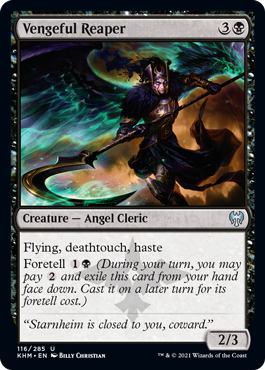
Vengeful Reaper
{3}{B}
Creature — Angel Cleric
2/3
Flying, deathtouch, haste
Foretell {1}{B} (During your turn, you may pay {2} and exile this card from your hand face down. Cast it on a later turn for its foretell cost.)
The rules for foretell are as follows:
702.141. Foretell
702.141a Foretell is a keyword that functions while the card with foretell is in a player's hand. Any time a player has priority during their turn, that player may pay {2} and exile a card with foretell from their hand face down. If the player does, that player may look at that card and they may cast it after the current turn has ended by paying any foretell cost it has rather than paying that spell's mana cost. Casting a spell this way follows the rules for paying alternative costs in rules 601.2b and 601.2f–h.
702.141b Exiling a card using its foretell ability is a special action, which doesn't use the stack. See rule 116, "Special Actions."
702.141c If an effect refers to foretelling a card, it means performing the special action associated with a foretell ability. If an effect refers to a card or spell that was foretold, it means a card put in the exile zone as a result of the special action associated with a foretell ability, or a spell that was a foretold card before it was cast, even if it was cast for a cost other than a foretell cost.
702.141d If an effect states that a card in exile becomes foretold, that card becomes a foretold card. That effect may give the card a foretell cost. That card may be cast after the current turn has ended for any foretell cost it has, even if the resulting spell doesn't have foretell.
702.141e If a player owns multiple foretold cards in exile, they must ensure that those cards can be easily differentiated from each other and from any other face-down cards in exile which that player owns. This includes knowing both the order in which those cards were put into exile and any foretell costs other than their printed foretell costs those cards may have.
702.141f If a player leaves the game, all face-down cards foretold cards that player owns must be revealed to all players. At the end of each game, all face-down foretold cards must be revealed to all players.
- Because exiling a card with foretell from your hand is a special action, you can do so any time you have priority during your turn, including in response to spells and abilities. Once you announce you're taking the action, no other player can respond by trying to remove the card from your hand.
- Casting a foretold card from exile follows the timing rules for that card. If you foretell an instant card, you can cast it as soon as the next player's turn. In most cases, if you foretell a card that isn't an instant (or doesn't have flash), you'll have to wait until your next turn to cast it.
- If you're casting a foretold card from exile for its foretell cost, you can't choose to cast it for any other alternative costs. You can, however, pay additional costs, such as kicker costs. If the card has any mandatory additional costs, those must be paid to cast the spell.
New Keyword: Boast
What's the point of heroic, nigh-impossible deeds if you can't brag about them afterward? Boast abilities are activated abilities that you can activate once each turn, but only if the creature that has the ability attacked that turn.
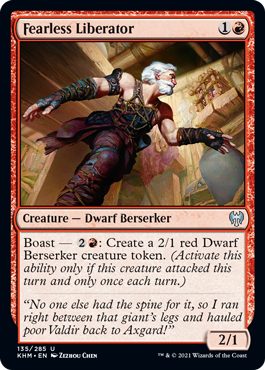
Fearless Liberator
{1}{R}
Creature — Dwarf Berserker
Boast — {2}{R}: Create a 2/1 red Dwarf Berserker creature token. (Activate this ability only if this creature attacked this turn and only once each turn.)
- A boast ability can be activated at any point after the creature with that ability has been declared as an attacker. This can be before blockers are declared, after blockers are declared but before combat damage is dealt, during combat after combat damage is dealt, during the postcombat main phase, during the end step, or, in some unusual cases, during the cleanup step.
- If it's not your turn and you gain control of a creature with a boast ability after that creature attacked, you can activate that creature's boast ability if it hasn't been activated yet that turn.
- If a creature with a boast ability is put onto the battlefield attacking, it was never declared as an attacker. Its boast ability can't be activated that turn.
- If an effect adds additional combat phases to a turn and a creature with a boast ability attacks more than once during that turn, its boast ability can still be activated only once.
New Enchantment Subtype: Rune
Runes are sacred symbols that enhance the battle prowess of anything—or anyone—they are applied to. Rune is a new enchantment subtype found on a cycle of Aura enchantments that can make creatures or Equipment better. The Rune subtype doesn't have any special rules meaning, but other spells and abilities can refer to it.
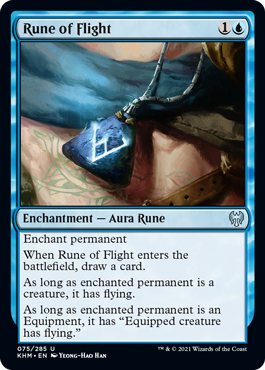
Rune of Flight
{1}{U}
Enchantment — Aura Rune
Enchant permanent
When Rune of Flight enters the battlefield, draw a card.
As long as enchanted permanent is a creature, it has flying.
As long as enchanted permanent is an Equipment, it has "Equipped creature has flying."
- Runes can target and be attached to any permanent, even one that isn't currently a creature or an Equipment. You can cast a Rune choosing a Vehicle as the target, for example. The Rune's enters-the-battlefield ability will trigger, and you'll draw a card. The Rune won't do anything while the Vehicle isn't a creature, but if it becomes one later, the appropriate ability will start applying.
- If the target of an Aura spell is an illegal target as that spell tries to resolve, it won't resolve, it won't enter the battlefield, and none of its enters-the-battlefield triggered abilities will trigger.
Returning Mechanic: Modal Double-Faced Cards
Modal double-faced cards were introduced in the Zendikar Rising set, and they return in Kaldheim with a few new surprises in store. Modal double-faced cards give you great flexibility, letting you play either face depending on the situation. In Zendikar Rising, the back faces of the modal double-faced cards were all land faces. In the Kaldheim set, some modal double-faced cards have two nonland faces.
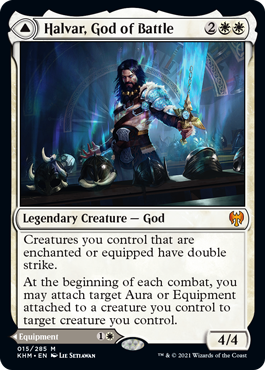
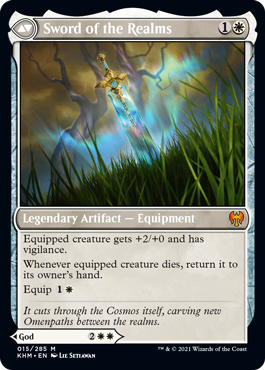
Halvar, God of Battle
{2}{W}{W}
Legendary Creature — God
4/4
Creatures you control that are enchanted or equipped have double strike.
At the beginning of each combat, you may attach target Aura or Equipment attached to a creature you control to target creature you control.
/////
Sword of the Realms
{1}{W}
Legendary Artifact — Equipment
Equipped creature gets +2/+0 and has vigilance.
Whenever equipped creature dies, return it to its owner's hand.
Equip {1}{W}
Playing with Modal Double-Faced Cards
- To determine whether it is legal to play a modal double-faced card, consider only the characteristics of the face you're playing and ignore the other face's characteristics. For example, if an effect stops you from casting creature spells, you can't cast Halvar, God of Battle, but you can still cast Sword of the Realms.
- If an effect allows you to play a specific modal double-faced card, you may cast it as a spell or play it as a land, as determined by which face you choose to play. If an effect allows you to cast (rather than "play") a specific modal double-faced card, you can't play it as a land.
- If an effect allows you to play a land or cast a spell from among a group of cards, you may play or cast a modal double-faced card with any face that fits the criteria of that effect. For example, if an effect allows you to cast artifact spells from your graveyard, you can cast Sword of the Realms but not Halvar, God of Battle. (Don't worry Halvar. We'll get you onto the battlefield eventually.)
- If an effect allows you to put a card with particular characteristics onto the battlefield without instructing you to play or cast it, you consider only the characteristics of a modal double-faced card's front face to see if that card qualifies. If it does, it enters the battlefield with its front face up. For example, if an effect allows you to put a creature card from your graveyard onto the battlefield, you can put Halvar, God of Battle onto the battlefield. (See?) An effect that allows you to put an artifact card from your graveyard onto the battlefield wouldn't affect Sword of the Realms, however: a modal double-faced card has only its front side's characteristics while in the graveyard.
- The converted mana cost of a modal double-faced card is based on the characteristics of the face that's being considered. On the stack or the battlefield, consider whichever face is up. In all other zones, consider only the front face. This is different than how the converted mana cost of a transforming double-faced card is determined.
- A modal double-faced card can't be transformed or be put onto the battlefield transformed. Ignore any instruction to transform a modal double-faced card or to put one onto the battlefield transformed.
General Information on Double-Faced Cards
- Each face of a double-faced card has its own set of characteristics: name, types, subtypes, abilities, and so on. While a double-faced card is on the stack or battlefield, consider only the characteristics of the face that's currently up. The other set of characteristics is ignored.
- While a double-faced card isn't on the stack or battlefield, consider only the characteristics of its front face. For example, the above card has only the characteristics of Halvar, God of Battle in the graveyard, even if it was Sword of the Realms on the battlefield before it was put into the graveyard.
- If an effect puts a double-faced card onto the battlefield, and its front face can't be put onto the battlefield, it doesn't enter the battlefield. For example, if an effect exiles a modal double-faced card whose front face is an instant and returns it to the battlefield, it remains in exile because an instant can't be put onto the battlefield. (Kaldheim doesn't have any modal double-faced cards whose front faces are instants or sorceries.)
- If an effect instructs a player to choose a card name, the name of either face may be chosen. If that effect or a linked ability refers to a spell with the chosen name being cast and/or a land with the chosen name being played, it considers only the chosen name, not the other face's name.
- In the Commander variant, a double-faced card's color identity is determined by the mana costs and mana symbols in the rules text of both faces combined. If either face has a color indicator or basic land type, those are also considered.
- One or both faces of a double-faced card may include a reminder about what's on the other face. This reminder text has no effect on gameplay.
- Each double-faced card has an icon in the top-left corner of each face. For modal double-faced cards in this set, these icons are a single triangle for the front face, and a double triangle for the back face. These icons have no effect on gameplay.
Using Substitute Cards
- It's important that the cards in your deck be indistinguishable from one another. To help you accomplish this with double-faced cards, you can use the substitute cards found in some Kaldheim booster packs. A substitute card can stand in for a double-faced card in hidden zones or wherever its identity is concealed (such as in exile if it's exiled face down). Using substitute cards is optional, but in tournaments, players with double-faced cards must use either substitute cards or opaque card sleeves (or both).
- You must have the actual double-faced card the substitute card is representing with you. The double-faced card should be kept apart from the rest of the deck and your sideboard.
- A substitute card can be included in a deck only when it's being used to represent a double-faced card.
- You must write clearly on the substitute card to show which double-faced card it represents. The name of at least one face must be written on the substitute card, and any other information visible on either face of the card may also be written. Information that isn't available on the card may not be written on a substitute card.
- During the game, a substitute card is considered to be the double-faced card it represents.
- If a substitute card enters a public zone (the battlefield, the graveyard, the stack, or exile unless it's exiled face down), use the actual double-faced card and set the substitute card aside. If the double-faced card is put into a hidden zone (your hand or library), use the substitute card again.
- If a double-faced card is exiled face down or put onto the battlefield face down, keep its identity hidden by using the face-down substitute card or opaque card sleeves (or both).
- In some older sets, the substitute cards were checklists that listed double-faced cards or meld cards from those sets. A Kaldheim substitute card can be used to represent those double-faced cards. The same rules about what information may be written on substitute cards apply.
Returning Enchantment Type: Saga
There are ten realms worth of stories on Kaldheim, and the telling of these tales is nearly as fantastic as the events that inspired them. Twenty such epics show up in the main set as Saga cards.
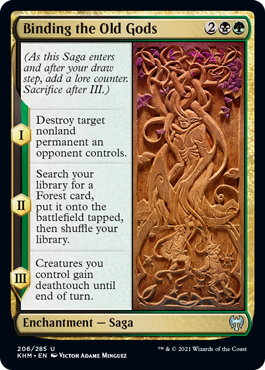
Binding the Old Gods
{2}{B}{G}
Enchantment — Saga
(As this Saga enters and after your draw step, add a lore counter. Sacrifice after III.)
I — Destroy target nonland permanent an opponent controls.
II — Search your library for a Forest card, put it onto the battlefield tapped, then shuffle your library.
III — Creatures you control gain deathtouch until end of turn.
The rules for Sagas haven't changed since their last appearance.
- As a Saga enters the battlefield, its controller puts a lore counter on it. As your precombat main phase begins (immediately after your draw step), you put another lore counter on each Saga you control. Putting a lore counter on a Saga in either of these ways doesn't use the stack.
- Each symbol on the left of a Saga's text box represents a chapter ability. A chapter ability is a triggered ability that triggers when a lore counter that is put on the Saga causes the number of lore counters on the Saga to become equal to or greater than the ability's chapter number. Chapter abilities are put onto the stack and may be responded to.
- A chapter ability doesn't trigger if a lore counter is put on a Saga that already had a number of lore counters greater than or equal to that chapter's number. For example, the third lore counter put on a Saga causes the chapter III ability to trigger, but chapters I and II won't trigger again.
- Once a chapter ability has triggered, the ability on the stack won't be affected if the Saga gains or loses counters, or if it leaves the battlefield.
- If multiple chapter abilities trigger at the same time, their controller puts them on the stack in any order. If any of them require targets, those targets are chosen as you put the abilities on the stack, before any of those abilities resolve.
- Removing lore counters won't cause a previous chapter ability to trigger. If lore counters are removed from a Saga, the appropriate chapter abilities will trigger again when the Saga receives more lore counters.
- Once the number of lore counters on a Saga is greater than or equal to the greatest number among its chapter abilities, the Saga's controller sacrifices it as soon as its chapter ability has left the stack, most likely by resolving or being countered. This state-based action doesn't use the stack.
Returning Supertype: Snow
Kaldheim features realms crashing into one another, battle on a scale few have considered, and a rich history of strife in general. It can also be a little chilly. Bring a nice sweater. Snow is a returning supertype found on several card types, including permanent types, instants, and sorceries.
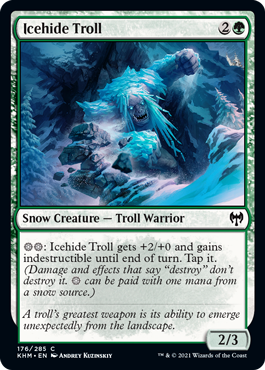
Icehide Troll
{2}{G}
Snow Creature — Troll Warrior
2/3
{S}{S}: Icehide Troll gets +2/+0 and gains indestructible until end of turn. Tap it. (Damage and effects that say "destroy" don't destroy it. {S} can be paid with one mana from a snow source.)
- Snow is a supertype, not a card type. It has no rules meaning or function by itself, but spells and abilities may refer to it.
- The {S} symbol is a generic mana symbol. It represents a cost that can be paid by one mana that was produced by a snow source. That mana can be any color or colorless. For example, you could tap two Snow-Covered Mountains and use that red mana to activate Icehide Troll's last ability.
- Snow isn't a type of mana. If an effect says you may spend mana as though it were any type, you can't pay for {S} using mana that wasn't produced by a snow source.
- Some cards have additional effects for each {S} spent to cast them. You can cast these spells even if you don't spend any snow mana to cast them; their additional effects simply won't do anything.
- The Kaldheim set doesn't have any cards with mana costs that include {S}, but some previous sets do. If an effect says such a spell costs {1} less to cast, that reduction doesn't apply to any {S} costs. This is also true for activated abilities that include {S} in their activation costs and effects that reduce those costs.
- Basic snow lands are legal in formats that the Kaldheim set is legal in. They will be legal in Standard for as long as other Kaldheim cards are, and unless they are reprinted in a future Standard-legal set, they will rotate out of Standard along with Kaldheim. You may include any number of them in a Constructed deck for a format in which basic snow lands are legal.
- In a Limited event (usually Booster Draft or Sealed Deck), you can't add basic snow lands to your card pool as you would other basic lands. You can play with basic snow lands only if you open them in your sealed deck or draft them.
Returning Keyword: Changeling
The masked shapeshifters that reside in the realm of Littjara are mysterious and inscrutable. They can assume any form and walk, slither, fly, shamble, or float unnoticed wherever they wish to go. Changeling is a returning keyword ability that gives creatures that have it all creature types.
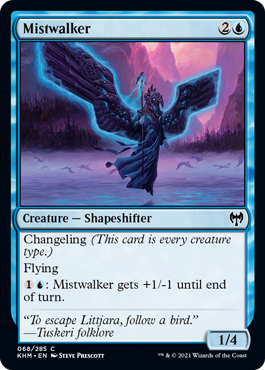
Mistwalker
{2}{U}
Creature — Shapeshifter
1/4
Changeling (this card is every creature type.)
Flying
{1}{U}: Mistwalker gets +1/-1 until end of turn.
The rules for changeling haven't changed since its last appearance.
- Changeling is a characteristic-defining ability. It functions in all zones, not only while a card that has it is on the battlefield.
- The subtype Shapeshifter that appears on the type line is mostly there to reinforce the flavor. A creature card with changeling is just as much an Elf, a Dwarf, a Sliver, a Goat, a Coward, and a Zombie as it is a Shapeshifter.
- If an effect causes a creature with changeling to become a new creature type, it will be only that new creature type. It will still have changeling; the effect making it all creature types will simply be overwritten.
- If an effect causes a creature with changeling to lose all abilities, it will remain all creature types, even though it will no longer have changeling. This is because changeling applies before the effect that removes it. (Trust us, it's better this way. Lots of other weirdness if this were different.)
Theme: Second Spell
Several cards in this set have triggered abilities that trigger whenever you cast your second spell in a turn.
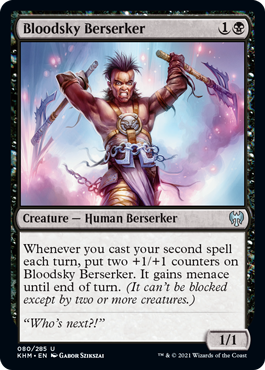
Bloodsky Berserker
{1}{B}
Creature — Human Berserker
1/1
Whenever you cast your second spell each turn, put two +1/+1 counters on Bloodsky Berserker. It gains menace until end of turn. (It can't be blocked except by two or more creatures.)
- The triggered ability can trigger only once each turn. The ability will resolve before the second spell does. It doesn't matter if the first spell you cast that turn has resolved, was countered, or is still on the stack.
- The triggered ability triggers only if the creature that has it is on the battlefield as you cast your second spell. Spells you cast in a turn before that creature entered the battlefield will count. In other words, the ability won't trigger if the creature with the ability is the second spell you cast during a turn or if you have already cast two or more spells by the time that creature enters the battlefield that turn.
KALDHEIM MAIN SET CARD-SPECIFIC NOTES
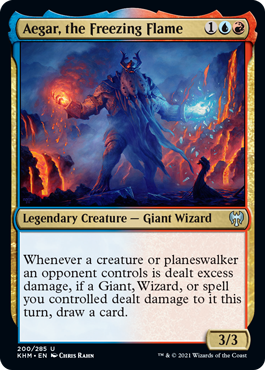
Aegar, the Freezing Flame
{1}{U}{R}
Legendary Creature — Giant Wizard
3/3
Whenever a creature or planeswalker an opponent controls is dealt excess damage, if a Giant, Wizard, or spell you controlled dealt damage to it this turn, draw a card.
- A creature has been dealt excess damage if one or more sources deal more damage to it than the minimum amount of damage required to be lethal damage. In most cases, this means damage greater than its toughness, but consider the damage already dealt to it that turn.
- A planeswalker is dealt excess damage if it's dealt damage greater than its current loyalty.
- Even 1 damage dealt to a creature from a source with deathtouch is considered lethal damage, so any amount greater than that will cause excess damage to be dealt, even if the total amount of damage isn't greater than the creature's toughness. Note that a source of damage having deathtouch has no effect on damage dealt to planeswalkers.
- It doesn't matter whether a Giant, Wizard, or spell you control deals the excess damage, only that excess damage was dealt and that one of those three things dealt damage to the creature or planeswalker at some point during the turn. For example, if a 4/4 creature an opponent controls is dealt 2 damage by a spell you control and later that turn is dealt 3 damage by a spell another player controls, Aegar's ability will trigger.
- If a permanent is both a creature and a planeswalker, the minimum amount of damage to be considered lethal damage is used to determine if excess damage has been dealt. For example, if a 5/5 creature that's also a planeswalker with three loyalty counters on it is dealt 4 damage, it's been dealt 1 excess damage and Aegar's ability may trigger.
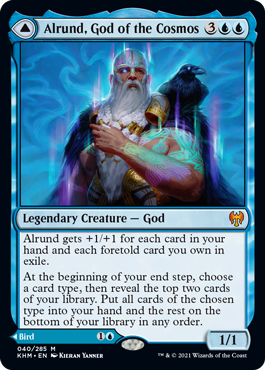
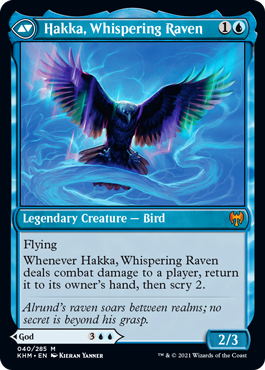
Alrund, God of the Cosmos
{3}{U}{U}
Legendary Creature — God
1/1
Alrund gets +1/+1 for each card in your hand and each foretold card you own in exile.
At the beginning of your end step, choose a card type, then reveal the top two cards of your library. Put all cards of the chosen type revealed this way into your hand and the rest on the bottom of your library in any order.
/////
Hakka, Whispering Raven
{1}{U}
Legendary Creature — Bird
2/3
Flying
Whenever Hakka, Whispering Raven deals combat damage to a player, return it to its owner's hand, then scry 2.
- The words "revealed this way" were inadvertently omitted from the printed card. Alrund's current Oracle text appears above.
- Alrund's first ability applies only while Alrund is on the battlefield. In every other zone, Alrund is 1/1.
- You may choose any card type, but the ones that may appear in your library are artifact, creature, enchantment, instant, land, planeswalker, sorcery, and tribal (a card type found on some older cards). Supertypes such as snow and basic may not be chosen. Subtypes such as God, Aura, and Forest also may not be chosen.
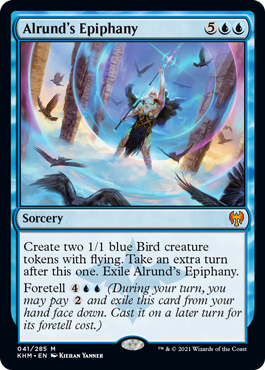
Alrund's Epiphany
{5}{U}{U}
Sorcery
Create two 1/1 blue Bird creature tokens with flying. Take an extra turn after this one. Exile Alrund's Epiphany.
Foretell {4}{U}{U} (During your turn, you may pay {2} and exile this card from your hand face down. Cast it on a later turn for its foretell cost.)
- Exiling Alrund's Epiphany as it resolves is part of its effect. If Alrund's Epiphany doesn't resolve, it will be put into its owner's graveyard. If it's exiled this way, it's exiled face up and doesn't become foretold.
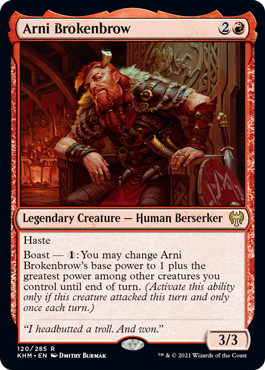
Arni Brokenbrow
{2}{R}
Legendary Creature — Human Berserker
3/3
Haste
Boast — {1}: You may change Arni Brokenbrow's base power to 1 plus the greatest power among other creatures you control until end of turn. (Activate this ability only if this creature attacked this turn and only once each turn.)
- The greatest power among other creatures you control is determined as the boast ability resolves. You choose at that time whether you'd like to change Arni Brokenbrow's base power. If you control no other creatures at that time, you can change Arni's base power to 1 until end of turn. Arni objects to this course of action.
- Any effects that modify Arni Brokenbrow's power without setting it to a specific value will apply after Arni's base power is set, regardless of the order in which those effects were created. The same is true of counters that modify Arni's power.
- Arni Brokenbrow's new base power is set to the 1 plus the actual power of the other creature you control with the highest power, not that creature's base power. If that creature's power changes after the boast ability has resolved, Arni's power is unaffected.
- In some unfortunate cases, the greatest power among other creatures you control may be negative. For example, if that greatest power is -3, you could change Arni's base power to -2 until end of turn. Arni strenuously objects to this course of action.
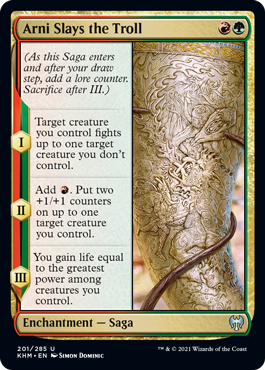
Arni Slays the Troll
{R}{G}
Enchantment — Saga
(As this Saga enters and after your draw step, add a lore counter. Sacrifice after III.)
I — Target creature you control fights up to one target creature you don't control.
II — Add {R}. Put two +1/+1 counters on up to one target creature you control.
III — You gain life equal to the greatest power among creatures you control.
- For the chapter I ability, if either target is an illegal target as that ability resolves, neither creature will deal or be dealt damage.
- The chapter II ability isn't a mana ability. It uses the stack and can be responded to.
- If you choose no targets for the chapter II ability, you'll simply add {R} as the ability resolves. However, if you do choose a target creature you control, and that creature is an illegal target as the ability resolves, the ability won't resolve. You won't add {R} in that case.
- For the chapter III ability, use the greatest power among creatures you control as the ability resolves to determine how much life you will gain. If you control no creatures at that time, or if all creatures you control have power 0 or less, you won't gain any life.
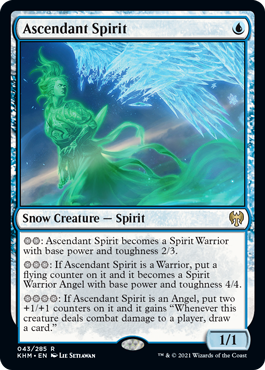
Ascendant Spirit
{U}
Snow Creature — Spirit
1/1
{S}{S}: Ascendant Spirit becomes a Spirit Warrior with base power and toughness 2/3.
{S}{S}{S}: If Ascendant Spirit is a Warrior, put a flying counter on it and it becomes a Spirit Warrior Angel with base power and toughness 4/4.
{S}{S}{S}{S}: If Ascendant Spirit is an Angel, put two +1/+1 counters on it and it gains "Whenever this creature deals combat damage to a player, draw a card."
- None of Ascendant Spirit's abilities has a duration. If one of them resolves, it will remain in effect until Ascendant Spirit leaves the battlefield or a subsequent effect changes its characteristics.
- The first and second abilities cause Ascendant Spirit to lose any other creature types it may have. It retains any card types or supertypes it may have.
- The first and second abilities overwrite any previous effects that set Ascendant Spirit's base power and toughness to specific values. Any effects that set Ascendant Spirit's base power and toughness that start to apply after one of these abilities will override the effect of that ability.
- Activating the second ability after Ascendant Spirit has already been legally blocked by a creature without flying or reach won't change or undo that block.
- Any effects that modify Ascendant Spirit's power or toughness without setting it to a specific value will apply after its base power and toughness are set, regardless of the order in which those effects were created. The same is true of counters that modify its power and toughness.
- Any of Ascendant Spirit's abilities may be activated repeatedly. Multiple flying counters on the same permanent provide no additional benefit; however, each time the last ability resolves while Ascendant Spirit is an Angel will give Ascendant Spirit two more +1/+1 counters and cause it to gain another instance of the triggered ability. All of those instances trigger separately.
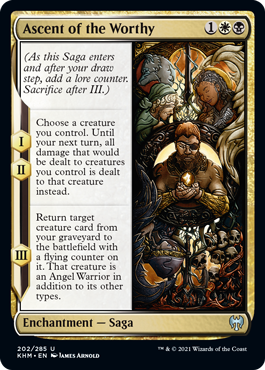
Ascent of the Worthy
{1}{W}{B}
Enchantment — Saga
(As this Saga enters and after your draw step, add a lore counter. Sacrifice after III.)
I, II — Choose a creature you control. Until your next turn, all damage that would be dealt to creatures you control is dealt to that creature instead.
III — Return target creature card from your graveyard to the battlefield with a flying counter on it. That creature is an Angel Warrior in addition to its other types.
- You choose a creature for the chapter I/II ability as that ability resolves.
- If the chosen creature isn't on the battlefield at the time damage would be dealt to creatures you control, that damage is dealt to whichever creature(s) it was supposed to be dealt to. It won't be redirected.
- The chapter I/II ability doesn't change whether the damage is combat damage or not. If combat damage would be dealt to a creature you control, the damage that's dealt instead to the chosen creature is still combat damage.
- If another player gains control of the chosen creature after the chapter I/II ability resolves but before your next turn, damage that would be dealt to creatures you control will still be dealt to that creature instead.
- The creature card put onto the battlefield by the chapter III ability will enter the battlefield as a flying Angel Warrior (in addition to whatever other creature types it has).
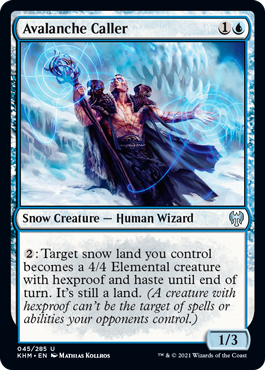
Avalanche Caller
{1}{U}
Snow Creature — Human Wizard
1/3
{2}: Target snow land you control becomes a 4/4 Elemental creature with hexproof and haste until end of turn. It's still a land. (A creature with hexproof can't be the target of spells or abilities your opponents control.)
- A land that becomes a creature because of Avalanche Caller's activated ability will retain any other supertypes, card types, subtypes, and abilities it had. In particular, it will be a snow creature land.
- In most cases, the land that becomes a creature will remain colorless. If another effect caused the land to have one or more colors, the resulting creature land will retain those colors.
- The activated ability doesn't cause the target snow land to become tapped or untapped.
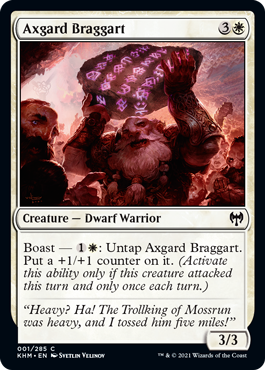
Axgard Braggart
{3}{W}
Creature — Dwarf Warrior
3/3
Boast — {1}{W}: Untap Axgard Braggart. Put a +1/+1 counter on it. (Activate this ability only if this creature attacked this turn and only once each turn.)
- You can activate Axgard Braggart's boast ability even if Axgard Braggart is already untapped. You'll still put a +1/+1 counter on it.
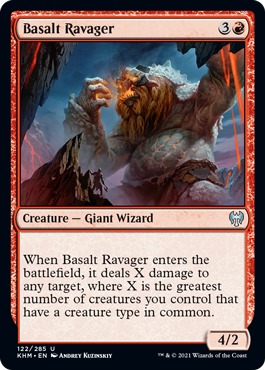
Basalt Ravager
{3}{R}
Creature — Giant Wizard
4/2
When Basalt Ravager enters the battlefield, it deals X damage to any target, where X is the greatest number of creatures you control that have a creature type in common.
- The amount of damage dealt is calculated as the triggered ability resolves based on the creatures you control at that time, including Basalt Ravager itself if it's still under your control. You'll always use the greatest number possible. You don't need to choose any creature types. For example, if you control a Giant Wizard, a Giant Warrior, an Elf Warrior, and a Kor Warrior at that time, Basalt Ravager will deal 3 damage.
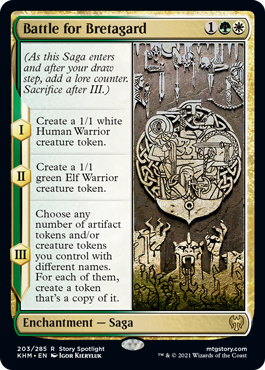
Battle for Bretagard
{1}{G}{W}
Enchantment — Saga
(As this Saga enters and after your draw step, add a lore counter. Sacrifice after III.)
I — Create a 1/1 white Human Warrior creature token.
II — Create a 1/1 green Elf Warrior creature token.
III — Choose any number of artifact tokens and/or creature tokens you control with different names. For each of them, create a token that's a copy of it.
- The chapter III ability doesn't target any of the tokens. You choose which ones you're copying as the ability resolves.
- Unless the effect that creates a token specifies a different name, the name of a token is the same as its creature types. In particular, a Human Warrior creature token has a different name than an Elf Warrior creature token, and you may create a copy of each using the chapter III ability.
- Each token you create copies the original characteristics of the token it's copying as stated by the effect that created that token. The newly created token doesn't copy whether the original token is tapped or untapped, whether it has any counters on it, whether it has any Auras and/or Equipment attached to it, or any non-copy effects that changed its power, toughness, types, color, and so on.
- If the original token is copying something else, the token you create will use the copiable values of the original token. In most cases, it will be a copy of whatever the original token is copying. If it's copying a permanent or card with {X} in its mana cost, X is 0.
- Any enters-the-battlefield abilities of tokens you create will trigger when they enter the battlefield. Any "As [this permanent] enters the battlefield" or "[This permanent] enters the battlefield with" abilities of the tokens will also work.
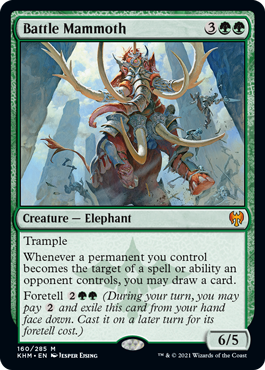
Battle Mammoth
{3}{G}{G}
Creature — Elephant
6/5
Trample
Whenever a permanent you control becomes the target of a spell or ability an opponent controls, you may draw a card.
Foretell {2}{G}{G} (During your turn, you may pay {2} and exile this card from your hand face down. Cast it on a later turn for its foretell cost.)
- Battle Mammoth's triggered ability resolves before the spell or ability that caused it to trigger. It will resolve even if that spell or ability is countered.
- If a spell or ability an opponent controls targets a single permanent you control more than once, Battle Mammoth's triggered ability will trigger only once. However, if a spell or ability an opponent controls targets multiple permanents you control, Battle Mammoth's triggered ability will trigger once for each of those permanents.
- You choose whether to draw a card as Battle Mammoth's triggered ability is resolving.
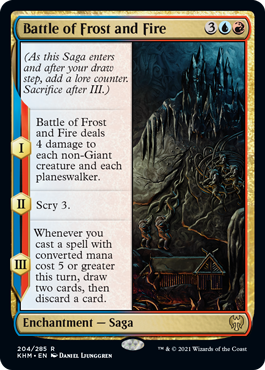
Battle of Frost and Fire
{3}{U}{R}
Enchantment — Saga
(As this Saga enters and after your draw step, add a lore counter. Sacrifice after III.)
I — Battle of Frost and Fire deals 4 damage to each non-Giant creature and each planeswalker.
II — Scry 3.
III — Whenever you cast a spell with converted mana cost 5 or greater this turn, draw two cards, then discard a card.
- The triggered ability created by the chapter III ability may trigger multiple times during the turn, even though Battle of Frost and Fire will likely no longer be on the battlefield.
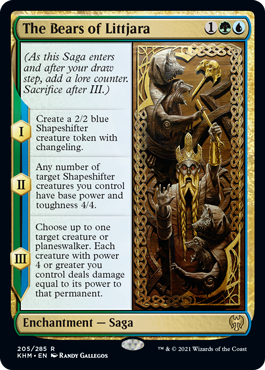
The Bears of Littjara
{1}{G}{U}
Enchantment — Saga
(As this Saga enters and after your draw step, add a lore counter. Sacrifice after III.)
I — Create a 2/2 blue Shapeshifter creature token with changeling.
II — Any number of target Shapeshifter creatures you control have base power and toughness 4/4.
III — Choose up to one target creature or planeswalker. Each creature with power 4 or greater you control deals damage equal to its power to that permanent.
- The chapter II ability overwrites any previous effects that set any of the Shapeshifters' base power and toughness to specific values. Any effects that set a Shapeshifter's base power and toughness that start to apply after the chapter II ability will override the effect of that ability.
- Any effects that modify the Shapeshifter's power or toughness without setting it to a specific value will apply after its base power and toughness are set, regardless of the order in which those effects were created. The same is true of counters that modify its power and toughness.
- The effect of the chapter II ability lasts indefinitely. It doesn't expire at end of turn.
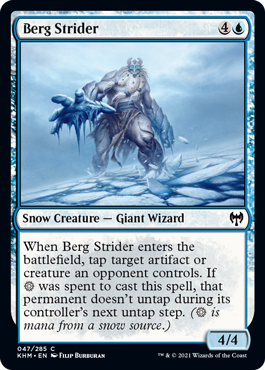
Berg Strider
{4}{U}
Snow Creature — Giant Wizard
4/4
When Berg Strider enters the battlefield, tap target artifact or creature an opponent controls. If {S} was spent to cast this spell, that permanent doesn't untap during its controller's next untap step. ({S} is mana from a snow source.)
- Spending more than one snow mana to cast Berg Strider won't cause the artifact or creature to remain tapped for additional turns.
- The enters-the-battlefield ability can target an artifact or creature an opponent controls that's already tapped. If snow mana was spent to cast Berg Strider, the target won't untap during its controller's next untap step.
- If Berg Strider enters the battlefield without being cast, no mana was spent to cast it. The enters-the-battlefield ability may still tap the target, but that permanent won't be stopped from untapping during its controller's next untap step.
- Similarly, if an effect copies the creature spell that becomes Berg Strider, no mana was spent to cast the copy. The target won't be stopped from untapping during its controller's next untap step.
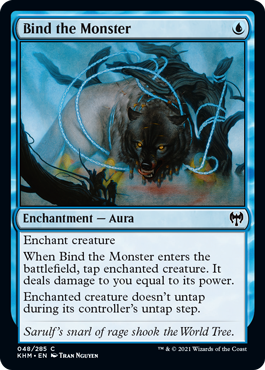
Bind the Monster
{U}
Enchantment — Aura
Enchant creature
When Bind the Monster enters the battlefield, tap enchanted creature. It deals damage to you equal to its power.
Enchanted creature doesn't untap during its controller's untap step.
- The enters-the-battlefield ability triggers even if the enchanted creature is already tapped. That creature will still deal damage to you.
- Use the power of the enchanted creature as the enters-the-battlefield ability resolves to determine how much damage is dealt.
- If Bind the Monster is no longer on the battlefield as the enters-the-battlefield ability resolves, use the power of the creature it was last enchanting to determine how much damage is dealt. Damage is dealt even if that creature is also not on the battlefield at that time.
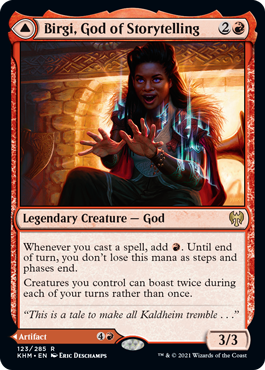
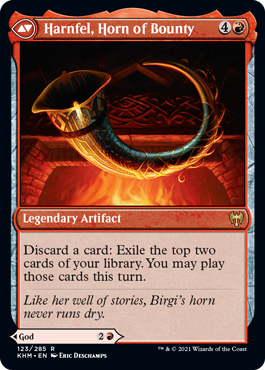
Birgi, God of Storytelling
{2}{R}
Legendary Creature — God
3/3
Whenever you cast a spell, add {R}. Until end of turn, you don't lose this mana as steps and phases end.
Creatures you control can boast twice during each of your turns rather than once.
/////
Harnfel, Horn of Bounty
{4}{R}
Legendary Artifact
Discard a card: Exile the top two cards of your library. You may play those cards this turn.
- Birgi's first ability uses the stack and can be responded to. It isn't a mana ability.
- You must still attack with a creature you control to activate its boast ability.
- The cards exiled by Harnfel's activated ability are exiled face up.
- You may play those cards that turn even if Harnfel leaves the battlefield or another player gains control of it.
- Playing the cards exiled with Harnfel follows the normal rules for playing those cards. You must pay their costs, if any, and you must follow all applicable timing rules. For example, if one of the cards is a creature card, you can cast that card by paying its mana cost only during your main phase while the stack is empty.
- Unless an effect allows you to play additional lands that turn, you can play land cards exiled with Harnfel only if you haven't played a land yet that turn. In most cases, if you exile two land cards with Harnfel, you won't be able to play both.
- Any cards exiled with Harnfel that you don't play remain exiled.
- The card you discard to activate the ability isn't part of "those cards" and can't be played, even if it somehow ends up in exile.
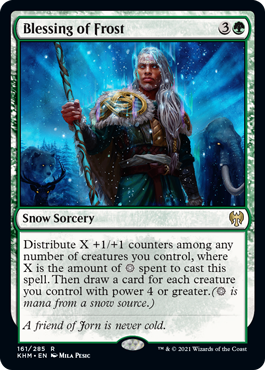
Blessing of Frost
{3}{G}
Snow Sorcery
Distribute X +1/+1 counters among any number of creatures you control, where X is the amount of {S} spent to cast this spell. Then draw a card for each creature you control with power 4 or greater.
- Because Blessing of Frost doesn't target any creatures, you determine how the +1/+1 counters will be distributed as Blessing of Frost resolves. Players may respond to Blessing of Frost as normal, and they'll know how much snow mana you spent to cast it, but they won't necessarily know how the counters will be distributed.
- Because none of the creatures are targeted, you can choose to put +1/+1 counters on a creature with protection from green, for example.
- You determine how many creatures you control with power 4 or greater as Blessing of Frost is resolving, after +1/+1 counters have been put on creatures.
- If you cast Blessing of Frost without spending snow mana, no +1/+1 counters will be distributed. You may still draw cards if your creatures are large enough.
- If Blessing of Frost is copied, no mana was spent to cast the copy, so no +1/+1 counters will be distributed. You may still draw cards if your creatures are large enough.
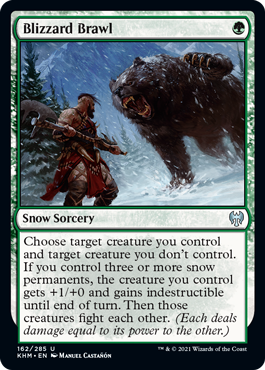
Blizzard Brawl
{G}
Snow Sorcery
Choose target creature you control and target creature you don't control. If you control three or more snow permanents, the creature you control gets +1/+0 and gains indestructible until end of turn. Then those creatures fight each other. (Each deals damage equal to its power to the other.)
- You can't cast Blizzard Brawl unless you choose both a creature you control and one you don't control as targets.
- Check whether you control three or more snow permanents as Blizzard Brawl is resolving to see if the target creature you control gets +1/+0 and gains indestructible. That creature will still fight even if it doesn't get those bonuses.
- If either target is an illegal target as Blizzard Brawl tries to resolve, neither creature will fight and no damage will be dealt.
- If the creature you control is still a legal target as Blizzard Brawl tries to resolve but the target creature you don't control isn't, the creature you control will still get the bonuses until end of turn.
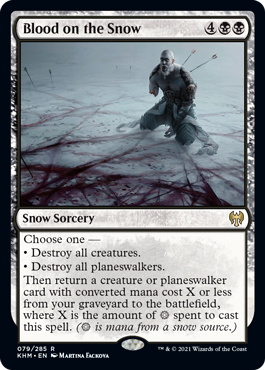
Blood on the Snow
{4}{B}{B}
Snow Sorcery
Choose one —
• Destroy all creatures.
• Destroy all planeswalkers.
Then return a creature or planeswalker card with converted mana cost X or less from your graveyard to the battlefield, where X is the amount of {S} spent to cast this spell. ({S} is mana from a snow source.)
- You choose a mode for Blood on the Snow as you cast it. The last part of the effect (returning a card to the battlefield) happens no matter which mode you choose.
- Blood on the Snow doesn't target any creature or planeswalker card in your graveyard. You choose which one to return to the battlefield, if any, as Blood on the Snow resolves. Notably, you could return one of the creatures or planeswalkers that was just destroyed by Blood on the Snow.
- If a card in a graveyard has {X} in its mana cost, X is considered to be 0.
- If you cast Blood on the Snow without spending snow mana, you can return only a creature or planeswalker card with converted mana cost 0. (Planeswalker cards with converted mana cost 0 likely not coming soon.)
- If Blood on the Snow is copied, no mana was spent to cast the copy, so you can return only a creature or planeswalker card with converted mana cost 0.
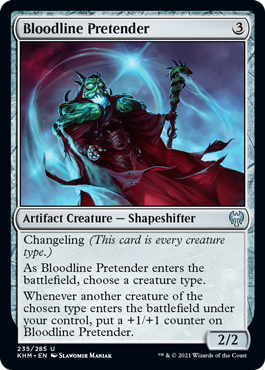
Bloodline Pretender
{3}
Artifact Creature — Shapeshifter
2/2
Changeling (This card is every creature type.)
As Bloodline Pretender enters the battlefield, choose a creature type.
Whenever another creature of the chosen type enters the battlefield under your control, put a +1/+1 counter on Bloodline Pretender.
- You must choose an existing creature type, such as Vampire or Druid. You can't choose card types (e.g., artifact) or supertypes (e.g., snow).
- If Bloodline Pretender enters the battlefield at the same time as another creature, you can choose one of that creature's creature types and have Bloodline Pretender's last ability trigger for that other creature.
- If Bloodline Pretender is somehow on the battlefield without a chosen creature type, its last ability can't trigger, even if a creature with no creature types enters the battlefield.
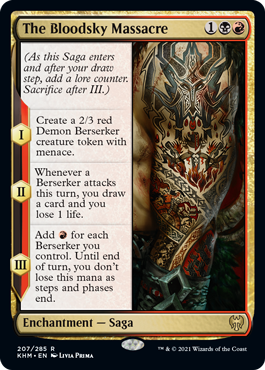
The Bloodsky Massacre
{1}{B}{R}
Enchantment — Saga
(As this Saga enters and after your draw step, add a lore counter. Sacrifice after III.)
I — Create a 2/3 red Demon Berserker creature token with menace.
II — Whenever a Berserker attacks this turn, you draw a card and you lose 1 life.
III — Add {R} for each Berserker you control. Until end of turn, you don't lose this mana as steps and phases end.
- The chapter III ability isn't a mana ability. It uses the stack and can be responded to. Use the number of Berserkers you control as the ability resolves to determine how much {R} to add.
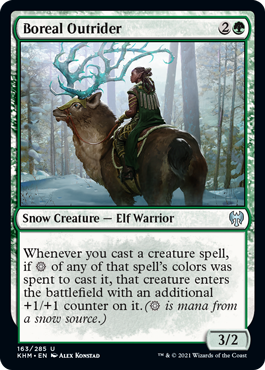
Boreal Outrider
{2}{G}
Snow Creature — Elf Warrior
3/2
Whenever you cast a creature spell, if {S} of any of that spell's colors was spent to cast it, that creature enters the battlefield with an additional +1/+1 counter on it. ({S} is mana from a snow source.)
- Unlike effects that care only whether or not you spent snow mana to cast a spell, Boreal Outrider cares about the color of that snow mana. It doesn't matter which part of the total cost to cast the creature spell the snow mana was spent on, only that the spent snow mana matches one of the creature spell's colors. For example, if a red creature spell has an additional cost to cast it and you spend red mana from a snow source to pay that cost, Boreal Outrider's ability will trigger.
- A creature affected by Boreal Outrider's triggered ability will enter with only one additional +1/+1 counter on it, even if you spent more than one snow mana of the appropriate color(s) to cast it.
- If you control multiple Boreal Outriders, each of their triggered abilities will trigger separately. A creature could enter the battlefield with multiple +1/+1 counters on it this way, even if you spent only a single snow mana of the appropriate color(s) to cast the creature spell.
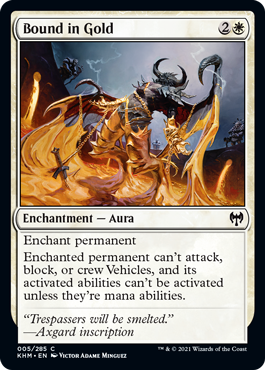
Bound in Gold
{2}{W}
Enchantment — Aura
Enchant permanent
Enchanted permanent can't attack, block, or crew Vehicles, and its activated abilities can't be activated unless they're mana abilities.
- A creature that "can't crew Vehicles" can't be tapped to pay the crew cost of a Vehicle.
- Activated abilities contain a colon and appear in the form "[Cost]: [Effect]." Some keywords (such as equip) are activated abilities and will have colons in their reminder texts. Loyalty abilities of planeswalkers are also activated abilities.
- Bound in Gold doesn't stop static abilities from affecting the game, and it doesn't stop triggered abilities from triggering. It also doesn't stop mana abilities from being activated. Most activated abilities that produce mana as they resolve are mana abilities.
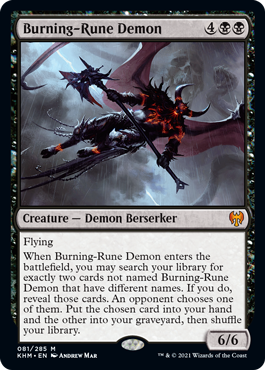
Burning-Rune Demon
{4}{B}{B}
Creature — Demon Berserker
6/6
Flying
When Burning-Rune Demon enters the battlefield, you may search your library for exactly two cards not named Burning-Rune Demon that have different names. If you do, reveal those cards. An opponent chooses one of them. Put the chosen card into your hand and the other into your graveyard, then shuffle your library.
- While in your library, a double-faced card has only the name of its front face. It's not possible to reveal two of the same double-faced card this way.
- If you choose not to search your library, no cards are revealed or put anywhere else, and you don't shuffle.
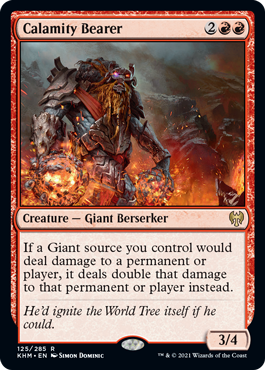
Calamity Bearer
{2}{R}{R}
Creature — Giant Berserker
3/4
If a Giant source you control would deal damage to a permanent or player, it deals double that damage to that permanent or player instead.
- The damage is dealt by the same source as the original source of damage. The doubled damage isn't dealt by Calamity Bearer unless it was the original source of damage.
- If another effect (or effects) modifies how much damage your Giant source would deal—by preventing some of it, for example—the player being dealt damage or the controller of the permanent being dealt damage chooses the order in which any such effects (including Calamity Bearer's) apply. If all of the damage is prevented, Calamity Bearer's effect no longer applies.
- If damage dealt by a Giant source you control is being divided or assigned among multiple permanents and/or players, that damage is divided or assigned before doubling. For example, if you attack with a 5/5 Giant with trample and it's blocked by a 2/2 creature, you can assign 2 damage to the blocker and 3 damage to the defending player. Those amounts are then doubled to 4 and 6, respectively.
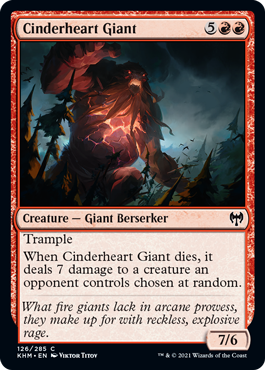
Cinderheart Giant
{5}{R}{R}
Creature — Giant Berserker
7/6
Trample
When Cinderheart Giant dies, it deals 7 damage to a creature an opponent controls chosen at random.
- The creature an opponent controls isn't targeted, so it's chosen as the triggered ability resolves. A creature with hexproof could be chosen, as could a creature with protection from red, although, in the latter case, the damage would be prevented.
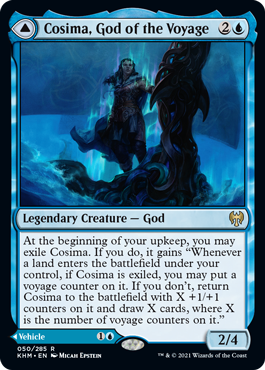
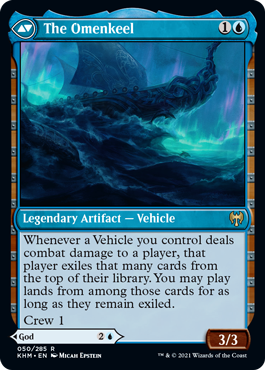
Cosima, God of the Voyage
{2}{U}
Legendary Creature — God
2/4
At the beginning of your upkeep, you may exile Cosima. If you do, it gains "Whenever a land enters the battlefield under your control, if Cosima is exiled, you may put a voyage counter on it. If you don't, return Cosima to the battlefield with X +1/+1 counters on it and draw X cards, where X is the number of voyage counters on it."
/////
The Omenkeel
{1}{U}
Legendary Artifact — Vehicle
3/3
Whenever a Vehicle you control deals combat damage to a player, that player exiles that many cards from the top of their library. You may play lands from among those cards for as long as they remain exiled.
Crew 1
- Cosima's ability triggers only if Cosima is on the battlefield at the beginning of your upkeep, and you may exile Cosima only if it is still on the battlefield as the ability resolves.
- While the triggered ability Cosima gains is resolving, if you don't put a voyage counter on Cosima, you'll immediately return it to the battlefield and draw cards equal to the number of voyage counters Cosima had on it in exile. Players can't respond to this choice, and no player may take actions during this process.
- You may choose to return Cosima to the battlefield even if it doesn't have any voyage counters on it. If you do, it won't enter with any +1/+1 counters on it and you won't draw any cards.
- If a land enters the battlefield under your control while Cosima is exiled and has the added triggered ability, that ability will trigger. As the ability tries to resolve, it will check to see if Cosima is still in exile. If Cosima has left exile before the ability tries to resolve, it won't resolve and none of its effects will happen. This is true even if Cosima returns to exile before that ability tries to resolve.
- The Omenkeel doesn't allow you to play additional lands during your turn, nor does it allow you to play lands at times you normally can't. In most cases, you'll be able to play only one land from among cards exiled with The Omenkeel during each of your turns.
- You can play lands from among cards exiled with The Omenkeel for as long as they remain exiled, even if The Omenkeel leaves the battlefield or another player gains control of it.
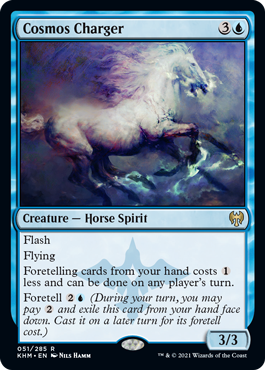
Cosmos Charger
{3}{U}
Creature — Horse Spirit
3/3
Flash
Flying
Foretelling cards from your hand costs {1} less and can be done on any player's turn.
Foretell {2}{U} (During your turn, you may pay {2} and exile this card from your hand face down. Cast it on a later turn for its foretell cost.)
- While you control Cosmos Charger, you can foretell cards any time you have priority.
- The cost reduction refers to the cost you pay as you exile the card from your hand face down, not the cost you pay as you cast the spell from exile.
- If you control two Cosmos Chargers, you can foretell cards from your hand by paying {0}. Additional Cosmos Chargers won't affect this cost further.
- Cosmos Charger's third ability applies only if it's on the battlefield. Notably, it doesn't affect when you can foretell Cosmos Charger itself or how much you pay to do so.
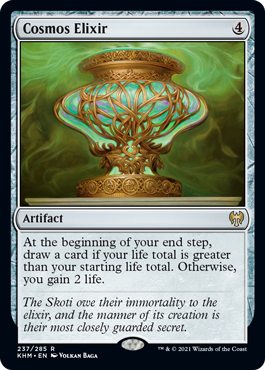
Cosmos Elixir
{4}
Artifact
At the beginning of your end step, draw a card if your life total is greater than your starting life total. Otherwise, you gain 2 life.
- You compare your current life total to your starting life total as Cosmos Elixir's ability resolves to determine whether you draw a card or gain 2 life. There are no situations in which you'll do both.
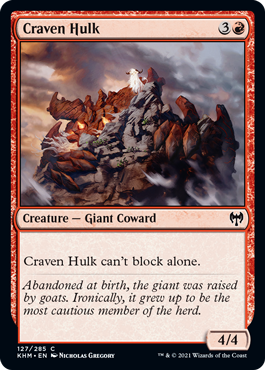
Craven Hulk
{3}{R}
Creature — Giant Coward
4/4
Craven Hulk can't block alone.
- Although Craven Hulk can't be the only creature you declare as a blocking creature, it can be the only creature that blocks any given attacking creature. Other blocking creatures don't have to block the same creature Craven Hulk does.
- If you control more than one Craven Hulk, they can all block together, even if no other creatures block.
- Once Craven Hulk has been declared as a blocking creature, it will remain in combat even if all other blockers leave the battlefield or are otherwise removed from combat.
- If an effect says that Craven Hulk blocks "if able," and you control at least one other creature that is able to block, you must block with Craven Hulk and at least one other creature.
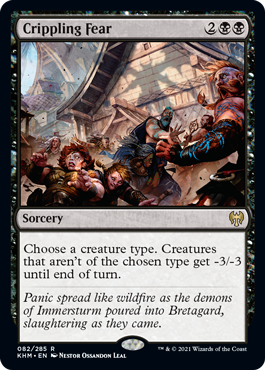
Crippling Fear
{2}{B}{B}
Sorcery
Choose a creature type. Creatures that aren't of the chosen type get -3/-3 until end of turn.
- You choose the creature type as Crippling Fear resolves, and then creatures not of that type get -3/-3. Once Crippling Fear starts to resolve, players can't respond to the choice or take any actions until Crippling Fear finishes resolving.
- You must choose an existing creature type, such as Fish or Artificer. You can't choose card types (e.g., artifact) or supertypes (e.g., snow).
- Crippling Fear affects only creatures that aren't of the chosen type that are on the battlefield as it resolves. It won't affect creatures that enter the battlefield later in the turn, regardless of creature type. If a creature changes creature types later in the turn, Crippling Fear won't start or stop affecting that creature.
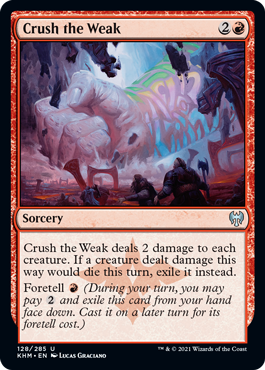
Crush the Weak
{2}{R}
Sorcery
Crush the Weak deals 2 damage to each creature. If a creature dealt damage this way would die this turn, exile it instead.
Foretell {R} (During your turn, you may pay {2} and exile this card from your hand face down. Cast it on a later turn for its foretell cost.)
- Creatures don't necessarily have to be dealt lethal damage by Crush the Weak to be exiled. After being dealt damage, if they would die for any reason that turn, they'll be exiled instead.
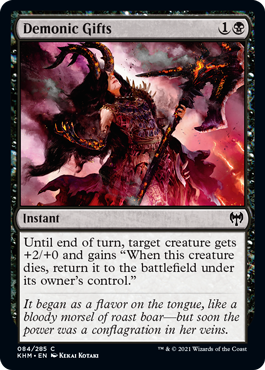
Demonic Gifts
{1}{B}
Instant
Until end of turn, target creature gets +2/+0 and gains "When this creature dies, return it to the battlefield under its owner's control."
- The reanimating effect of Demonic Gifts works only once. Once the creature dies and returns to the battlefield, it's a new object with no relation to the creature it was. If that new creature dies, it won't come back.
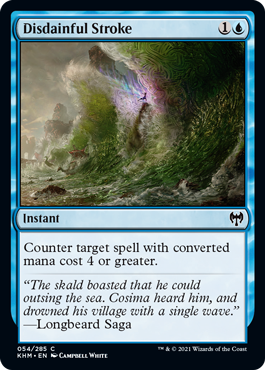
Disdainful Stroke
{1}{U}
Instant
Counter target spell with converted mana cost 4 or greater.
- If a spell has {X} in its mana cost, use the value chosen for X when determining the spell's converted mana cost.

Divine Gambit
{W}{W}
Sorcery
Exile target artifact, creature, or enchantment an opponent controls. That player may put a permanent card from their hand onto the battlefield.
- A permanent card is an artifact, creature, enchantment, land, or planeswalker card.
- If the artifact, creature, or enchantment is an illegal target as Divine Gambit tries to resolve, Divine Gambit won't resolve and none of its effects will happen. No player will put any cards onto the battlefield.
- If the player chooses to put a double-faced card onto the battlefield, it enters with its front face up. They may do this only if the front face of the card is a permanent card.
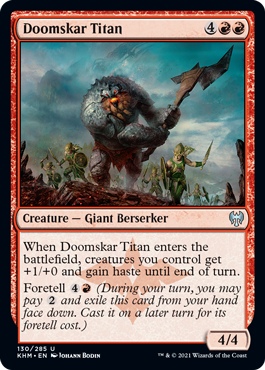
Doomskar Titan
{4}{R}{R}
Creature — Giant Berserker
4/4
When Doomskar Titan enters the battlefield, creatures you control get +1/+0 and gain haste until end of turn.
Foretell {4}{R} (During your turn, you may pay {2} and exile this card from your hand face down. Cast it on a later turn for its foretell cost.)
- The triggered ability affects only creatures you control at the time the ability resolves, probably including Doomskar Titan itself. Creatures you begin to control later in the turn won't gain the bonuses.
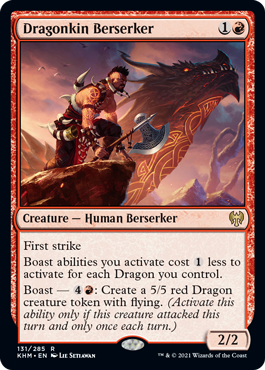
Dragonkin Berserker
{1}{R}
Creature — Human Berserker
2/2
First strike
Boast abilities you activate cost {1} less to activate for each Dragon you control.
Boast — {4}{R}: Create a 5/5 red Dragon creature token with flying. (Activate this ability only if this creature attacked this turn and only once each turn.)
- The cost reduction applies only to generic mana in the activation costs of boast abilities you activate. It can't reduce requirements of specific colors of mana.
- Once you announce that you're activating a boast ability, no player may take actions until the ability has been paid for. Notably, opponents can't try to change the activation cost by removing your Dragons.
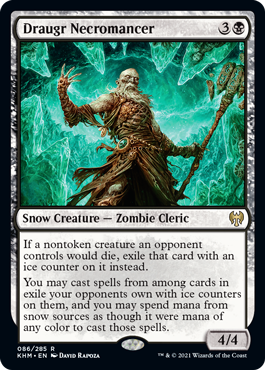
Draugr Necromancer
{3}{B}
Snow Creature — Zombie Cleric
4/4
If a nontoken creature an opponent controls would die, exile that card with an ice counter on it instead.
You may cast spells from among cards in exile your opponents own with ice counters on them, and you may spend mana from snow sources as though it were mana of any color to cast those spells.
- If an opponent controls a nontoken creature that you own and that creature would die, it will be exiled with an ice counter on it. However, you won't be able to cast that card from exile.
- Similarly, if a nontoken land an opponent controls that's become a creature dies, that card will be exiled with an ice counter, but Draugr Necromancer doesn't allow you to play lands from exile.
- Casting a spell from exile this way follows the normal rules for casting that spell. You must pay its costs, and you must follow all applicable timing rules.
- Draugr Necromancer allows you to cast spells from among any cards in exile your opponents own with ice counters on them, including cards that were exiled by previous Draugr Necromancers.
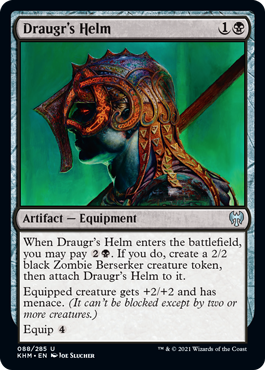
Draugr's Helm
{1}{B}
Artifact — Equipment
When Draugr's Helm enters the battlefield, you may pay {2}{B}. If you do, create a 2/2 black Zombie Berserker creature token, then attach Draugr's Helm to it.
Equipped creature gets +2/+2 and has menace. (It can't be blocked except by two or more creatures.)
Equip {4}
- You decide whether to pay {2}{B} as the enters-the-battlefield ability resolves. If you do, you immediately create the Zombie Berserker creature token and attach Draugr's Helm to it. No players may respond to your decision to pay or not, and no player may take actions during this process.
- The Zombie Berserker creature token enters the battlefield as a 2/2 creature. Any abilities that trigger when a creature with a certain power or toughness enters the battlefield will see the token enter as a 2/2 creature.
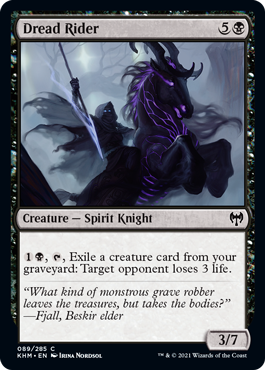
Dread Rider
{5}{B}
Creature — Spirit Knight
3/7
{1}{B}, {T}, Exile a creature card from your graveyard: Target opponent loses 3 life.
- Although players may respond to the activated ability, they can't respond to the paying of its activation cost. The creature card will already be exiled by the time anyone can respond.
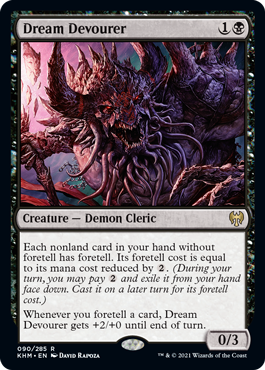
Dream Devourer
{1}{B}
Creature — Demon Cleric
0/3
Each nonland card in your hand without foretell has foretell. Its foretell cost is equal to its mana cost reduced by {2}. (During your turn, you may pay {2} and exile it from your hand face down. Cast it on a later turn for its foretell cost.)
Whenever you foretell a card, Dream Devourer gets +2/+0 until end of turn.
- Cards that are foretold by virtue of Dream Devourer's ability won't continue to have the foretell ability once they leave your hand, but you can still cast them from exile on a later turn for the foretell costs they were given by Dream Devourer.
- It doesn't matter if Dream Devourer is still on the battlefield or still under your control as you cast the spell from exile.
- The reduction of the foretell cost applies only to generic mana in the foretell cost. It can't reduce requirements of specific colors of mana. For example, if you foretell a card in your hand with mana cost {1}{G}{G}, its foretell cost will be {G}{G}.
- If you foretell a modal double-faced card, the foretell cost will be based on the mana cost of the face you cast from exile. For example, if you foretell Kolvori, God of Kinship/The Ringhart Crest, you can cast Kolvori by paying {G}{G} or The Ringhart Crest by paying {G} on a future turn. If you foretell a modal double-faced card whose front face is a nonland face but whose back face is a land face, you can't play that card as a land.
- The last ability triggers when you exile a card from your hand using foretell, not when you cast a foretold card from exile.
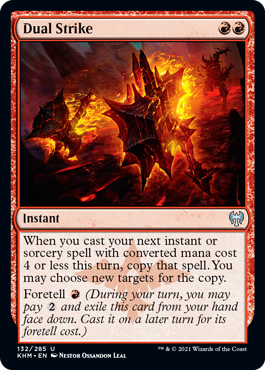
Dual Strike
{R}{R}
Instant
When you cast your next instant or sorcery spell with converted mana cost 4 or less this turn, copy that spell. You may choose new targets for the copy.
Foretell {R} (During your turn, you may pay {2} and exile this card from your hand face down. Cast it on a later turn for its foretell cost.)
- Dual Strike will copy any instant or sorcery spell with converted mana cost 4 or less, not just one that requires targets.
- A copy is created even if the spell you cast has been countered or otherwise left the stack by the time the copy ability resolves. The copy will resolve before the original spell.
- If you copy a spell with targets, the copy will have the same targets unless you choose new ones. You may change any number of the targets, including all of them or none of them. If, for any of the targets, you can't choose a new legal target, that target remains unchanged (even if the current target is illegal).
- If the spell that's copied is modal (that is, it has a bulleted list of modes), the copy will have the same mode or modes. You can't choose different ones.
- If a spell has {X} in its mana cost, use the value of X to determine whether its converted mana cost is 4 or less. If the spell is copied, the copy will have the same value of X.
- If the spell has damage divided as it was cast, the division can't be changed, although the targets receiving that damage still can. The same is true of spells that distribute counters.
- You can't choose to pay any alternative or additional costs for the copy. However, effects based on any alternative or additional costs that were paid for the original spell are copied as though those same costs were paid for the copy.
- The copy is created on the stack, so it's not "cast." Abilities that trigger when a player casts a spell won't trigger.
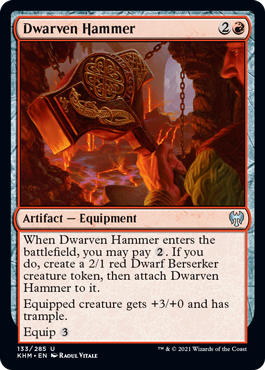
Dwarven Hammer
{2}{R}
Artifact — Equipment
When Dwarven Hammer enters the battlefield, you may pay {2}. If you do, create a 2/1 red Dwarf Berserker creature token, then attach Dwarven Hammer to it.
Equipped creature gets +3/+0 and has trample.
Equip {3}
- You decide whether to pay {2} as the enters-the-battlefield ability resolves. If you do, you immediately create the Dwarf Berserker creature token and attach Dwarven Hammer to it. No players may respond to your decision to pay or not, and no player may take actions during this process.
- The Dwarf Berserker creature token enters the battlefield as a 2/1 creature. Any abilities that trigger when a creature with a certain power enters the battlefield will see the token enter as a 2/1 creature.
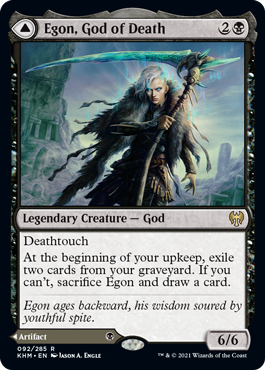
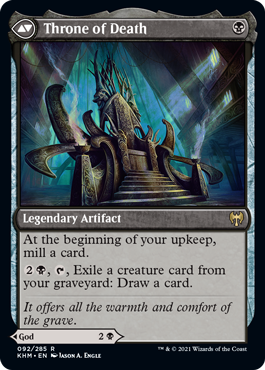
Egon, God of Death
{2}{B}
Legendary Creature — God
6/6
Deathtouch
At the beginning of your upkeep, exile two cards from your graveyard. If you can't, sacrifice Egon and draw a card.
/////
Throne of Death
{B}
Legendary Artifact
At the beginning of your upkeep, mill a card.
{2}{B}, {T}, Exile a creature card from your graveyard: Draw a card.
- You choose which cards you're exiling as Egon's triggered ability is resolving. If there are two or more cards in your graveyard at that time, you must exile two of them. You can't choose not to exile cards and sacrifice Egon instead to draw a card.
- If there's only one card in your graveyard, you won't exile it. Because you can't exile two cards from your graveyard, you'll sacrifice Egon and draw a card.
- If Egon leaves the battlefield before its triggered ability resolves, you'll still exile two cards from your graveyard if you can and draw a card if you can't.
- Although players may respond to Throne of Death's activated ability, they can't respond to the paying of its activation cost. The creature card will already be exiled by the time anyone can respond.
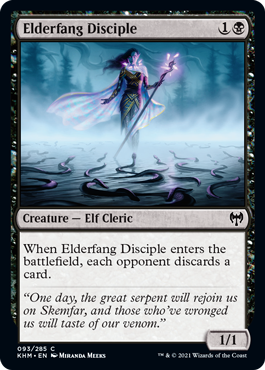
Elderfang Disciple
{1}{B}
Creature — Elf Cleric
1/1
When Elderfang Disciple enters the battlefield, each opponent discards a card.
- As the triggered ability resolves, first the next opponent in turn order (or, if it's an opponent's turn, the opponent whose turn it is) chooses a card in hand and sets it aside without revealing it. Then each other opponent in turn order does the same. Finally, all chosen cards are revealed and discarded at the same time.
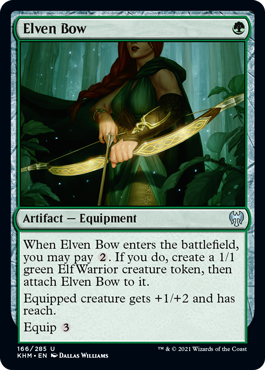
Elven Bow
{G}
Artifact — Equipment
When Elven Bow enters the battlefield, you may pay {2}. If you do, create a 1/1 green Elf Warrior creature token, then attach Elven Bow to it.
Equipped creature gets +1/+2 and has reach.
Equip {3}
- You decide whether to pay {2} as the enters-the-battlefield ability resolves. If you do, you immediately create the Elf Warrior creature token and attach Elven Bow to it. No players may respond to your decision to pay or not, and no player may take actions during this process.
- The Elf Warrior creature token enters the battlefield as a 1/1 creature. Any abilities that trigger when a creature with a certain power or toughness enters the battlefield will see the token enter as a 1/1 creature.
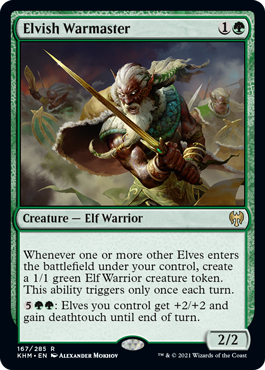
Elvish Warmaster
{1}{G}
Creature — Elf Warrior
2/2
Whenever one or more other Elves enter the battlefield under your control, create a 1/1 green Elf Warrior creature token. This ability triggers only once each turn.
{5}{G}{G}: Elves you control get +2/+2 and gain deathtouch until end of turn.
- It doesn't matter how many Elves enter the battlefield under your control. The ability creates only one Elf Warrior creature token.
- Once the triggered ability has triggered once during a turn, it can't trigger again, even if the triggered ability is still on the stack, has been countered, or has otherwise left the stack.
- The activated ability affects only Elves you control as the ability resolves. Elves you begin to control later in the turn won't get the bonuses. Creatures you control that become Elves later in the turn won't get the bonuses, and Elves you control that got the bonuses that stop being Elves later in the turn won't lose them.
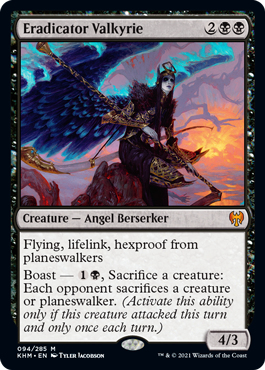
Eradicator Valkyrie
{2}{B}{B}
Creature — Angel Berserker
4/3
Flying, lifelink, hexproof from planeswalkers
Boast — {1}{B}, Sacrifice a creature: Each opponent sacrifices a creature or planeswalker. (Activate this ability only if this creature attacked this turn and only once each turn.)
- Eradicator Valkyrie can't be the target of abilities whose source is a planeswalker an opponent controls.
- As the boast ability resolves, first the next opponent in turn order chooses a creature or planeswalker they control. Then each other opponent in turn order chooses a creature or planeswalker they control, knowing the choices made before their choice. Then all chosen creatures and planeswalkers are sacrificed at the same time.
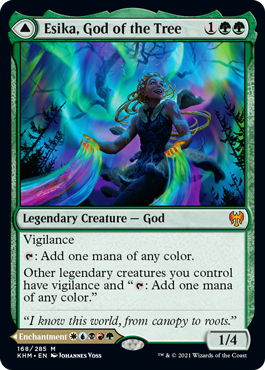
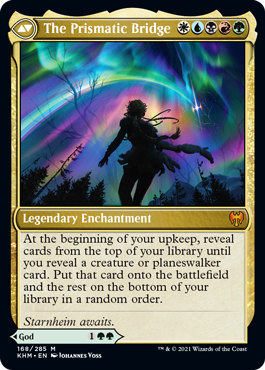
Esika, God of the Tree
{1}{G}{G}
Legendary Creature — God
1/4
Vigilance
{T}: Add one mana of any color.
Other legendary creatures you control have vigilance and "{T}: Add one mana of any color."
/////
The Prismatic Bridge
{W}{U}{B}{R}{G}
Legendary Enchantment
At the beginning of your upkeep, reveal cards from the top of your library until you reveal a creature or planeswalker card. Put that card onto the battlefield and the rest on the bottom of your library in a random order.
- If a creature loses vigilance after it attacks (perhaps because Esika leaves the battlefield), that creature will continue attacking. It won't become tapped.
- While resolving the triggered ability of The Prismatic Bridge, if there are no creature or planeswalker cards in your library, you'll simply reveal your entire library, randomize it, and continue playing.
- If you reveal a double-faced card whose front face is a creature or planeswalker, you'll put it onto the battlefield with its front face up.
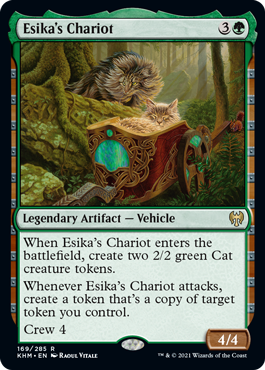
Esika's Chariot
{3}{G}
Legendary Artifact — Vehicle
4/4
When Esika's Chariot enters the battlefield, create two 2/2 green Cat creature tokens.
Whenever Esika's Chariot attacks, create a token that's a copy of target token you control.
Crew 4
- The token you create copies the original characteristics of the token it's copying as stated by the effect that created that token. The newly created token doesn't copy whether the original token is tapped or untapped, whether it has any counters on it, whether it has any Auras and/or Equipment attached to it, or any non-copy effects that changed its power, toughness, types, color, and so on. Notably, the token you create won't be attacking, even if the original token is.
- If the original token is copying something else, the token you create will use the copiable values of the original token. In most cases, it will be a copy of whatever the original token is copying. If it's copying a permanent or card with {X} in its mana cost, X is 0.
- Any enters-the-battlefield abilities of the token you create will trigger when it enters the battlefield. Any "As [this permanent] enters the battlefield" or "[This permanent] enters the battlefield with" abilities of the copied token will also work.
- If the original token is an Aura, the token you create is put onto the battlefield without being cast. The Aura's controller-to-be chooses what it will enchant as it enters the battlefield. An Aura put onto the battlefield this way doesn't target anything (so it could be attached to an opponent's permanent with hexproof, for example), but the Aura's enchant ability restricts what it can be attached to. If an Aura token can't legally be attached to anything, it isn't created.
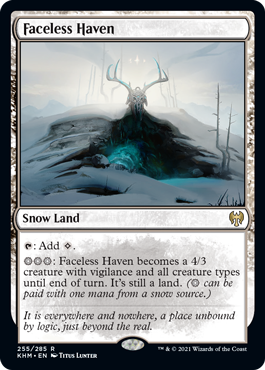
Faceless Haven
Snow Land
{T}: Add {C}.
{S}{S}{S}: Faceless Haven becomes a 4/3 creature with vigilance and all creature types until end of turn. It's still a land. ({S} can be paid with one mana from a snow source.)
- Although Faceless Haven will have all creature types after its last activated ability resolves, it will not have the changeling keyword ability.
- If Faceless Haven becomes a creature but hasn't been under your control since the beginning of your most recent turn, it can't attack or be tapped for mana.
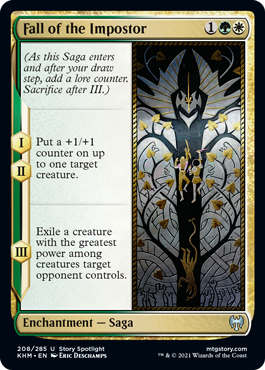
Fall of the Impostor
{1}{G}{W}
Enchantment — Saga
(As this Saga enters and after your draw step, add a lore counter. Sacrifice after III.)
I, II — Put a +1/+1 counter on up to one target creature.
III — Exile a creature with the greatest power among creatures target opponent controls.
- The greatest power among creatures target opponent controls is determined solely by evaluating the creatures that player controls at that time. You won't consider creatures controlled by any other player.
- If the target player controls more than one creature tied for the greatest power among creatures that player controls, you choose which one of them is exiled.
- The chapter III ability doesn't target any creatures. For example, a creature with protection from white could be exiled this way.
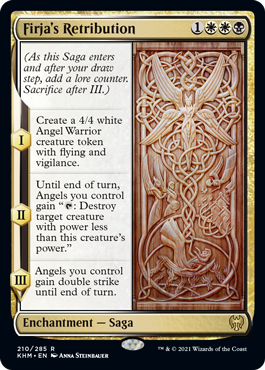
Firja's Retribution
{1}{W}{W}{B}
Enchantment — Saga
(As this Saga enters and after your draw step, add a lore counter. Sacrifice after III.)
I — Create a 4/4 white Angel Warrior creature token with flying and vigilance.
II — Until end of turn, Angels you control gain "{T}: Destroy target creature with power less than this creature's power."
III — Angels you control gain double strike until end of turn.
- Only Angels you control as the chapter II ability resolves will gain the activated ability. Similarly, only Angels you control as the chapter III ability resolves will gain double strike. In both cases, Angels that come under your control later in the turn won't gain the ability.
- The power of the target creature must be less than the power of the Angel as you activate the ability. As the ability tries to resolve, the powers are compared again. If the power of the target creature is no longer less than the power of the Angel, the ability won't resolve. If the Angel is no longer on the battlefield at that time, use its power as it last existed on the battlefield to determine if the ability resolves.
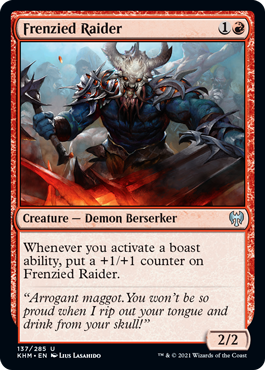
Frenzied Raider
{1}{R}
Creature — Demon Berserker
2/2
Whenever you activate a boast ability, put a +1/+1 counter on Frenzied Raider.
- Frenzied Raider's triggered ability will resolve before the boast ability that caused it to trigger.
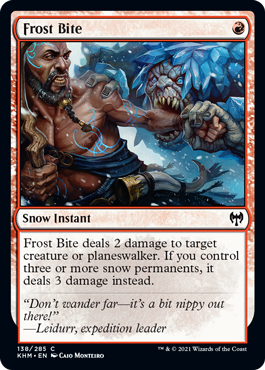
Frost Bite
{R}
Snow Instant
Frost Bite deals 2 damage to target creature or planeswalker. If you control three or more snow permanents, it deals 3 damage instead.
- Whether or not you control three or more snow permanents is checked as Frost Bite is resolving.
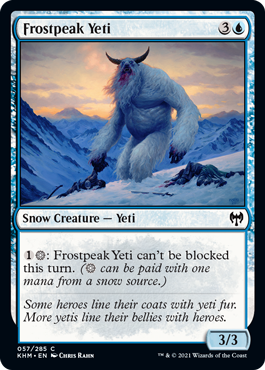
Frostpeak Yeti
{3}{U}
Snow Creature — Yeti
3/3
{1}{S}: Frostpeak Yeti can't be blocked this turn. ({S} can be paid with one mana from a snow source.)
- Activating Frostpeak Yeti's ability after it's already been blocked won't cause it to become unblocked.
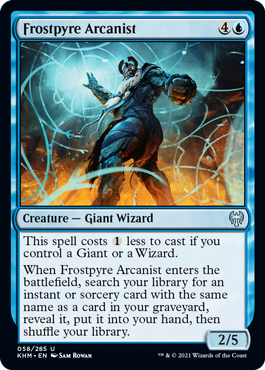
Frostpyre Arcanist
{4}{U}
Creature — Giant Wizard
2/5
This spell costs {1} less to cast if you control a Giant or a Wizard.
When Frostpyre Arcanist enters the battlefield, search your library for an instant or sorcery card with the same name as a card in your graveyard, reveal it, put it into your hand, then shuffle your library.
- If you control more than one Giant and/or Wizard, Frostpyre Arcanist still costs only {1} less to cast.
- Once you announce that you're casting Frostpyre Arcanist, no player may take other actions until the spell's been paid for. Notably, opponents can't try to change the cost by removing your Giants and Wizards.
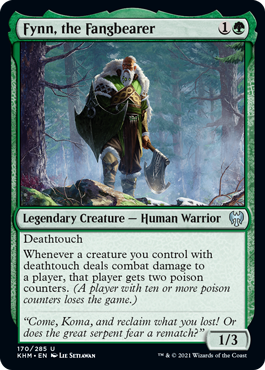
Fynn, the Fangbearer
{1}{G}
Legendary Creature — Human Warrior
1/3
Deathtouch
Whenever a creature you control with deathtouch deals combat damage to a player, that player gets two poison counters. (A player with ten or more poison counters loses the game.)
- Losing the game because a player (preferably an opponent) has ten or more poison counters is a rule of the game. Fynn doesn't have to still be on the battlefield when someone (preferably an opponent) gets their tenth poison counter.
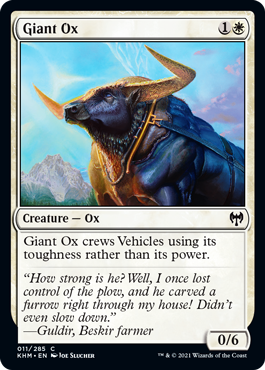
Giant Ox
{1}{W}
Creature — Ox
0/6
Giant Ox crews Vehicles using its toughness rather than its power.
- Crewing a Vehicle doesn't cause Giant Ox's power or toughness to change.
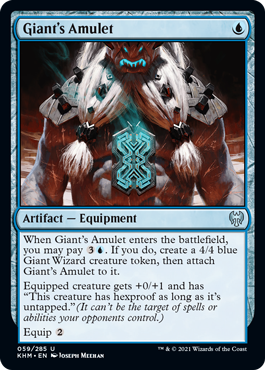
Giant's Amulet
{U}
Artifact — Equipment
When Giant's Amulet enters the battlefield, you may pay {3}{U}. If you do, create a 4/4 blue Giant Wizard creature token, then attach Giant's Amulet to it.
Equipped creature gets +0/+1 and has "This creature has hexproof as long as it's untapped." (It can't be the target of spells or abilities your opponents control.)
Equip {2}
- You decide whether to pay {3}{U} as the enters-the-battlefield ability resolves. If you do, you immediately create the Giant Wizard creature token and attach Giant's Amulet to it. No players may respond to your decision to pay or not, and no player may take actions during this process.
- The Giant Wizard creature token enters the battlefield as a 4/4 creature. Any abilities that trigger when a creature with a certain toughness enters the battlefield will see the token enter as a 4/4 creature.
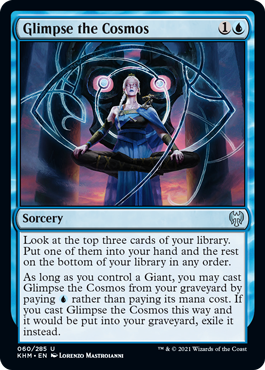
Glimpse the Cosmos
{1}{U}
Sorcery
Look at the top three cards of your library. Put one of them into your hand and the rest on the bottom of your library in any order.
As long as you control a Giant, you may cast Glimpse the Cosmos from your graveyard by paying {U} rather than paying its mana cost. If you cast Glimpse the Cosmos this way and it would be put into your graveyard, exile it instead.
- Casting Glimpse the Cosmos from your graveyard using the last ability doesn't change when you can cast it.
- If you cast Glimpse the Cosmos from your graveyard using a different permission, the last ability won't apply. You'll pay whatever cost that permission stipulates, and you'll follow that permission's instructions regarding exiling Glimpse the Cosmos, if any.
- If Glimpse the Cosmos resolves during your turn and is put into your graveyard, you receive priority before any other player does. You can cast Glimpse the Cosmos again from your graveyard using the last ability before any player can attempt to remove it from your graveyard.
- Glimpse the Cosmos has converted mana cost 2, no matter what you actually paid to cast it.
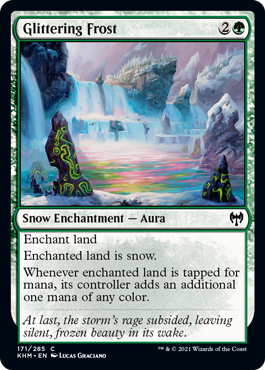
Glittering Frost
{2}{G}
Snow Enchantment — Aura
Enchant land
Enchanted land is snow.
Whenever enchanted land is tapped for mana, its controller adds an additional one mana of any color.
- The enchanted land will retain any other supertypes it may have, such as basic or legendary. It will also retain any subtypes it may have, such as Forest or Island.
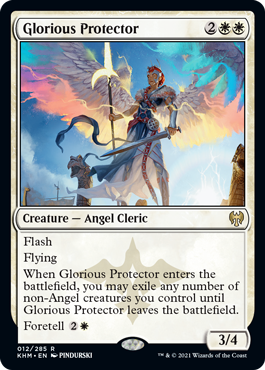
Glorious Protector
{2}{W}{W}
Creature — Angel Cleric
3/4
Flash
Flying
When Glorious Protector enters the battlefield, you may exile any number of non-Angel creatures you control until Glorious Protector leaves the battlefield.
Foretell {2}{W}
- Glorious Protector's enters-the-battlefield ability doesn't target any creatures. You choose which non-Angel creatures to exile, if any, as that ability resolves.
- If Glorious Protector leaves the battlefield before its triggered ability resolves, no creatures will be exiled.
- Auras attached to any exiled permanents will be put into their owners' graveyards. Any Equipment will become unattached and remain on the battlefield. Any counters on the exiled permanents will cease to exist. When the cards return to the battlefield, they will be new objects with no connection to the cards that were exiled.
- If a token is exiled this way, it will cease to exist and won't return to the battlefield.

Gnottvold Slumbermound
Land
Gnottvold Slumbermound enters the battlefield tapped.
{T}: Add {R}.
{3}{R}{G}{G}, {T}, Sacrifice Gnottvold Slumbermound: Destroy target land. Create a 4/4 green Troll Warrior creature token with trample.
- If the target land is an illegal target by the time the last activated ability tries to resolve, the ability won't resolve and none of its effects will happen. You won't create a Troll Warrior creature token.
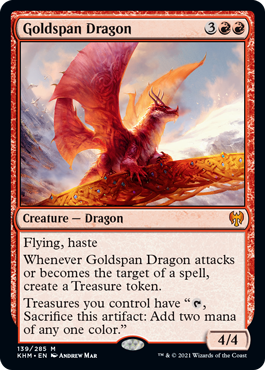
Goldspan Dragon
{3}{R}{R}
Creature — Dragon
4/4
Flying, haste
Whenever Goldspan Dragon attacks or becomes the target of a spell, create a Treasure token.
Treasures you control have "{T}, Sacrifice this artifact: Add two mana of any one color."
- If a spell targets Goldspan Dragon more than once, the triggered ability will trigger only once.
- An ability that triggers when a creature becomes the target of a spell resolves before the spell that caused it to trigger. Such an ability resolves even if that spell is countered.
- Players can cast spells and activate abilities after the triggered ability resolves but before the spell that caused it to trigger does.
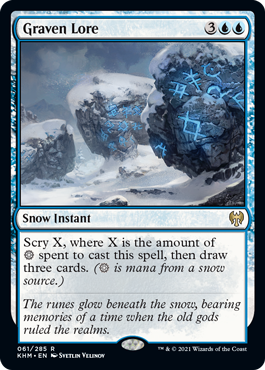
Graven Lore
{3}{U}{U}
Snow Instant
Scry X, where X is the amount of {S} spent to cast this spell, then draw three cards. ({S} is mana from a snow source.)
- If you cast Graven Lore without spending snow mana, you'll just draw three cards.
- If Graven Lore is copied, no mana was spent to cast the copy, so you'll just draw three cards.
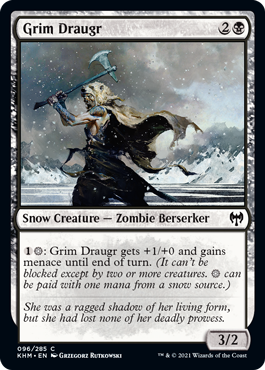
Grim Draugr
{2}{B}
Snow Creature — Zombie Berserker
3/2
{1}{S}: Grim Draugr gets +1/+0 and gains menace until end of turn. (It can't be blocked except by two or more creatures. {S} can be paid with one mana from a snow source.)
- Activating Grim Draugr's ability after it's been blocked by a single creature won't cause Grim Draugr to become unblocked.


Halvar, God of Battle
{2}{W}{W}
Legendary Creature — God
4/4
Creatures you control that are enchanted or equipped have double strike.
At the beginning of each combat, you may attach target Aura or Equipment attached to a creature you control to target creature you control.
/////
Sword of the Realms
{1}{W}
Legendary Artifact — Equipment
Equipped creature gets +2/+0 and has vigilance.
Whenever equipped creature dies, return it to its owner's hand.
Equip {1}{W}
- A creature you control is enchanted or equipped if there's an Aura or an Equipment attached to it. You don't have to control that Aura or Equipment.
- Similarly, you don't have to control the Aura or Equipment that you choose as a target of Halvar's triggered ability, but it must be attached to a creature you control.
- If either target of the triggered ability is an illegal target as the ability resolves, the ability won't do anything. If both targets are illegal, the ability won't resolve. If the Aura or Equipment is already attached to the target creature, nothing happens.
- If the creature equipped by Sword of the Realms dies but leaves the graveyard before the triggered ability resolves, it won't be returned to its owner's hand. It will just stay wherever it went.
- If Sword of the Realms is attached to a token creature that dies, the Sword's triggered ability will trigger, but the token will cease to exist after going to the graveyard. It won't be returned to its owner's hand.
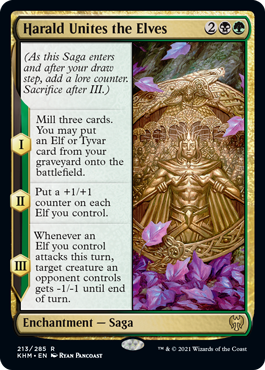
Harald Unites the Elves
{2}{B}{G}
Enchantment — Saga
(As this Saga enters and after your draw step, add a lore counter. Sacrifice after III.)
I — Mill three cards. You may put an Elf or Tyvar card from your graveyard onto the battlefield.
II — Put a +1/+1 counter on each Elf you control.
III — Whenever an Elf you control attacks this turn, target creature an opponent controls gets -1/-1 until end of turn.
- For the chapter I ability, the Elf or Tyvar card you put onto the battlefield can be one of the cards you just milled, or it may be one that was already in your graveyard.
- Only Elves you control as the chapter II ability resolves will get a +1/+1 counter. Elves that come under your control later in the turn will not.
- Conversely, the triggered ability created by the chapter III ability will trigger whenever any Elf you control attacks that turn, even if you didn't control that Elf as the chapter III ability resolved.
- The triggered ability created by the chapter III ability resolves before blockers are declared. It may remove opposing creatures before they have the chance to block.
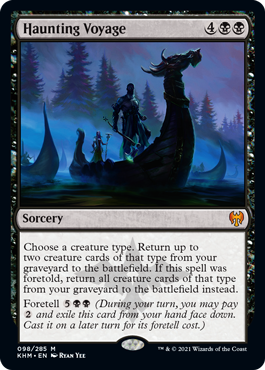
Haunting Voyage
{4}{B}{B}
Sorcery
Choose a creature type. Return up to two creature cards of that type from your graveyard to the battlefield. If this spell was foretold, return all creature cards of that type from your graveyard to the battlefield instead.
Foretell {5}{B}{B} (During your turn, you may pay {2} and exile this card from your hand face down. Cast it on a later turn for its foretell cost.)
- Haunting Voyage doesn't target any creature cards. You choose the creature type as Haunting Voyage resolves, then you choose up to two creature cards of that type to return (or all of them if Haunting Voyage was foretold).
- You must choose an existing creature type, such as Ox or Coward. You can't choose card types (e.g., artifact), supertypes (e.g., snow), or noncreature subtypes (e.g., Aura).
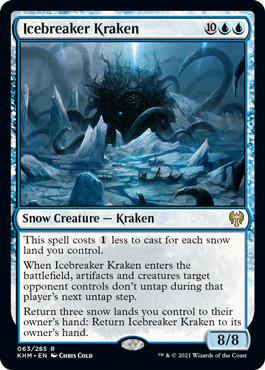
Icebreaker Kraken
{10}{U}{U}
Snow Creature — Kraken
8/8
This spell costs {1} less to cast for each snow land you control.
When Icebreaker Kraken enters the battlefield, artifacts and creatures target opponent controls don't untap during that player's next untap step.
Return three snow lands you control to their owner's hand: Return Icebreaker Kraken to its owner's hand.
- To determine the total cost of a spell, start with the mana cost or alternative cost you're paying, add any cost increases, then apply any cost reductions (such as that of Icebreaker Kraken). The converted mana cost of the spell is determined only by its mana cost, no matter what the total cost to cast the spell was.
- Icebreaker Kraken's enters-the-battlefield ability won't tap any artifacts or creatures.
- No artifacts or creatures controlled by the player affected by Icebreaker Kraken's enters-the-battlefield ability will untap during that player's next untap step, even if they were untapped as the ability resolved or that player didn't control them at that time.
- Once you announce that you're activating the last ability, no player may take actions until the ability has been paid for. Notably, opponents can't try to stop you from activating it by removing your snow lands.

Icehide Troll
{2}{G}
Snow Creature — Troll Warrior
2/3
{S}{S}: Icehide Troll gets +2/+0 and gains indestructible until end of turn. Tap it. (Damage and effects that say "destroy" don't destroy it. {S} can be paid with one mana from a snow source.)
- You can activate Icehide Troll's last ability even if it's already tapped.
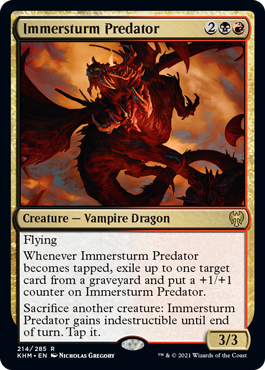
Immersturm Predator
{2}{B}{R}
Creature — Vampire Dragon
3/3
Flying
Whenever Immersturm Predator becomes tapped, exile up to one target card from a graveyard and put a +1/+1 counter on Immersturm Predator.
Sacrifice another creature: Immersturm Predator gains indestructible until end of turn. Tap it.
- Immersturm Predator's triggered ability doesn't allow you to tap Immersturm Predator. You have to find some other way to tap it. Let us suggest attacking.
- For the triggered ability to trigger, Immersturm Predator has to actually change from untapped to tapped. If an effect attempts to tap it while it is already tapped, the ability won't trigger.
- You can put the triggered ability on the stack without a target. As it resolves, you'll just put a +1/+1 counter on Immersturm Predator. However, if you do choose a target, and that card is an illegal target as the ability tries to resolve, the ability won't resolve and none of its effects will happen. In that case, you won't put a +1/+1 counter on Immersturm Predator.
- You can activate Immersturm Predator's last ability even if it's already tapped.
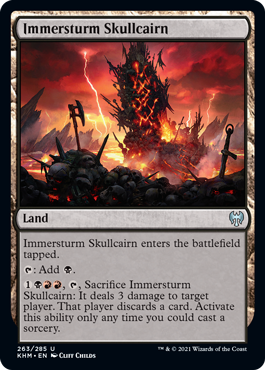
Immersturm Skullcairn
Land
Immersturm Skullcairn enters the battlefield tapped.
{T}: Add {B}.
{1}{B}{R}{R}, {T}, Sacrifice Immersturm Skullcairn: It deals 3 damage to target player. That player discards a card. Activate this ability only any time you could cast a sorcery.
- If the target player is an illegal target as the last activated ability tries to resolve, that ability won't resolve and none of its effects will happen. No damage will be dealt, and that player won't discard a card.
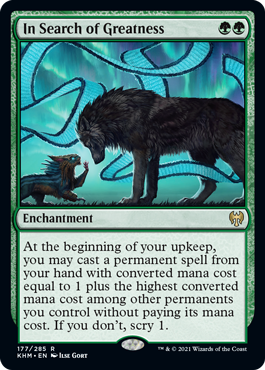
In Search of Greatness
{G}{G}
Enchantment
At the beginning of your upkeep, you may cast a permanent spell from your hand with converted mana cost equal to 1 plus the highest converted mana cost among other permanents you control without paying its mana cost. If you don't, scry 1.
- A permanent spell is an artifact spell, a creature spell, an enchantment spell, or a planeswalker spell.
- Consider the other permanents you control as the triggered ability resolves to determine which spell you can cast. If the only other permanents you control are lands, or in the unlikely event you don't control any other permanents, you may cast a permanent spell with converted mana cost 1 from your hand.
- If you cast a spell "without paying its mana cost," you can't choose to cast it for any alternative costs. You can, however, pay additional costs, such as kicker costs. If the card has any mandatory additional costs, those must be paid to cast the spell.
- If a permanent has {X} in its mana cost, X is considered to be 0.
- If the spell you cast has {X} in its mana cost, you must choose 0 as the value of X.
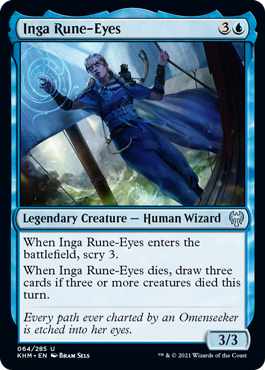
Inga Rune-Eyes
{3}{U}
Legendary Creature — Human Wizard
3/3
When Inga Rune-Eyes enters the battlefield, scry 3.
When Inga Rune-Eyes dies, draw three cards if three or more creatures died this turn.
- The number of creatures that have died that turn is checked as the last ability resolves. Inga Rune-Eyes will count, as will creatures that die at the same time as Inga Rune-Eyes and creatures that die while that ability is on the stack but has not yet resolved.
- The last ability will count any creature that died, no matter who controlled it.
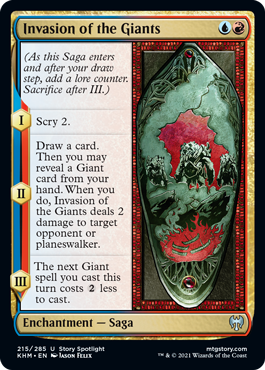
Invasion of the Giants
{U}{R}
Enchantment — Saga
(As this Saga enters and after your draw step, add a lore counter. Sacrifice after III.)
I — Scry 2.
II — Draw a card. Then you may reveal a Giant card from your hand. When you do, Invasion of the Giants deals 2 damage to target opponent or planeswalker.
III — The next Giant spell you cast this turn costs {2} less to cast.
- The chapter II ability goes on the stack without a target. You choose whether to reveal a Giant card from your hand after you have drawn a card. When you do, the reflexive triggered ability triggers. This is different than effects that say "If you do" in that players can respond after you've revealed the Giant card but before damage is dealt.
- To determine the total cost of a spell, start with the mana cost or alternative cost you're paying, add any cost increases, then apply any cost reductions (such as that of the effect of the chapter III ability). The converted mana cost of the spell is determined only by its mana cost, no matter what the total cost to cast the spell was.
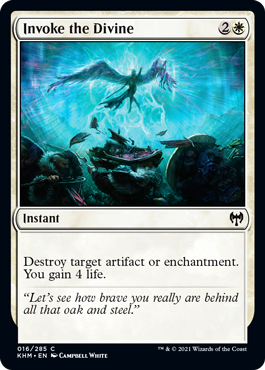
Invoke the Divine
{2}{W}
Instant
Destroy target artifact or enchantment. You gain 4 life.
- If the target artifact or enchantment is an illegal target as Invoke the Divine tries to resolve, it won't resolve and none of its effects will happen. You won't gain 4 life.
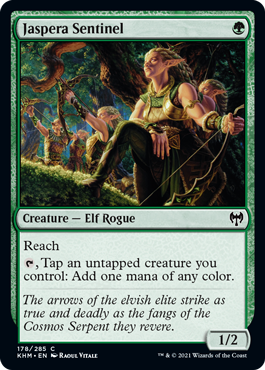
Jaspera Sentinel
{G}
Creature — Elf Rogue
1/2
Reach
{T}, Tap an untapped creature you control: Add one mana of any color.
- You can tap any untapped creature you control, including one you haven't controlled continuously since the beginning of your most recent turn, to pay the cost of Jaspera Sentinel's activated ability. You must have controlled Jaspera Sentinel continuously since the beginning of your most recent turn, however.
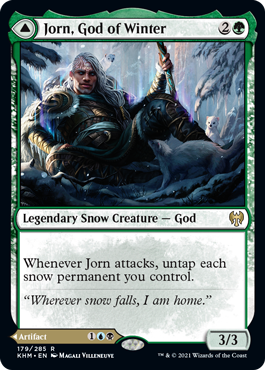
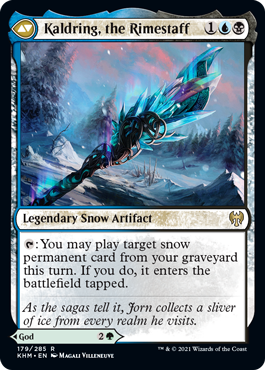
Jorn, God of Winter
{2}{G}
Legendary Snow Creature — God
3/3
Whenever Jorn attacks, untap each snow permanent you control.
/////
Kaldring, the Rimestaff
{1}{U}{B}
Legendary Snow Artifact
{T}: You may play target snow permanent card from your graveyard this turn. If you do, it enters the battlefield tapped.
- Jorn's triggered ability will untap Jorn itself.
- A snow permanent card is any artifact, creature, enchantment, land, or planeswalker card with the supertype snow.
- You don't play the card as Kaldring's activated ability is resolving; rather, that ability gives you permission to play that card that turn. You must follow the normal timing permissions and restrictions for the card when you play it. To play a land this way, you must have a land play available. Notably, if you activate Kaldring's ability during an opponent's turn, you won't be able to cast a spell that way unless it has flash and you won't be able to play a land that way at all.
- You'll still pay all costs to cast a spell this way, including any additional costs. You may also pay alternative costs if any are available.
- Even though you may play the card, it isn't in your hand, so you can't, for example, discard it or foretell it.
- If you don't end up playing the card, it remains in your graveyard. You can't play it on future turns unless you target it again with Kaldring's ability (or something else lets you play it).
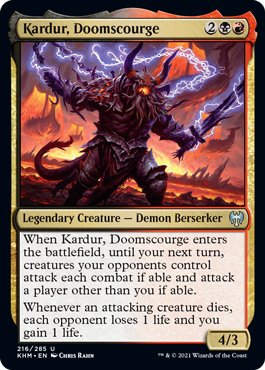
Kardur, Doomscourge
{2}{B}{R}
Legendary Creature — Demon Berserker
4/3
When Kardur, Doomscourge enters the battlefield, until your next turn, creatures your opponents control attack each combat if able and attack a player other than you if able.
Whenever an attacking creature dies, each opponent loses 1 life and you gain 1 life.
- Kardur's first ability affects all creatures your opponents control, including any that enter the battlefield after the ability resolves.
- If a creature an opponent controls can't attack for some reason (such as being tapped or having come under its controller's control that turn), then it doesn't attack. If there's a cost associated with having it attack, its controller isn't forced to pay that cost, so the creature doesn't have to attack in that case either.
- If a creature an opponent controls doesn't qualify for any of the above exceptions and can attack, it must attack a player other than you if able. If the creature can't attack any of those players, or if there are no such players, it must attack you or an opposing planeswalker.
- If a creature affected by Kardur's ability could legally attack multiple players and/or planeswalkers, its controller chooses who it attacks.
- Kardur's last ability will trigger no matter who controlled the attacking creature and no matter who it was attacking.
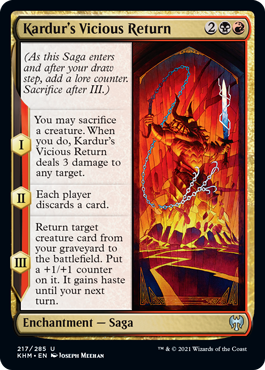
Kardur's Vicious Return
{2}{B}{R}
Enchantment — Saga
(As this Saga enters and after your draw step, add a lore counter. Sacrifice after III.)
I — You may sacrifice a creature. When you do, Kardur's Vicious Return deals 3 damage to any target.
II — Each player discards a card.
III — Return target creature card from your graveyard to the battlefield. Put a +1/+1 counter on it. It gains haste until your next turn.
- The chapter I ability goes on the stack without a target. While that ability is resolving, you may sacrifice a creature. When you do, the reflexive triggered ability triggers and you pick a target to be dealt damage. This is different than effects that say "If you do" in that players may take actions after you've sacrificed the creature but before damage is dealt.
- As the chapter II ability resolves, first the player whose turn it is chooses a card in hand and sets it aside without revealing it, then each other player in turn order does the same. Then all the chosen cards are discarded at the same time.
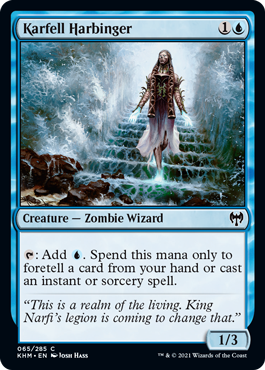
Karfell Harbinger
{1}{U}
Creature — Zombie Wizard
1/3
{T}: Add {U}. Spend this mana only to foretell a card from your hand or cast an instant or sorcery spell.
- The mana can be spent to exile a card with foretell from your hand face down, not to cast the foretold card from exile (unless it's an instant or sorcery spell).
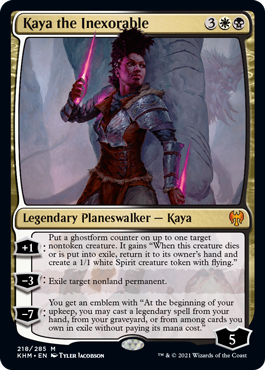
Kaya the Inexorable
{3}{W}{B}
Legendary Planeswalker — Kaya
5
+1: Put a ghostform counter on up to one target nontoken creature. It gains "When this creature dies or is put into exile, return it to its owner's hand and create a 1/1 white Spirit creature token with flying."
−3: Exile target nonland permanent.
−7: You get an emblem with "At the beginning of your upkeep, you may cast a legendary spell from your hand, from your graveyard, or from among cards you own in exile without paying its mana cost."
- The ghostform counter added by the first ability doesn't have any functional importance. It's there to remind you of the ability the creature gains. Even if that counter is removed from the creature, the triggered ability it gains will still work.
- If a nontoken creature gains more than one instance of that triggered ability, each of them will trigger separately. You can return the card to its owner's hand only once, but you'll create a Spirit creature token for each of those abilities.
- If you own a face-down card in exile, Kaya's emblem will let you cast it only if you can look at the card (and only if it's legendary). If you aren't allowed to look at the card, you can't cast it, even if you know it's legendary.
- If you cast a spell "without paying its mana cost," you can't choose to cast it for any alternative costs. You can, however, pay additional costs, such as kicker costs. If the card has any mandatory additional costs, those must be paid to cast the spell.
- If the spell has {X} in its mana cost, you must choose 0 as the value of X.
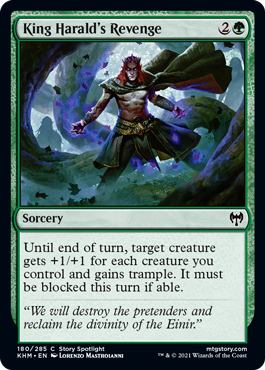
King Harald's Revenge
{2}{G}
Sorcery
Until end of turn, target creature gets +1/+1 for each creature you control and gains trample. It must be blocked this turn if able.
- Use the number of creatures you control as King Harald's Revenge resolves to determine how big the power and toughness boost is.
- If the creature attacks, the defending player must assign at least one blocker to it if that player controls any creatures that could block it. Other creatures may also block it, block other creatures, or not block at all.
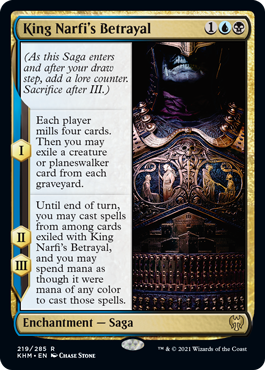
King Narfi's Betrayal
{1}{U}{B}
Enchantment — Saga
(As this Saga enters and after your draw step, add a lore counter. Sacrifice after III.)
I — Each player mills four cards. Then you may exile a creature or planeswalker card from each graveyard.
II, III — Until end of turn, you may cast spells from among cards exiled with King Narfi's Betrayal, and you may spend mana as though it were mana of any color to cast those spells.
- The chapter I ability doesn't target any cards in graveyards. For each graveyard, you may exile a creature or planeswalker card that was just milled or one that was already there. You choose which cards are exiled.
- The chapter II/III ability doesn't change when you can cast the exiled cards. In most cases, this means during your main phase while the stack is empty, although flash may change this.
- If you cast a spell with the chapter II/III ability, it becomes a new object. If it returns to exile, it's no longer exiled with King Narfi's Betrayal, and you won't be able to cast it again this way.
- The "cards exiled with King Narfi's Betrayal" are only the cards exiled by that particular King Narfi's Betrayal, not any other Betrayals that you previously controlled.
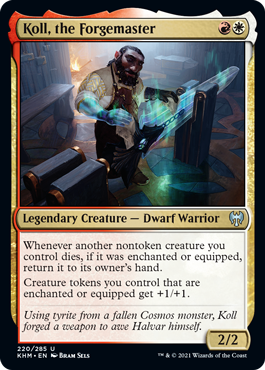
Koll, the Forgemaster
{R}{W}
Legendary Creature — Dwarf Warrior
2/2
Whenever another nontoken creature you control dies, if it was enchanted or equipped, return it to its owner's hand.
Creature tokens you control that are enchanted or equipped get +1/+1.
- A creature token you control is enchanted or equipped if there's an Aura or an Equipment attached to it. You don't have to control that Aura or Equipment.
- A creature token you control that's enchanted or equipped gets only +1/+1 from Koll's last ability, no matter how many Auras and Equipment are attached to that creature.
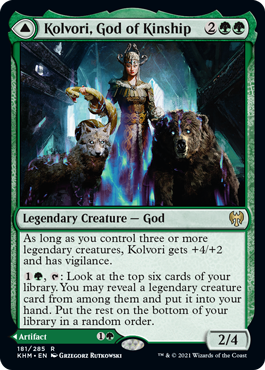
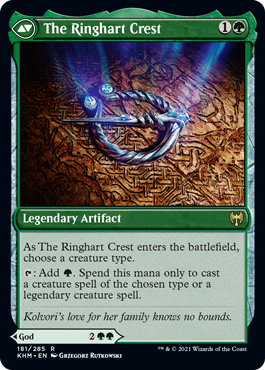
Kolvori, God of Kinship
{2}{G}{G}
Legendary Creature — God
2/4
As long as you control three or more legendary creatures, Kolvori gets +4/+2 and has vigilance.
{1}{G}, {T}: Look at the top six cards of your library. You may reveal a legendary creature card from among them and put it into your hand. Put the rest on the bottom of your library in a random order.
/////
The Ringhart Crest
{1}{G}
Legendary Artifact
As The Ringhart Crest enters the battlefield, choose a creature type.
{T}: Add {G}. Spend this mana only to cast a creature spell of the chosen type or a legendary creature spell.
- Because damage remains marked on creatures until the damage is removed as the turn ends, nonlethal damage dealt to Kolvori may become lethal if you controlled three or more legendary creatures and some of them leave the battlefield that turn.
- For The Ringhart Crest's first ability, you must choose an existing creature type, such as Fungus or Archer. You can't choose card types (e.g., artifact) or supertypes (e.g., snow).
- If The Ringhart Crest is somehow on the battlefield with no choice of creature type, the mana produced by its activated ability can still be spent to cast a legendary creature spell.
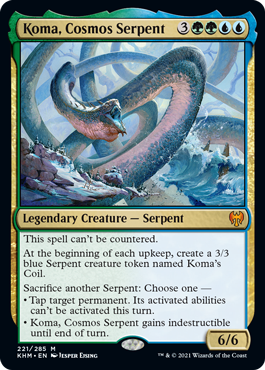
Koma, Cosmos Serpent
{3}{G}{G}{U}{U}
Legendary Creature — Serpent
6/6
This spell can't be countered.
At the beginning of each upkeep, create a 3/3 blue Serpent creature token named Koma's Coil.
Sacrifice another Serpent: Choose one —
• Tap target permanent. Its activated abilities can't be activated this turn.
• Koma, Cosmos Serpent gains indestructible until end of turn.
- A spell or ability that counters spells can still target Koma, Cosmos Serpent. When that spell or ability resolves, Koma won't be countered, but any additional effects of the countering spell or ability will still happen.
- Activated abilities contain a colon and appear in the form "[Cost]: [Effect]." Some keywords such as equip are activated abilities and will have colons in their reminder texts. Loyalty abilities of planeswalkers are also activated abilities.
- You can't sacrifice Koma itself to activate its last ability, but you can sacrifice any other Serpent you control, including Koma's Coil.
- If you choose the first mode of Koma's activated ability, you can choose a permanent that's already tapped as the target. The effect stopping its activated abilities will still apply.
- The first mode of Koma's activated ability doesn't stop static abilities from affecting the game, and it doesn't stop triggered abilities from triggering. Unlike similar effects, it does stop mana abilities from being activated. Most activated abilities that produce mana as they resolve are mana abilities.
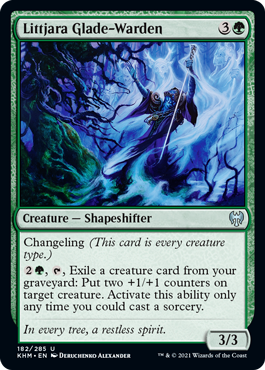
Littjara Glade-Warden
{3}{G}
Creature — Shapeshifter
3/3
Changeling (This card is every creature type.)
{2}{G}, {T}, Exile a creature card from your graveyard: Put two +1/+1 counters on target creature. Activate this ability only any time you could cast a sorcery.
- Once you announce that you're activating the activated ability, no player may take actions until the ability has been paid for. Notably, opponents can't try to remove creature cards from your graveyard to stop you from activating the ability.
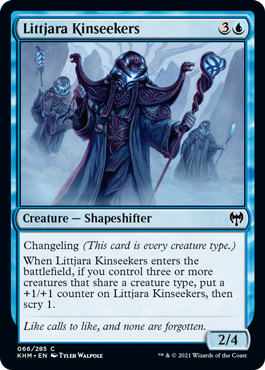
Littjara Kinseekers
{3}{U}
Creature — Shapeshifter
2/4
Changeling (This card is every creature type.)
When Littjara Kinseekers enters the battlefield, if you control three or more creatures that share a creature type, put a +1/+1 counter on Littjara Kinseekers, then scry 1.
- Three creatures share a creature type if there's at least one creature type all three have, no matter what other creature types they have. For example, Littjara Kinseekers (which has all creature types), an Elf Warrior, and an Elf Wizard share a creature type because they're all Elves.
- If you don't control three or more creatures that share a creature type immediately after Littjara Kinseekers enters the battlefield, its ability doesn't trigger. If you don't control three or more as the ability resolves, you won't put a +1/+1 counter on Littjara Kinseekers or scry 1. The three shared-type creatures you control when the ability resolves don't have to be the same three you controlled when the ability triggered.
- You put just one +1/+1 counter on Littjara Kinseekers and scry 1, no matter how many extra trios of creatures that share a creature type you control.
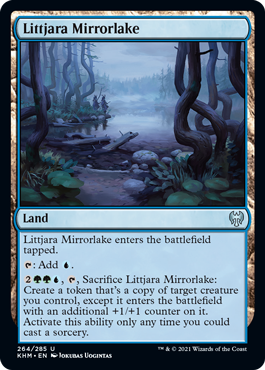
Littjara Mirrorlake
Land
Littjara Mirrorlake enters the battlefield tapped.
{T}: Add {U}.
{2}{G}{G}{U}, {T}, Sacrifice Littjara Mirrorlake: Create a token that's a copy of target creature you control, except it enters the battlefield with an additional +1/+1 counter on it. Activate this ability only any time you could cast a sorcery.
- The token copies exactly what is printed on the creature and nothing else (unless that creature is a token or is copying something else; see below). The token doesn't copy whether that creature is tapped or untapped, whether it has any counters on it, whether it has any Auras and/or Equipment attached to it, or any non-copy effects that changed its power, toughness, types, color, and so on.
- If the target creature is itself a token, the token created by Littjara Mirrorlake's ability copies the original characteristics of that token as stated by the effect that created it.
- If the target creature is copying something else, the token you create will use the copiable values of the target creature. In most cases, it will be a copy of whatever the target creature is copying. If it's copying a permanent or card with {X} in its mana cost, X is 0.
- If the copied creature has {X} in its mana cost, X is 0.
- Any enters-the-battlefield abilities of the copied creature will trigger when the token enters the battlefield. Any "As [this creature] enters the battlefield" or "[This creature] enters the battlefield with" abilities of the copied creature will also work.
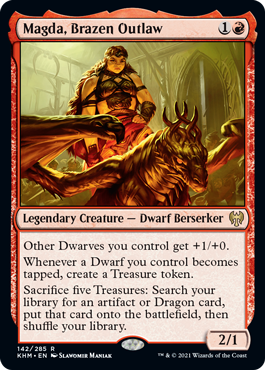
Magda, Brazen Outlaw
{1}{R}
Legendary Creature — Dwarf Berserker
2/1
Other Dwarves you control get +1/+0.
Whenever a Dwarf you control becomes tapped, create a Treasure token.
Sacrifice five Treasures: Search your library for an artifact or Dragon card, put that card onto the battlefield, then shuffle your library.
- Magda's triggered ability doesn't allow you to tap any Dwarves. You have to find some other way to tap them. Attacking is still a great way to go.
- For the triggered ability to trigger, a Dwarf you control has to actually change from untapped to tapped. If an effect attempts to tap a Dwarf you control while it is already tapped, the ability won't trigger.
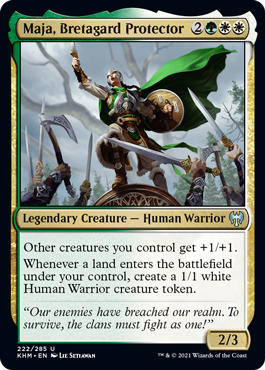
Maja, Bretagard Protector
{2}{G}{W}{W}
Legendary Creature — Human Warrior
2/3
Other creatures you control get +1/+1.
Whenever a land enters the battlefield under your control, create a 1/1 white Human Warrior creature token.
- Because damage remains marked on creatures until the damage is removed as the turn ends, nonlethal damage dealt to creatures you control may become lethal if Maja, Bretagard Protector leaves the battlefield that turn.
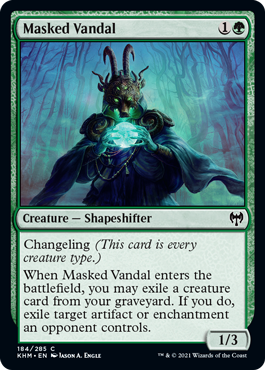
Masked Vandal
{1}{G}
Creature — Shapeshifter
1/3
Changeling (This card is every creature type.)
When Masked Vandal enters the battlefield, you may exile a creature card from your graveyard. If you do, exile target artifact or enchantment an opponent controls.
- You choose the target artifact or enchantment an opponent controls as you put the triggered ability on the stack. Once the ability starts resolving, you choose which creature card to exile from your graveyard, if any. At that point, no one can respond to your choice or take any actions until the ability is finished resolving.
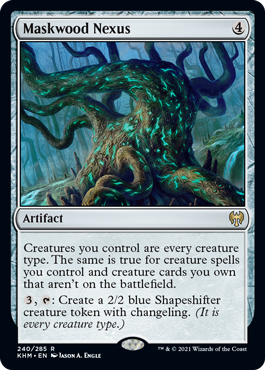
Maskwood Nexus
{4}
Artifact
Creatures you control are every creature type. The same is true for creature spells you control and creature cards you own that aren't on the battlefield.
{3}, {T}: Create a 2/2 blue Shapeshifter creature token with changeling. (It is every creature type.)
- Replacement effects that modify how creatures of a certain creature type enter the battlefield will apply after you apply the effect of Maskwood Nexus. For example, if you control Maskwood Nexus and an effect says that each Warrior you control enters the battlefield with an additional +1/+1 counter on it, any creature that enters the battlefield under your control will get that counter.
- The tokens created by the activated ability will continue to have all creature types if Maskwood Nexus leaves the battlefield because those tokens have changeling. Other creatures you control will revert to their usual creature types unless another relevant effect is affecting them.
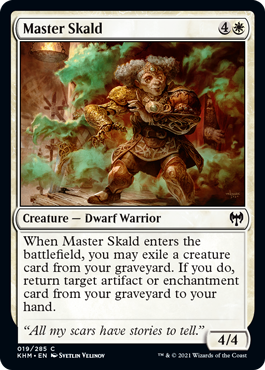
Master Skald
{4}{W}
Creature — Dwarf Warrior
4/4
When Master Skald enters the battlefield, you may exile a creature card from your graveyard. If you do, return target artifact or enchantment card from your graveyard to your hand.
- You choose the target artifact or enchantment card in your graveyard as you put the triggered ability on the stack. Once the ability starts resolving, you choose which creature card to exile from your graveyard, if any. At that point, no one can respond to your choice or take any actions until the ability is finished resolving.
- If you choose an artifact creature card or an enchantment creature card in your graveyard as the target, you could exile that card as the triggered ability is resolving, but if you do, you won't return it to your hand.
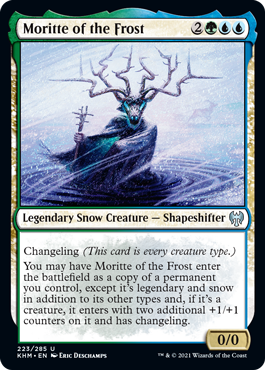
Moritte of the Frost
{2}{G}{U}{U}
Legendary Snow Creature — Shapeshifter
0/0
Changeling (This card is every creature type.)
You may have Moritte of the Frost enter the battlefield as a copy of a permanent you control, except it's legendary and snow in addition to its other types and, if it's a creature, it enters with two additional +1/+1 counters on it and has changeling.
- Moritte copies exactly what was printed on the original permanent (unless that permanent is copying something else or is a token; see below). It doesn't copy whether that permanent is tapped or untapped, whether it has any counters on it, whether it has any Auras and/or Equipment attached to it, or any non-copy effects that changed its power, toughness, types, color, and so on.
- If Moritte copies a nonlegendary permanent, you'll control two permanents with same name, but only one of them (Moritte) will be legendary. You won't put any of them into their owner's graveyard.
- If the chosen permanent has {X} in its mana cost, X is considered to be 0.
- If the chosen permanent is a token, Moritte copies the original characteristics of that token as stated by the effect that created the token. Moritte doesn't become a token in this case.
- If the chosen permanent is copying something else, Moritte will use the copiable values of the chosen permanent. In most cases, it will be a copy of whatever the chosen permanent is copying. If it's copying a permanent or card with {X} in its mana cost, X is 0.
- Any enters-the-battlefield abilities of the copied permanent will trigger when Moritte enters the battlefield. Any "as [this permanent] enters the battlefield" or "[this permanent] enters the battlefield with" abilities of the chosen permanent will also work.
- If Moritte copies a creature, it enters with two +1/+1 counters on it, plus any counters that will be put on it by abilities it copied or abilities of other objects.
- If the copied permanent is affected by a type-changing effect, Moritte may enter the battlefield with different permanent types than the copied permanent currently has. Use the characteristics of Moritte as it enters the battlefield, not of the copied permanent, to determine whether it enters with an additional counter on it. Notably, if Moritte copies a permanent that's normally not a creature but has been made a creature by another effect, Moritte enters as a noncreature permanent that doesn't get +1/+1 counters or have changeling.
- If Moritte somehow enters the battlefield at the same time as another permanent, it can't become a copy of that permanent. You may choose only a permanent that's already on the battlefield.
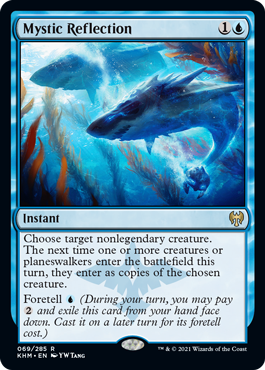
Mystic Reflection
{1}{U}
Instant
Choose target nonlegendary creature. The next time one or more creatures or planeswalkers enter the battlefield this turn, they enter as copies of the chosen creature.
Foretell {U} (During your turn, you may pay {2} and exile this card from your hand face down. Cast it on a later turn for its foretell cost.)
- In most cases, the copiable values of the target creature won't change between Mystic Reflection resolving and the next time one or more creatures or planeswalkers enter the battlefield. In some unusual cases, they might, and if they do, use the copiable values of the creature at the time the permanents enter the battlefield.
- If Mystic Reflection resolves, but the target creature leaves the battlefield before the next time one or more creatures or planeswalkers enter the battlefield, use the copiable values of the target creature as it last existed on the battlefield to determine what the entering permanents copy.
- The entering permanents don't copy whether the target creature is tapped or untapped, whether it has any counters on it, whether it has any Auras and/or Equipment attached to it, or any non-copy effects that changed its power, toughness, types, color, and so on.
- Any enters-the-battlefield abilities of the copied creature will trigger when the permanents enter the battlefield. Any "as [this permanent] enters the battlefield" or "[this permanent] enters the battlefield with" abilities of the target creature will also work.
- Replacement effects that modify how a creature enters the battlefield are applied in the following order: first, control-changing effects (such as Gather Specimens), then copy effects (such as the abilities of Mystic Reflection and Clone), then all other effects.
- If a creature such as Clone is entering the battlefield under your control, there will be two copy effects to apply: the creature's own and Mystic Reflection's. No matter which order these effects are applied in, the creature will be a copy of the target creature when it enters the battlefield.
- Other enters-the-battlefield replacement abilities printed on the creatures entering the battlefield won't be applied because those permanents will already be copies of the target creature at that point (and therefore they won't have those abilities). External abilities may still affect how those permanents enter the battlefield. For example, if another effect says, "Creatures enter the battlefield tapped," the permanents will enter as tapped copies of the target creature.
- If more than one Mystic Reflection applies to the same permanent entering the battlefield, the controller of that permanent chooses the order of those copy effects. The copy effect they apply last will determine which creature the entering permanent copies.
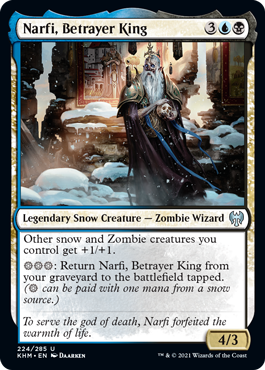
Narfi, Betrayer King
{3}{U}{B}
Legendary Snow Creature — Zombie Wizard
4/3
Other snow and Zombie creatures you control get +1/+1.
{S}{S}{S}: Return Narfi, Betrayer King from your graveyard to the battlefield tapped. ({S} can be paid with one mana from a snow source.)
- Another snow Zombie creature you control will get only +1/+1 from Narfi's first ability.
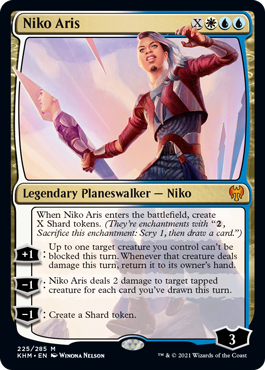
Niko Aris
{X}{W}{U}{U}
Legendary Planeswalker — Niko
3
When Niko Aris enters the battlefield, create X Shard tokens. (They're enchantments with "{2}, Sacrifice this enchantment: Scry 1, then draw a card.")
+1: Up to one target creature you control can't be blocked this turn. Whenever that creature deals damage this turn, return it to its owner's hand.
−1: Niko Aris deals 2 damage to target tapped creature for each card you've drawn this turn.
−1: Create a Shard token.
- Shard is a new predefined token, similar to Food and Treasure. A Shard token is a colorless enchantment with "{2}, Sacrifice this enchantment: Scry 1, then draw a card." Shard is a new enchantment subtype.
- If Niko Aris enters the battlefield without being cast, they were cast for a cost other than their mana cost, or if X was chosen to be 0, the enters-the-battlefield ability won't create any Shard tokens.
- The delayed triggered ability created by Niko's first loyalty ability will trigger whenever the target creature deals any damage that turn, not just combat damage.
- Niko deals all the damage for their second ability at the same time. For example, if you've drawn two cards this turn, Niko will deal 4 damage to the target tapped creature; they won't deal 2 damage, then deal 2 more damage.
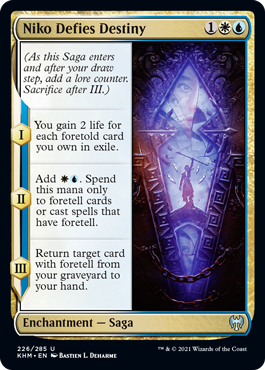
Niko Defies Destiny
{1}{W}{U}
Enchantment — Saga
(As this Saga enters and after your draw step, add a lore counter. Sacrifice after III.)
I — You gain 2 life for each foretold card you own in exile.
II — Add {W}{U}. Spend this mana only to foretell cards or cast spells that have foretell.
III — Return target card with foretell from your graveyard to your hand.
- The mana added by the chapter II ability can be spent to cast a spell that has foretell no matter where you're casting it from. It doesn't have to be a foretold card you're casting from exile.
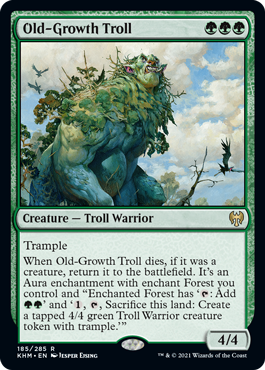
Old-Growth Troll
{G}{G}{G}
Creature — Troll Warrior
4/4
Trample
When Old-Growth Troll dies, if it was a creature, return it to the battlefield. It's an Aura enchantment with enchant Forest you control and "Enchanted Forest has '{T}: Add {G}{G}' and '{1}, {T}, Sacrifice this land: Create a tapped 4/4 green Troll Warrior creature token with trample.'"
- If you control but don't own Old-Growth Troll, you (not its owner) will return it to the battlefield when it dies. You'll choose which Forest you control it will enchant as it returns to the battlefield.
- If there's nothing for Old-Growth Troll to legally enchant, it remains in its owner's graveyard.
- If a token is a copy of Old-Growth Troll, it won't return from its owner's graveyard.
- If a nontoken permanent that's a copy of Old-Growth Troll dies while it is a creature, it will return to the battlefield as an Aura with both its own normal abilities and the two new abilities granted by old-Growth Troll. The resulting permanent will also retain its name, colors, and supertypes, but it will be an Aura enchantment with no other types or subtypes.
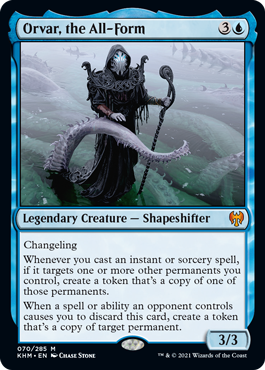
Orvar, the All-Form
{3}{U}
Legendary Creature — Shapeshifter
3/3
Changeling
Whenever you cast an instant or sorcery spell, if it targets one or more other permanents you control, create a token that's a copy of one of those permanents.
When a spell or ability an opponent controls causes you to discard this card, create a token that's a copy of target permanent.
- Orvar's first triggered ability resolves (if it resolves; see below) before the spell or ability that caused it to trigger.
- For the first triggered ability, the instant or sorcery spell can target other things if it also targets one or more permanents you control; however, the token you create can copy only permanents you control that are targets of the spell. If the spell targets more than one permanent you control, you choose which permanent the token is copying as you create the token.
- As the first triggered ability tries to resolve, the spell that caused it to trigger and that spell's targets are checked again. Ignore any target of the spell that has left the battlefield by that point. If all of the permanents you controlled that were targets have left the battlefield by that point, the triggered ability will do nothing and no token will be created. If at least one permanent you control that's a target is still on the battlefield, the triggered ability will resolve, even if that permanent is now an illegal target for the spell.
- If the spell itself has left the stack by that point, use the targets it had when it left the stack to perform the check described above.
- For the second triggered ability, you can choose any permanent as the target, regardless of who controls it.
- The token copies exactly what is printed on the permanent and nothing else (unless that permanent is a token or is copying something else; see below). It doesn't copy whether that permanent is tapped or untapped, whether it has any counters on it, whether it has any Auras and/or Equipment attached to it, or any non-copy effects that changed its power, toughness, types, color, and so on.
- If the permanent being copied is itself a token, the token created by the last ability copies the original characteristics of that token as stated by the effect that created it.
- If the permanent being copied is copying something else, the token you create will use the copiable values of the that permanent. In most cases, it will be a copy of whatever the permanent is copying. If it's copying a permanent or card with {X} in its mana cost, X is 0.
- If the permanent being copied has {X} in its mana cost, X is 0.
- Any enters-the-battlefield abilities of the copied permanent will trigger when the token enters the battlefield. Any "As [this permanent] enters the battlefield" or "[This permanent] enters the battlefield with" abilities of the copied permanent will also work.
- If a spell or ability an opponent controls allows or instructs you to choose a card to discard, and you discard Orvar, its last ability will trigger.
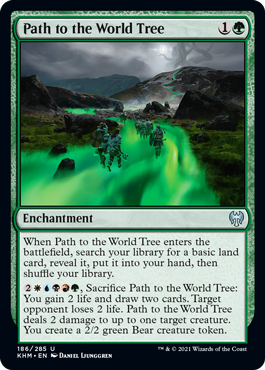
Path to the World Tree
{1}{G}
Enchantment
When Path to the World Tree enters the battlefield, search your library for a basic land card, reveal it, put it into your hand, then shuffle your library.
{2}{W}{U}{B}{R}{G}, Sacrifice Path to the World Tree: You gain 2 life and draw two cards. Target opponent loses 2 life. Path to the World Tree deals 2 damage to up to one target creature. You create a 2/2 green Bear creature token.
- The last ability of Path to the World Tree always targets an opponent and may target a creature. As the ability tries to resolve, if all its targets are illegal, the ability won't resolve and none of its effects will happen. You won't do any of the cool stuff that ability tells you to do.
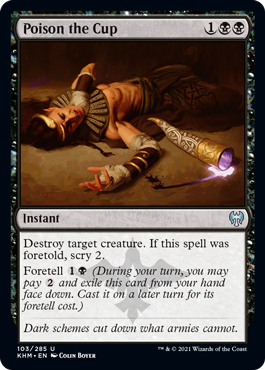
Poison the Cup
{1}{B}{B}
Instant
Destroy target creature. If this spell was foretold, scry 2.
Foretell {1}{B} (During your turn, you may pay {2} and exile this card from your hand face down. Cast it on a later turn for its foretell cost.)
- If the target creature is an illegal target as Poison the Cup tries to resolve, it won't resolve and none of its effects will happen. You won't scry 2 if Poison the Cup was foretold.
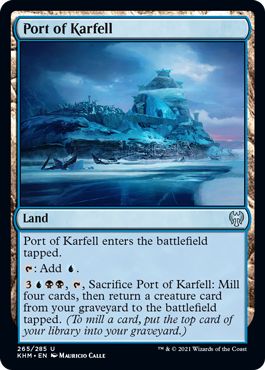
Port of Karfell
Land
Port of Karfell enters the battlefield tapped.
{T}: Add {U}.
{3}{U}{B}{B}, {T}, Sacrifice Port of Karfell: Mill four cards, then return a creature card from your graveyard to the battlefield tapped. (To mill a card, put the top card of your library into your graveyard.)
- The last activated ability doesn't target any creature cards in graveyards. You may return a creature card that was just milled or one that was already there.
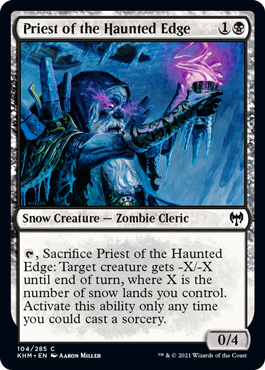
Priest of the Haunted Edge
{1}{B}
Snow Creature — Zombie Cleric
0/4
{T}, Sacrifice Priest of the Haunted Edge: Target creature gets -X/-X until end of turn, where X is the number of snow lands you control. Activate this ability only any time you could cast a sorcery.
- Use the number of snow lands you control as the ability resolves to determine the value of X.
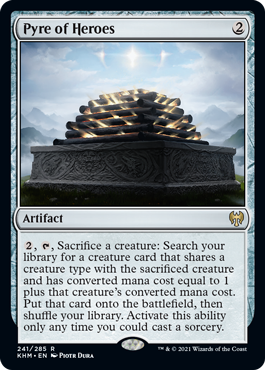
Pyre of Heroes
{2}
Artifact
{2}, {T}, Sacrifice a creature: Search your library for a creature card that shares a creature type with the sacrificed creature and has converted mana cost equal to 1 plus that creature's converted mana cost. Put that card onto the battlefield, then shuffle your library. Activate this ability only any time you could cast a sorcery.
- Use the creature types and converted mana cost of the creature you sacrificed as it existed on the battlefield to determine what creature card you can find. Notably, if you sacrifice a creature that's a double-faced permanent with its back face up, you'll use the characteristics of the back face, not the front face.
- If a permanent or a card in a library has {X} in its mana cost, X is considered to be 0.
- Once you announce that you're activating the activated ability, no player may take actions until the ability has been paid for. Notably, opponents can't try to remove one of your creatures to stop you from sacrificing it.
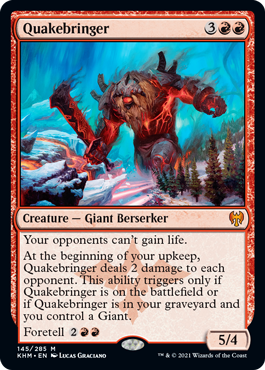
Quakebringer
{3}{R}{R}
Creature — Giant Berserker
5/4
Your opponents can't gain life.
At the beginning of your upkeep, Quakebringer deals 2 damage to each opponent. This ability triggers only if Quakebringer is on the battlefield or if Quakebringer is in your graveyard and you control a Giant.
Foretell {2}{R}{R}
- Quakebringer entering the battlefield won't undo any life gained earlier in the turn.
- If Quakebringer is on the battlefield at the beginning of your upkeep, its ability will trigger even if it's no longer a Giant and you don't control another Giant.
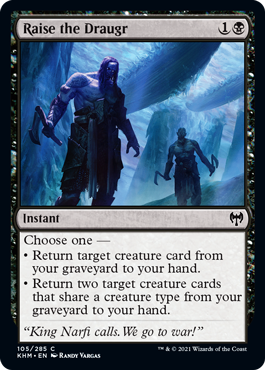
Raise the Draugr
{1}{B}
Instant
Choose one —
• Return target creature card from your graveyard to your hand.
• Return two target creature cards that share a creature type from your graveyard to your hand.
- If you choose the second mode, the cards must share at least one creature type, such as Knight or Djinn. Card types (e.g., artifact) and supertypes (e.g., legendary or snow) aren't creature types.
- If you choose the second mode and one of the two cards leaves your graveyard, you'll still return the other card to your hand as long as it has a creature type that the other card had as it left your graveyard.
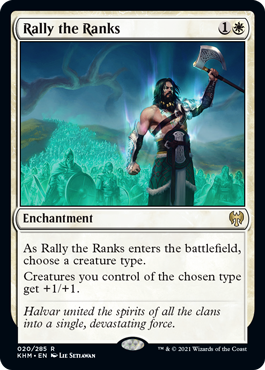
Rally the Ranks
{1}{W}
Enchantment
As Rally the Ranks enters the battlefield, choose a creature type.
Creatures you control of the chosen type get +1/+1.
- You must choose an existing creature type, such as Hippo or Hellion. You can't choose card types (e.g., artifact) or supertypes (e.g., snow).
- Because damage remains marked on creatures until the damage is removed as the turn ends, nonlethal damage dealt to creatures you control may become lethal if Rally the Ranks leaves the battlefield that turn.
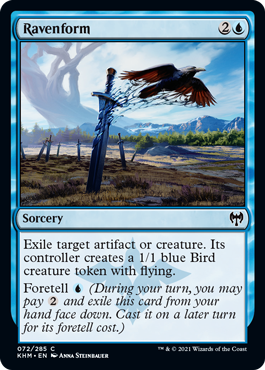
Ravenform
{2}{U}
Sorcery
Exile target artifact or creature. Its controller creates a 1/1 blue Bird creature token with flying.
Foretell {U} (During your turn, you may pay {2} and exile this card from your hand face down. Cast it on a later turn for its foretell cost.)
- If the target artifact or creature is an illegal target as Ravenform tries to resolve, it won't resolve and none of its effects will happen. No player will create a Bird creature token.
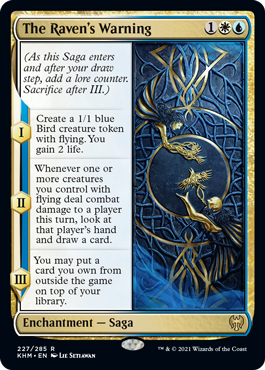
The Raven's Warning
{1}{W}{U}
Enchantment — Saga
(As this Saga enters and after your draw step, add a lore counter. Sacrifice after III.)
I — Create a 1/1 blue Bird creature token with flying. You gain 2 life.
II — Whenever one or more creatures you control with flying deal combat damage to a player this turn, look at that player's hand and draw a card.
III — You may put a card you own from outside the game on top of your library.
- You don't have to reveal the card you bring into the game via the chapter III ability.
- In a casual game, a card from outside the game comes from your personal collection. In a game played under tournament rules, a card from outside the game comes from your sideboard. You may look at your sideboard at any time.
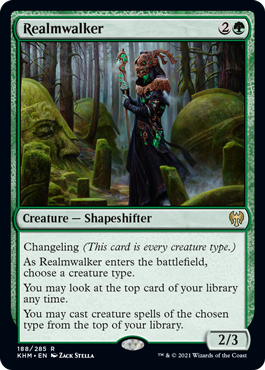
Realmwalker
{2}{G}
Creature — Shapeshifter
2/3
Changeling (This card is every creature type.)
As Realmwalker enters the battlefield, choose a creature type.
You may look at the top card of your library any time.
You may cast creature spells of the chosen type from the top of your library.
- You must choose an existing creature type, such as Elk or Advisor. You can't choose card types (e.g., artifact) or supertypes (e.g., snow).
- If Realmwalker is somehow on the battlefield with no choice having been made for it, you may still look at the top card of your library any time. You won't be able to cast any creature spells from the top of your library, even if they have no creature types.
- You can look at the top card of your library whenever you want (with one restriction; see below), even if you don't have priority. This action doesn't use the stack. Knowing what that card is becomes part of the information you have access to, just like you can look at the cards in your hand.
- If the top card of your library changes while you're casting a spell, playing a land, or activating an ability, you can't look at the new top card until you finish doing so. This means that if you cast a spell from the top of your library, you can't look at the next one until you're done paying for that spell.
- Realmwalker doesn't change when you can cast creature spells. Normally, this means during your main phase when the stack is empty, although flash may change this.
- You'll still pay all costs for the spell, including additional costs. You may also pay alternative costs if any are available.
- The top card of your library isn't in your hand, so you can't foretell it, discard it, or activate any of its activated abilities.
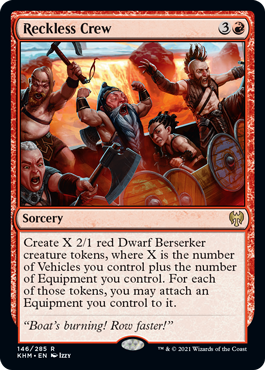
Reckless Crew
{3}{R}
Sorcery
Create X 2/1 red Dwarf Berserker creature tokens, where X is the number of Vehicles you control plus the number of Equipment you control. For each of those tokens, you may attach an Equipment you control to it.
- Count the number of Vehicles and Equipment you control as Reckless Crew resolves to determine how many Dwarf Berserkers to create.
- All Equipment you decide to attach to tokens become attached at the same time.
- You can't have more than one Equipment become attached to the same token.
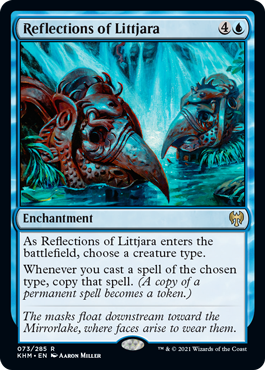
Reflections of Littjara
{4}{U}
Enchantment
As Reflections of Littjara enters the battlefield, choose a creature type.
Whenever you cast a spell of the chosen type, copy that spell. (A copy of a permanent spell becomes a token.)
- You must choose an existing creature type, such as Zombie or Angel. You can't choose card types (e.g., artifact) or supertypes (e.g., snow).
- The triggered ability and the copy it creates will resolve before the spell that caused the ability to trigger.
- As a copy of a permanent spell resolves, it's put onto the battlefield as a token rather than putting a copy of the spell onto the battlefield. The rules that apply to a permanent spell becoming a permanent apply to a copy of a spell becoming a token.
- The token that a resolving copy of a permanent spell becomes isn't "created." Abilities that refer to a copy being created won't interact with the copy resolving.
- If a spell has the tribal card type and the chosen creature type, Reflections of Littjara will copy it. (Tribal is a card type found on some older cards.)
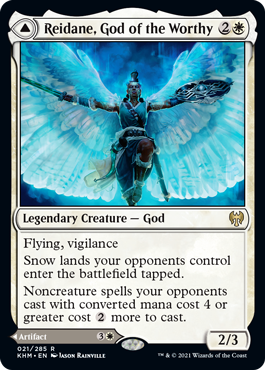
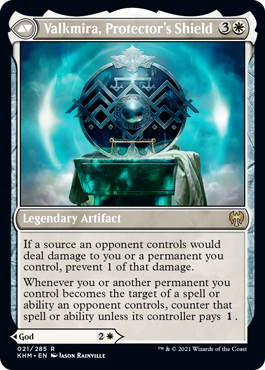
Reidane, God of the Worthy
{2}{W}
Legendary Creature — God
2/3
Flying, vigilance
Snow lands your opponents control enter the battlefield tapped.
Noncreature spells your opponents cast with converted mana cost 4 or greater cost {2} more to cast.
/////
Valkmira, Protector's Shield
{3}{W}
Legendary Artifact
If a source an opponent controls would deal damage to you or a permanent you control, prevent 1 of that damage.
Whenever you or another permanent you control becomes the target of a spell or ability an opponent controls, counter that spell or ability unless its controller pays {1}.
- To determine the total cost of a spell, start with the mana cost or alternative cost you're paying, add any cost increases (such as that of Reidane, God of the Worthy), then apply any cost reductions. The converted mana cost of the spell is determined only by its mana cost, no matter what the total cost to cast the spell was.
- If a spell has {X} in its mana cost, use the value of X to determine whether its converted mana cost is 4 or greater. If it is, Reidane's last ability will apply. If not, it won't.
- Valkmira's first ability prevents 1 damage from each source an opponent controls each time that source would deal damage to you. It prevents 1 of any kind of damage, not just combat damage.
- Valkmira's last ability affects each spell (including Aura spells), activated ability, and triggered ability controlled by an opponent that targets you or another permanent you control.
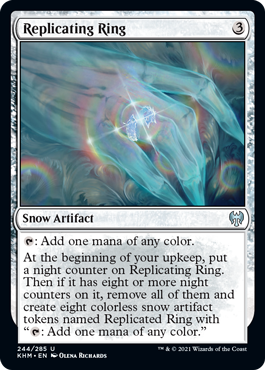
Replicating Ring
{3}
Snow Artifact
{T}: Add one mana of any color.
At the beginning of your upkeep, put a night counter on Replicating Ring. Then if it has eight or more night counters on it, remove all of them and create eight colorless snow artifact tokens named Replicated Ring with "{T}: Add one mana of any color."
- The check of whether Replicating Ring has eight or more night counters on it happens only as part of the resolution of the triggered ability. If Replicating Ring picks up its eighth night counter at another time, you won't immediately create Replicated Rings. You'll have to wait until the next time the triggered ability resolves.
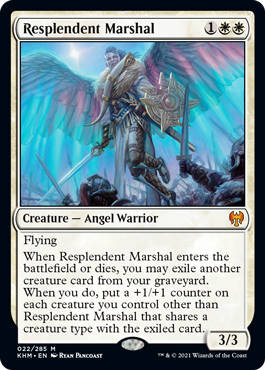
Resplendent Marshal
{1}{W}{W}
Creature — Angel Warrior
3/3
Flying
When Resplendent Marshal enters the battlefield or dies, you may exile another creature card from your graveyard. When you do, put a +1/+1 counter on each creature you control other than Resplendent Marshal that shares a creature type with the exiled card.
- You don't choose which creature card you're exiling, if any, until the triggered ability is resolving. When you do, the reflexive triggered ability triggers. Players may respond to this reflexive triggered ability, knowing the creature types of the card you exiled and which creatures might get a +1/+1 counter. This is different than effects that say "If you do" in that players may take actions after you've exiled another creature card but before putting counters on other creatures you control.
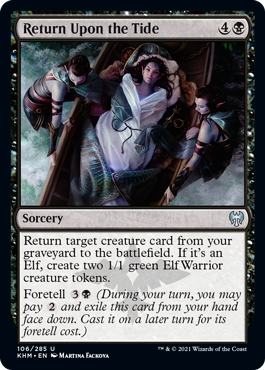
Return Upon the Tide
{4}{B}
Sorcery
Return target creature card from your graveyard to the battlefield. If it's an Elf, create two 1/1 green Elf Warrior creature tokens.
Foretell {3}{B} (During your turn, you may pay {2} and exile this card from your hand face down. Cast it on a later turn for its foretell cost.)
- You check if the creature is an Elf once it's on the battlefield. You'll create tokens if it is, even if the card in the graveyard wasn't an Elf card.
- Players can't take any actions in between the card returning to the battlefield and Elf Warrior tokens being created.
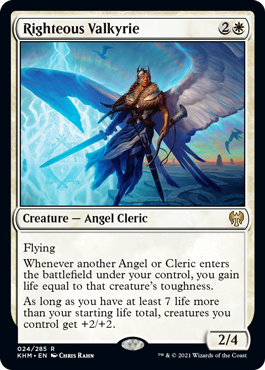
Righteous Valkyrie
{2}{W}
Creature — Angel Cleric
2/4
Flying
Whenever another Angel or Cleric enters the battlefield under your control, you gain life equal to that creature's toughness.
As long as you have at least 7 life more than your starting life total, creatures you control get +2/+2.
- The amount of life you gain is equal to the Angel or Cleric's toughness as the triggered ability resolves. If the Angel or Cleric is no longer on the battlefield at that time, use its toughness from when it was last on the battlefield.
- Because damage remains marked on creatures until the damage is removed as the turn ends, nonlethal damage dealt to creatures you control may become lethal if Righteous Valkyrie leaves the battlefield that turn.
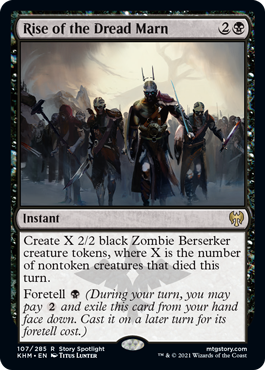
Rise of the Dread Marn
{2}{B}
Instant
Create X 2/2 black Zombie Berserker creature tokens, where X is the number of nontoken creatures that died this turn.
Foretell {B} (During your turn, you may pay {2} and exile this card from your hand face down. Cast it on a later turn for its foretell cost.)
- The number of nontoken creatures that died that turn is counted as Rise of the Dread Marn is resolving. In other words, nontoken creatures that die in response to Rise of the Dread Marn will count.
- It doesn't matter if the cards that represented those creatures are still in the graveyard as Rise of the Dread Marn resolves. They'll still count as long as they died that turn.
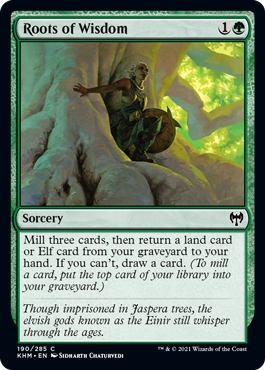
Roots of Wisdom
{1}{G}
Sorcery
Mill three cards, then return a land card or Elf card from your graveyard to your hand. If you can't, draw a card. (To mill a card, put the top card of your library into your graveyard.)
- Roots of Wisdom doesn't target any cards in graveyards. You may return a land card or an Elf card that was just milled or one that was already there.
- If there's a land card or Elf card in your graveyard, you must return one. You can't choose not to in order to draw a card.
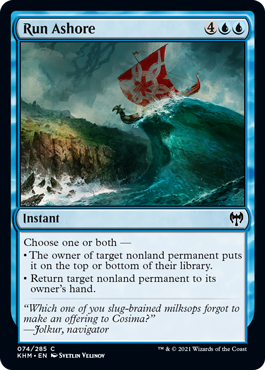
Run Ashore
{4}{U}{U}
Instant
Choose one or both —
• The owner of target nonland permanent puts it on the top or bottom of their library.
• Return target nonland permanent to its owner's hand.
- For the first mode, the owner of the card chooses whether it goes on the top or bottom of that library.
- If you choose both modes, they happen in the listed order and nothing happens in between them. Notably, if the second mode targets an Aura currently enchanting the target of the first mode, that Aura will be returned to its owner's hand. (It wouldn't be put into a graveyard as a state-based action until after Run Ashore is done resolving.)
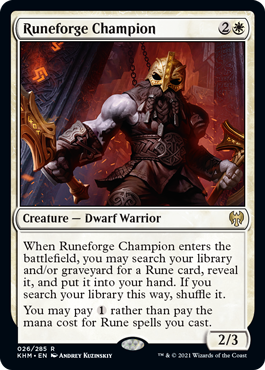
Runeforge Champion
{2}{W}
Creature — Dwarf Warrior
2/3
When Runeforge Champion enters the battlefield, you may search your library and/or graveyard for a Rune card, reveal it, and put it into your hand. If you search your library this way, shuffle it.
You may pay {1} rather than pay the mana cost for Rune spells you cast.
- Runeforge Champion's last ability provides an alternative cost to cast Rune spells. You can't combine this with other alternative costs that may apply. In the unusual case that a Rune spell has additional costs, you can pay those in addition to the {1}. If those additional costs are mandatory, you must pay them in order to cast the spell.
- Runeforge Champion's last ability doesn't change when you can cast a Rune spell.
- Casting a Rune spell for an alternative cost doesn't change its mana cost or converted mana cost.
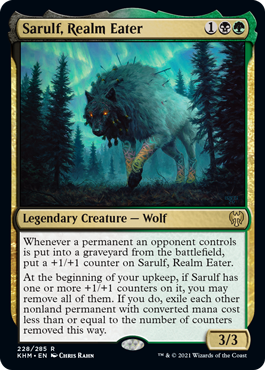
Sarulf, Realm Eater
{1}{B}{G}
Legendary Creature — Wolf
3/3
Whenever a permanent an opponent controls is put into a graveyard from the battlefield, put a +1/+1 counter on Sarulf, Realm Eater.
At the beginning of your upkeep, if Sarulf has one or more +1/+1 counters on it, you may remove all of them. If you do, exile each other nonland permanent with converted mana cost less than or equal to the number of counters removed this way.
- It doesn't matter which graveyard the permanent is put into as long as an opponent controlled it when it last existed on the battlefield.
- If Sarulf doesn't have any +1/+1 counters on it as your upkeep begins, its last ability won't trigger at all. If the ability does trigger, it will check again as it tries to resolve. If Sarulf doesn't have any +1/+1 counters on it at that time, the ability won't do anything. No other permanents will be exiled.
- If Sarulf isn't on the battlefield as its last ability starts to resolve, you can't remove any +1/+1 counters from it, even if it had +1/+1 counters when it was last on the battlefield. No other permanents will be exiled.
- Choosing to remove all the +1/+1 counters on Sarulf won't affect any other counters it may have.
- If you do remove +1/+1 counters, you must remove all of them. You can't fine-tune the carnage by only removing some of them.
- You choose whether to remove +1/+1 counters as the last ability is resolving. If you do, the appropriate permanents are then exiled. No one can respond to your choice or take actions during this process.
- You may choose to remove Sarulf's +1/+1 counters even if that would cause lethal damage to be marked on Sarulf. If you do this, Sarulf will die after its last ability is finished resolving. But it won't have gone alone! Legendary.
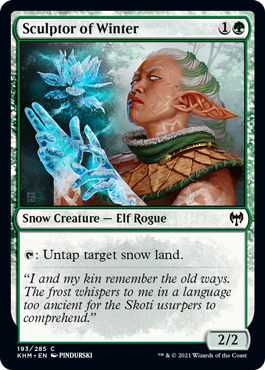
Sculptor of Winter
{1}{G}
Snow Creature — Elf Rogue
2/2
{T}: Untap target snow land.
- Sculptor of Winter's activated ability is not a mana ability. It can't be activated while casting a spell or activating an ability. It uses the stack and can be responded to.
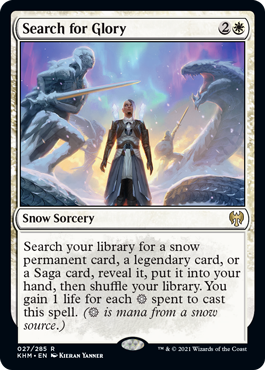
Search for Glory
{2}{W}
Snow Sorcery
Search your library for a snow permanent card, a legendary card, or a Saga card, reveal it, put it into your hand, then shuffle your library. You gain 1 life for each {S} spent to cast this spell. ({S} is mana from a snow source.)
- A snow permanent card is any artifact, creature, enchantment, land, or planeswalker card with the supertype snow.
- If you cast Search for Glory without spending snow mana, you won't gain any life. You'll still perform the search.
- If Search for Glory is copied, no snow mana was spent to cast the copy, so you won't gain any life. You'll still search . . . for glory.
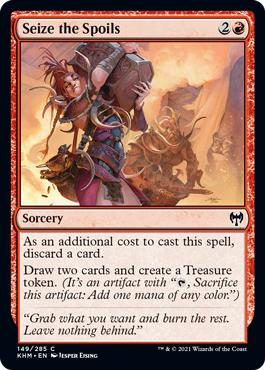
Seize the Spoils
{2}{R}
Sorcery
As an additional cost to cast this spell, discard a card.
Draw two cards and create a Treasure token. (It's an artifact with "{T}, Sacrifice this artifact: Add one mana of any color.")
- You must discard exactly one card to cast Seize the Spoils; you can't cast it without discarding a card, and you can't discard additional cards.
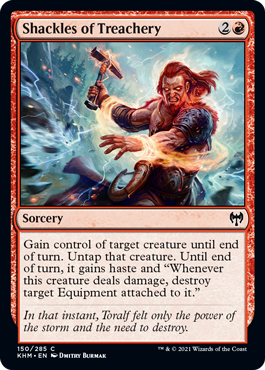
Shackles of Treachery
{2}{R}
Sorcery
Gain control of target creature until end of turn. Untap that creature. Until end of turn, it gains haste and "Whenever this creature deals damage, destroy target Equipment attached to it."
- Shackles of Treachery can target any creature, including one that's already untapped or one that doesn't have any Equipment attached to it.
- Gaining control of a creature doesn't cause you to gain control of any Auras or Equipment attached to it.
- The triggered ability gained by the creature will trigger when that creature deals any damage, not just combat damage.
- If that ability triggers, you must choose a legal target if one is available. It doesn't matter who controls the Equipment attached to the creature. If that Equipment is no longer attached to the creature as the ability tries to resolve, the ability won't resolve and the Equipment won't be destroyed.
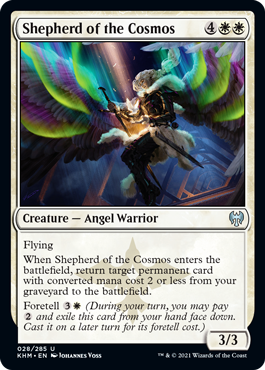
Shepherd of the Cosmos
{4}{W}{W}
Creature — Angel Warrior
3/3
Flying
When Shepherd of the Cosmos enters the battlefield, return target permanent card with converted mana cost 2 or less from your graveyard to the battlefield.
Foretell {3}{W} (During your turn, you may pay {2} and exile this card from your hand face down. Cast it on a later turn for its foretell cost.)
- A permanent card is an artifact, creature, enchantment, land, or planeswalker card.
- If the mana cost of a card in your graveyard includes {X}, X is considered to be 0.
- If you return an Aura this way, you choose what the Aura will enchant just before it enters the battlefield. An Aura returning to the battlefield this way doesn't target the player or permanent it will enchant, so permanents or players with hexproof may be chosen; however, the chosen recipient must be able to legally be enchanted by the Aura, so a player or permanent with protection from one of the Aura's qualities can't be chosen this way. If there's nothing legal for the Aura to enchant, it stays in the graveyard.
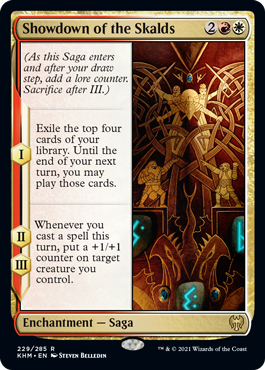
Showdown of the Skalds
{2}{R}{W}
Enchantment — Saga
(As this Saga enters and after your draw step, add a lore counter. Sacrifice after III.)
I — Exile the top four cards of your library. Until the end of your next turn, you may play those cards.
II, III — Whenever you cast a spell this turn, put a +1/+1 counter on target creature you control.
- The cards you exile because of the chapter I ability are exiled face up.
- Playing a card this way follows the normal rules for playing the card. You must pay its costs, and you must follow all applicable timing rules. For example, if one of the cards is a sorcery card, you can cast it only during your main phase while the stack is empty.
- Under normal circumstances, you can play a land from among the exiled cards only if you haven't played a land yet that turn.
- Any cards you don't play by the end of your next turn will remain exiled.
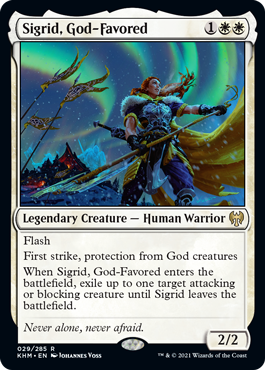
Sigrid, God-Favored
{1}{W}{W}
Legendary Creature — Human Warrior
2/2
Flash
First strike, protection from God creatures
When Sigrid, God-Favored enters the battlefield, exile up to one target attacking or blocking creature until Sigrid leaves the battlefield.
- If Sigrid leaves the battlefield before the triggered ability resolves, the target creature won't be exiled. It will remain an attacking or blocking creature.
- Auras attached to the exiled creature will be put into their owners' graveyards. Equipment attached to the exiled creature will become unattached and remain on the battlefield. Any counters on the exiled creature will cease to exist.
- If a token creature is exiled this way, it will cease to exist and won't return to the battlefield.
- Some Gods in other sets have abilities that say they aren't creatures under certain conditions. If one of them isn't a creature (and thus also not a God), Sigrid won't have protection from it.
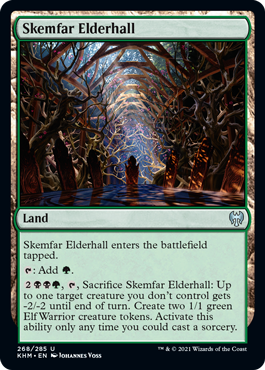
Skemfar Elderhall
Land
Skemfar Elderhall enters the battlefield tapped.
{T}: Add {G}.
{2}{B}{B}{G}, {T}, Sacrifice Skemfar Elderhall: Up to one target creature you don't control gets -2/-2 until end of turn. Create two 1/1 green Elf Warrior creature tokens. Activate this ability only any time you could cast a sorcery.
- If you activate the last ability without choosing a target, you just create Elf Warrior tokens as the ability resolves. However, if you do choose a target, and that creature is an illegal target as the ability tries to resolve, the ability won't resolve and none of its effects will happen. In that case, you won't create Elf Warrior tokens.
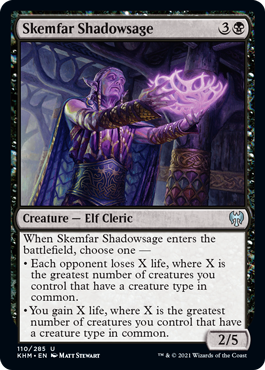
Skemfar Shadowsage
{3}{B}
Creature — Elf Cleric
2/5
When Skemfar Shadowsage enters the battlefield, choose one —
• Each opponent loses X life, where X is the greatest number of creatures you control that have a creature type in common.
• You gain X life, where X is the greatest number of creatures you control that have a creature type in common.
- You choose which mode the triggered ability has as you put that ability on the stack. You can't change modes later.
- The amount of life lost or gained is calculated as the triggered ability resolves based on the creatures you control at that time, including Skemfar Shadowsage itself if it's still under your control. You'll always use the greatest number possible. You don't need to choose any creature types. For example, if you control a Giant Wizard, a Giant Warrior, an Elf Warrior, and a Kor Warrior at that time, each opponent will lose 3 life or you'll gain 3 life.
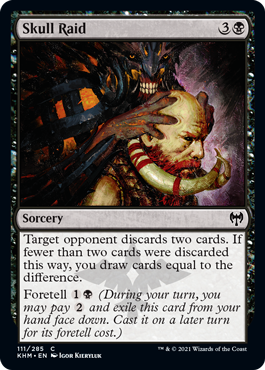
Skull Raid
{3}{B}
Sorcery
Target opponent discards two cards. If fewer than two cards were discarded this way, you draw cards equal to the difference.
Foretell {1}{B} (During your turn, you may pay {2} and exile this card from your hand face down. Cast it on a later turn for its foretell cost.)
- The opponent must discard two cards if they have two or more cards in their hand. If they have only one card in hand, they'll discard that card and you'll draw a card. If they have no cards in hand, they can't discard any, so you'll draw two cards.
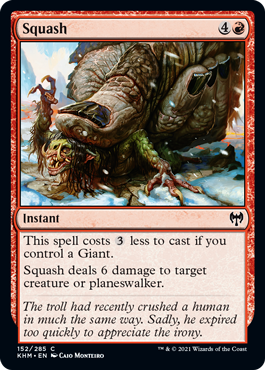
Squash
{4}{R}
Instant
This spell costs {3} less to cast if you control a Giant.
Squash deals 6 damage to target creature or planeswalker.
- If you control more than one Giant, Squash's cost is reduced by only {3}.
- Once you announce that you're casting Squash, no player may take other actions until the spell's been paid for. Notably, players can't try to change the cost by removing your Giants.
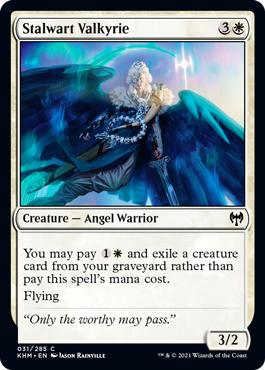
Stalwart Valkyrie
{3}{W}
Creature — Angel Warrior
3/2
You may pay {1}{W} and exile a creature card from your graveyard rather than pay this spell's mana cost.
Flying
- Casting Stalwart Valkyrie for its alternative cost doesn't change when you can cast it.
- Once you announce that you're casting Stalwart Valkyrie using its alternative cost, no player may take other actions until the spell's been paid for. Notably, players can't try to remove creature cards from your graveyard to stop you from casting the spell.
- Stalwart Valkyrie has converted mana cost 4, no matter what you actually paid to cast it.
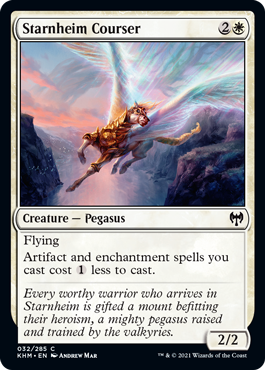
Starnheim Courser
{2}{W}
Creature — Pegasus
2/2
Flying
Artifact and enchantment spells you cast cost {1} less to cast.
- To determine the total cost of a spell, start with the mana cost or alternative cost you're paying, add any cost increases, then apply any cost reductions (such as that of Starnheim Courser). The converted mana cost of the spell is determined only by its mana cost, no matter what the total cost to cast the spell was.
- The cost reduction applies only to generic mana in the costs of artifact and enchantment spells you cast. It can't reduce requirements of specific colors of mana.
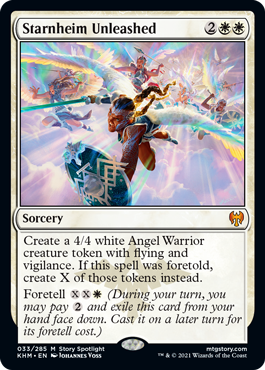
Starnheim Unleashed
{2}{W}{W}
Sorcery
Create a 4/4 white Angel Warrior creature token with flying and vigilance. If this spell was foretold, create X of those tokens instead.
Foretell {X}{X}{W} (During your turn, you may pay {2} and exile this card from your hand face down. Cast it on a later turn for its foretell cost.)
- You choose the value of X in the foretell cost as you cast the spell. You'll pay {2}{W} for one Angel Warrior token, {4}{W} for two, {6}{W} for three, and so on.
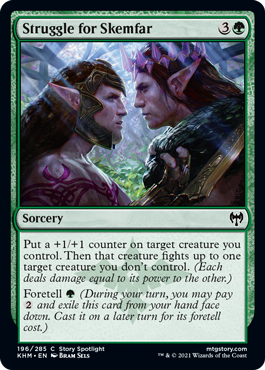
Struggle for Skemfar
{3}{G}
Sorcery
Put a +1/+1 counter on target creature you control. Then that creature fights up to one target creature you don't control. (Each deals damage equal to its power to the other.)
Foretell {G} (During your turn, you may pay {2} and exile this card from your hand face down. Cast it on a later turn for its foretell cost.)
- You can cast Struggle for Skemfar targeting only a creature you control.
- If you choose two target creatures and either target is an illegal target as Struggle for Skemfar tries to resolve, neither creature will deal or be dealt damage.
- If the creature you control is an illegal target as Struggle for Skemfar tries to resolve, you won't put a +1/+1 counter on it. If that creature is a legal target but the other creature isn't, you'll still put the +1/+1 counter on the creature you control.
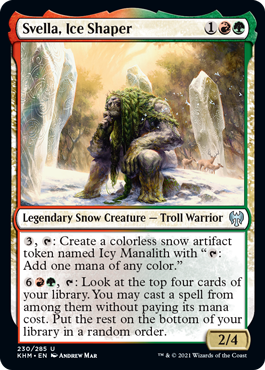
Svella, Ice Shaper
{1}{R}{G}
Legendary Snow Creature — Troll Warrior
2/4
{3}, {T}: Create a colorless snow artifact token named Icy Manalith with "{T}: Add one mana of any color."
{6}{R}{G}, {T}: Look at the top four cards of your library. You may cast a spell from among them without paying its mana cost. Put the rest on the bottom of your library in a random order.
- The spell you cast with Svella's last ability is cast from your library.
- If you cast a spell using Svella's ability, you do so as part of the resolution of that ability. You can't wait to cast it later in the turn. Timing permissions based on the card's type are ignored.
- If you cast a spell "without paying its mana cost," you can't choose to cast it for any alternative costs. You can, however, pay additional costs, such as kicker costs. If the card has any mandatory additional costs, those must be paid to cast the spell.
- If the spell has {X} in its mana cost, you must choose 0 as the value of X.
- In some unusual cases, the order of your library will matter as you cast the spell from among the revealed cards. Remember that looking at the top cards of your library doesn't change their order or allow you to change their order. You don't put the cards on the bottom of your library until after you are done casting the spell.
- You'll put the cards you didn't cast on the bottom of your library before the spell you cast resolves.
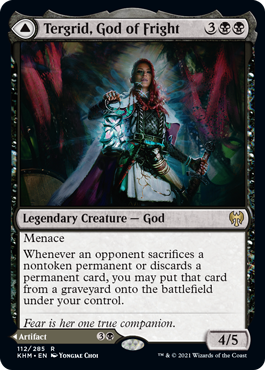
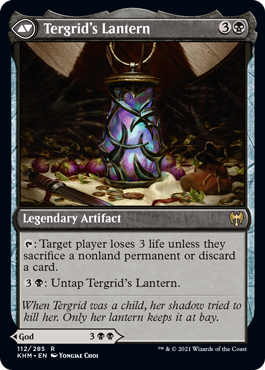
Tergrid, God of Fright
{3}{B}{B}
Legendary Creature — God
4/5
Menace
Whenever an opponent sacrifices a nontoken permanent or discards a permanent card, you may put that card from a graveyard onto the battlefield under your control.
/////
Tergrid's Lantern
{3}{B}
Legendary Artifact
{T}: Target player loses 3 life unless they sacrifice a nonland permanent or discard a card.
{3}{B}: Untap Tergrid's Lantern.
- A permanent card is an artifact, creature, enchantment, land, or planeswalker card.
- If an opponent sacrifices a nontoken permanent, it doesn't matter which graveyard it goes to. Tergrid's ability will trigger.
- If the card leaves the graveyard before Tergrid's ability resolves, you can't put it onto the battlefield, even if it returns to the graveyard before the ability resolves.
- If an opponent sacrifices a nontoken permanent or discards a permanent card as part of paying the cost of a spell or ability, Tergrid's ability will trigger and goes on the stack on top of that spell or ability. Tergrid's ability will resolve before that spell or ability.
- If you put an Aura onto the battlefield using Tergrid's ability, you choose what the Aura will enchant just before it enters the battlefield. An Aura put onto the battlefield this way doesn't target the player or permanent it will enchant, so permanents or players with hexproof may be chosen; however, the chosen recipient must be able to legally be enchanted by the Aura, so a player or permanent with protection from one of the Aura's qualities can't be chosen this way. If there's nothing legal for the Aura to enchant, it stays in the graveyard.
- The player targeted by the first ability of Tergrid's Lantern can choose to lose 3 life even if they have nonland permanents to sacrifice or cards to discard. They can't choose to sacrifice a nonland permanent if they don't control any, nor can they choose to discard a card if they have none in hand.
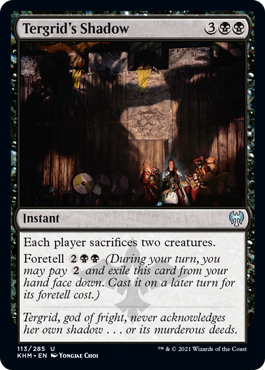
Tergrid's Shadow
{3}{B}{B}
Instant
Each player sacrifices two creatures.
Foretell {2}{B}{B} (During your turn, you may pay {2} and exile this card from your hand face down. Cast it on a later turn for its foretell cost.)
- As Tergrid's Shadow resolves, first the player whose turn it is chooses two creatures they control, then each other player in turn order does the same, knowing the choices made before them. Then all the chosen creatures are sacrificed at the same time.
- If a player controls two or fewer creatures, that player sacrifices each creature they control.
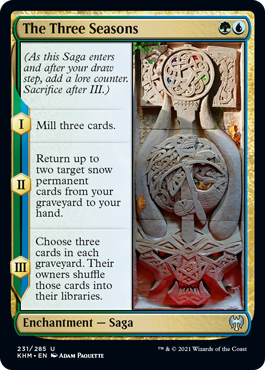
The Three Seasons
{G}{U}
Enchantment — Saga
(As this Saga enters and after your draw step, add a lore counter. Sacrifice after III.)
I — Mill three cards.
II — Return up to two target snow permanent cards from your graveyard to your hand.
III — Choose three cards in each graveyard. Their owners shuffle those cards into their libraries.
- For the chapter III ability, if a player has no cards in their graveyard, they don't shuffle their library.
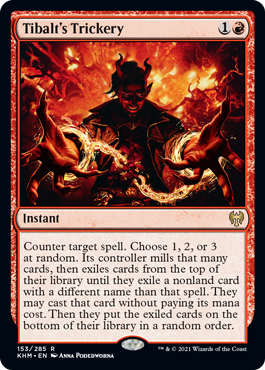
Tibalt's Trickery
{1}{R}
Instant
Counter target spell. Choose 1, 2, or 3 at random. Its controller mills that many cards, then exiles cards from the top of their library until they exile a nonland card with a different name than that spell. They may cast that card without paying its mana cost. Then they put the exiled cards on the bottom of their library in a random order.
- If there aren't any nonland cards in that library with a different name than the countered spell, the player will exile all cards from their library, revealing all of them, and then they'll put those cards on the bottom of their library in a random order.
- If a player casts a spell "without paying its mana cost," they can't choose to cast it for any alternative costs. They can, however, pay additional costs, such as kicker costs. If the card has any mandatory additional costs, those must be paid to cast the spell.
- If the spell has {X} in its mana cost, they must choose 0 as the value of X.
- If the spell that's countered was the back face of a modal double-faced card, no card in the player's library will have the same name as that spell because those cards all use only their front-face characteristics while in the library; however, if the first card the player exiles that has a different name than the spell is a modal double-faced card, they may cast either face, even if the back face has the same name as the countered spell.
- Tibalt's Trickery can target a spell that can't be countered. If Tibalt's Trickery resolves, the target spell won't be countered, but all of the other effects will still happen.
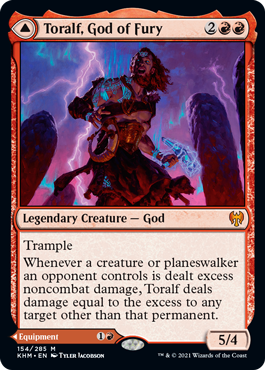
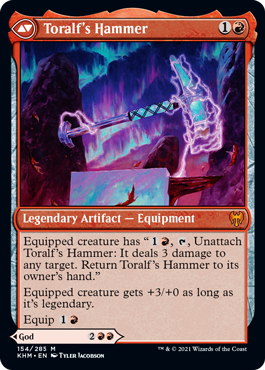
Toralf, God of Fury
{2}{R}{R}
Legendary Creature — God
5/4
Trample
Whenever a creature or planeswalker an opponent controls is dealt excess noncombat damage, Toralf deals damage equal to the excess to any target other than that permanent.
/////
Toralf's Hammer
{1}{R}
Legendary Artifact — Equipment
Equipped creature has "{1}{R}, {T}, Unattach Toralf's Hammer: It deals 3 damage to any target. Return Toralf's Hammer to its owner's hand."
Equipped creature gets +3/+0 as long as it's legendary.
Equip {1}{R}
- A creature has been dealt excess damage if one or more sources deal more damage to it than the minimum amount of damage required to be lethal damage. In most cases, this means damage greater than its toughness, but consider any damage already dealt to it that turn.
- A planeswalker is dealt excess damage if it's dealt damage greater than its current loyalty.
- Even 1 damage dealt to a creature from a source with deathtouch is considered lethal damage, so any amount greater than that will cause excess damage to be dealt, even if the total amount of damage isn't greater than the creature's toughness. Note that a source of damage having deathtouch has no effect on damage dealt to planeswalkers.
- If a permanent is both a creature and a planeswalker, the minimum amount of damage to be considered lethal damage is used to determine if excess damage has been dealt. For example, if a 5/5 creature that's also a planeswalker with three loyalty counters on it is dealt 4 noncombat damage, it's been dealt 1 excess damage and Toralf's ability will trigger.
- It doesn't matter if a creature or planeswalker an opponent controls was dealt combat damage earlier in the turn. The only thing that matters is that the damage dealt to that permanent that caused excess damage to be dealt was noncombat damage.
- Toralf's ability doesn't affect the damage dealt to the creature or planeswalker an opponent controls. That damage will still be dealt as normal.
- The damage Toralf deals because of its triggered ability is noncombat damage. That damage may cause Toralf's ability to trigger again.
- The creature equipped by Toralf's Hammer is the source of the activated ability, but Toralf's Hammer is the source of the damage. For example, if the equipped creature is green, that ability can't target a permanent with protection from green. It could target one with protection from red, though the damage would be prevented as it would have been dealt by a red source (Toralf's Hammer).
- If the target is an illegal target as the ability tries to resolve, the ability won't resolve and none of its effects will happen. You won't return Toralf's Hammer to its owner's hand.
- You unattach Toralf's Hammer as part of the cost of activating the ability. If the ability doesn't resolve, Toralf's Hammer doesn't become reattached.
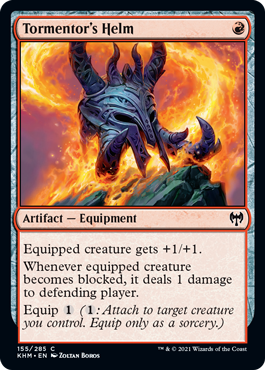
Tormentor's Helm
{R}
Artifact — Equipment
Equipped creature gets +1/+1.
Whenever equipped creature becomes blocked, it deals 1 damage to defending player.
Equip {1} ({1}: Attach to target creature you control. Equip only as a sorcery.)
- The triggered ability triggers only once if the equipped creature becomes blocked, no matter how many creatures blocked it.
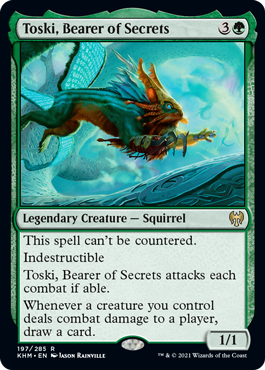
Toski, Bearer of Secrets
{3}{G}
Legendary Creature — Squirrel
1/1
This spell can't be countered.
Indestructible
Toski, Bearer of Secrets attacks each combat if able.
Whenever a creature you control deals combat damage to a player, draw a card.
- A spell or ability that counters spells can still target Toski. When that spell or ability resolves, Toski won't be countered, but any additional effects of that spell or ability will still happen.
- If Toski can't attack for some reason (such as being tapped or having come under that player's control that turn), then it doesn't attack. If there's a cost associated with having it attack, you aren't forced to pay that cost, so it doesn't have to attack in that case either.
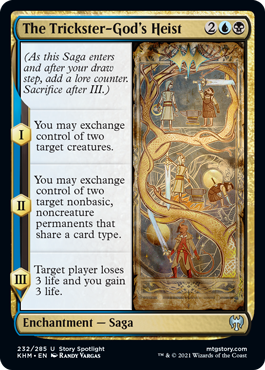
The Trickster-God's Heist
{2}{U}{B}
Enchantment — Saga
(As this Saga enters and after your draw step, add a lore counter. Sacrifice after III.)
I — You may exchange control of two target creatures.
II — You may exchange control of two target nonbasic, noncreature permanents that share a card type.
III — Target player loses 3 life and you gain 3 life.
- If one of the target permanents of the chapter I or chapter II ability is an illegal target as that ability resolves, the exchange won't happen. If both targets are illegal, the ability doesn't resolve.
- For those two abilities, you don't have to control either target.
- If the same player controls both target permanents as the chapter I or chapter II ability resolves, nothing happens.
- Gaining control of a creature doesn't cause a player to gain control of any Auras or Equipment attached to it.
- For the chapter II ability, either target can have card types the other does not. For example, you can target an artifact land and an artifact.
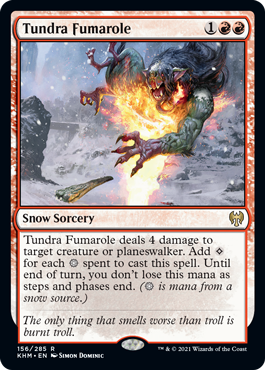
Tundra Fumarole
{1}{R}{R}
Snow Sorcery
Tundra Fumarole deals 4 damage to target creature or planeswalker. Add {C} for each {S} spent to cast this spell. Until end of turn, you don't lose this mana as steps and phases end. ({S} is mana from a snow source.)
- If the target creature or planeswalker is an illegal target as Tundra Fumarole tries to resolve, it won't resolve and none of its effects will happen. You won't add mana.
- If you cast Tundra Fumarole without spending snow mana, you won't add any mana. Damage will still be dealt.
- If Tundra Fumarole is copied, no snow mana was spent to cast the copy, so you won't add any mana. Damage will still be dealt.
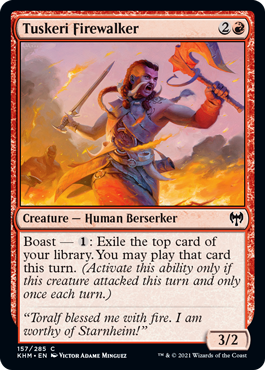
Tuskeri Firewalker
{2}{R}
Creature — Human Berserker
3/2
Boast — {1}: Exile the top card of your library. You may play that card this turn. (Activate this ability only if this creature attacked this turn and only once each turn.)
- The card you exile with the boast ability is exiled face up.
- Playing a card this way follows the normal rules for playing the card. You must pay its costs, and you must follow all applicable timing rules. For example, if the card is a sorcery card, you can cast it only during your main phase while the stack is empty.
- Under normal circumstances, you can play a land this way only if you haven't played a land yet that turn.
- If you don't play the card by the end of the turn, it will remain exiled. Boasting again on a future turn won't let you play that card.
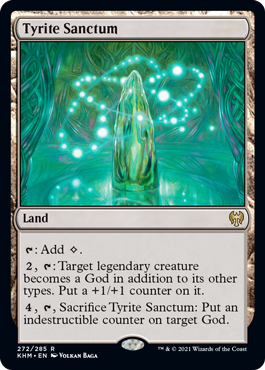
Tyrite Sanctum
Land
{T}: Add {C}.
{2}, {T}: Target legendary creature becomes a God in addition to its other types. Put a +1/+1 counter on it.
{4}, {T}, Sacrifice Tyrite Sanctum: Put an indestructible counter on target God.
- You can activate the middle ability targeting a legendary creature that's already a God. You'll put a +1/+1 counter on it.
- An indestructible counter on a permanent gives that permanent indestructible.
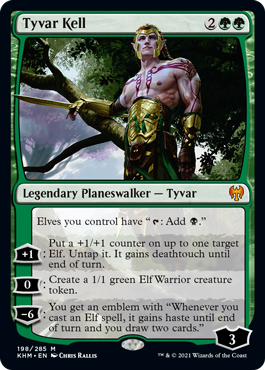
Tyvar Kell
{2}{G}{G}
Legendary Planeswalker — Tyvar
3
Elves you control have "{T}: Add {B}."
+1: Put a +1/+1 counter on up to one target Elf. Untap it. It gains deathtouch until end of turn.
0: Create a 1/1 green Elf Warrior creature token.
−6: You get an emblem with "Whenever you cast an Elf spell, it gains haste until end of turn and you draw two cards."
- Tyvar may look like an Elf, but he's not a creature with the creature type Elf, so he doesn't give himself the mana ability he gives Elves you control and he can't be the target of the first loyalty ability.
- The first loyalty ability can target an Elf that's already untapped.
- The emblem will cause the Elf spell to gain haste. That change carries through to the permanent that the spell becomes.
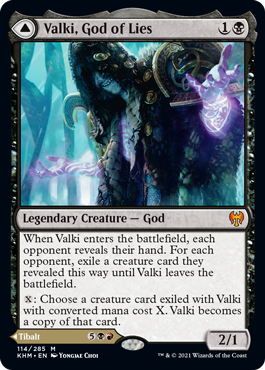
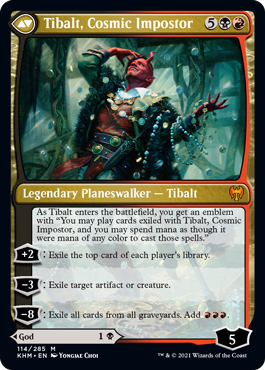
Valki, God of Lies
{1}{B}
Legendary Creature — God
2/1
When Valki enters the battlefield, each opponent reveals their hand. For each opponent, exile a creature card they revealed this way until Valki leaves the battlefield.
{X}: Choose a creature card exiled with Valki with converted mana cost X. Valki becomes a copy of that card.
/////
Tibalt, Cosmic Impostor
{5}{B}{R}
Legendary Planeswalker — Tibalt
5
As Tibalt enters the battlefield, you get an emblem with "You may play cards exiled with Tibalt, Cosmic Impostor, and you may spend mana as though it were mana of any color to cast those spells."
+2: Exile the top card of each player's library.
−3: Exile target artifact or creature.
−8: Exile all cards from all graveyards. Add {R}{R}{R}.
- If Valki leaves the battlefield before its enters-the-battlefield ability resolves, each opponent will reveal their hand, but no cards will be exiled.
- You don't choose which creature card exiled with Valki that Valki will become a copy of until that ability is resolving. (In many cases, the value you chose for X will give away your intentions.)
- If there are no creature cards exiled with Valki with converted mana cost equal to the value of X as Valki's activated ability resolves, nothing happens. God of Lies, indeed.
- If Valki becomes a copy of a creature during the same turn Valki enters the battlefield, you can't attack with him or use any {T} abilities he gains.
- Valki copies the printed values of the exiled creature card. Notably, once Valki becomes a copy of another creature card, he won't have his own printed activated ability.
- You can activate Valki's ability multiple times in response to one another. This may briefly allow Valki to copy different creature cards. You'll get priority to cast spells or activate abilities in between each of Valki's activated abilities.
- If an effect begins to apply to Valki before it becomes a copy, that effect will continue to apply.
- If another object becomes a copy of Valki, it will become whatever Valki is copying. That object remains a copy even if Valki leaves the battlefield.
- The emblem given to you by Tibalt allows you to play cards exiled with that specific Tibalt, Cosmic Impostor, even after that Tibalt leaves the battlefield. If a different Tibalt, Cosmic Impostor comes under your control, it's a new object (even if it's represented by the same card). Of course, the new Tibalt will also give you an emblem so you can play the cards he exiles.
- The cards exiled by Tibalt's loyalty abilities are all exiled face up.
- Playing the cards exiled with Tibalt follows the normal rules for playing those cards. You must pay their costs, if any, and you must follow all applicable timing rules. For example, if one of the cards is a sorcery card, you can cast that card by paying its mana cost only during your main phase while the stack is empty.
- Unless an effect allows you to play additional lands that turn, you can play land cards exiled with Tibalt only if you haven't played a land yet that turn.
- While resolving Tibalt's last ability, you'll add {R}{R}{R} even if you don't exile any cards.
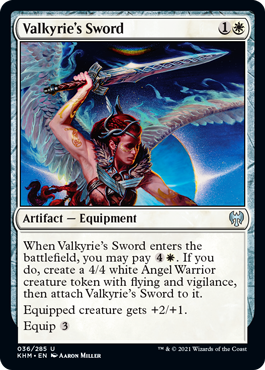
Valkyrie's Sword
{1}{W}
Artifact — Equipment
When Valkyrie's Sword enters the battlefield, you may pay {4}{W}. If you do, create a 4/4 white Angel Warrior creature token with flying and vigilance, then attach Valkyrie's Sword to it.
Equipped creature gets +2/+1.
Equip {3}
- You decide whether to pay {4}{W} as the enters-the-battlefield ability resolves. If you do, you immediately create the Angel Warrior creature token and attach Valkyrie's Sword to it. No players may respond to your decision to pay or not, and no player may take actions during this process.
- The Angel Warrior creature token enters the battlefield as a 4/4 creature. Any abilities that trigger when a creature with a certain power or toughness enters the battlefield will see the token enter as a 4/4 creature.
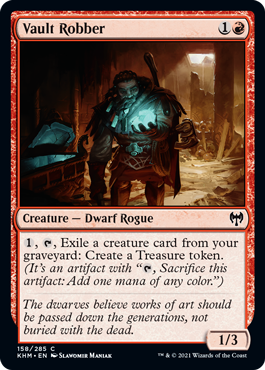
Vault Robber
{1}{R}
Creature — Dwarf Rogue
1/3
{1}, {T}, Exile a creature card from your graveyard: Create a Treasure token. (It's an artifact with "{T}, Sacrifice this artifact: Add one mana of any color.")
- Once you announce that you're activating the activated ability, no player may take actions until the ability has been paid for. Notably, opponents can't try to remove one of your creature cards to stop you from exiling it.
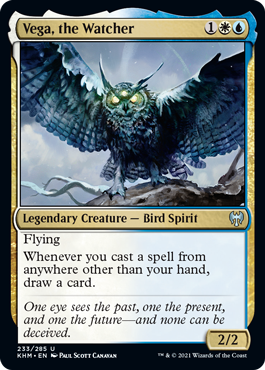
Vega, the Watcher
{1}{W}{U}
Legendary Creature — Bird Spirit
2/2
Flying
Whenever you cast a spell from anywhere other than your hand, draw a card.
- Vega's ability will resolve before the spell that caused it to trigger. It will resolve even if that spell is countered.
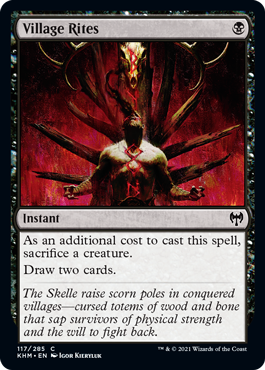
Village Rites
{B}
Instant
As an additional cost to cast this spell, sacrifice a creature.
Draw two cards.
- You must sacrifice exactly one creature to cast this spell; you can't cast it without sacrificing a creature, and you can't sacrifice additional creatures.
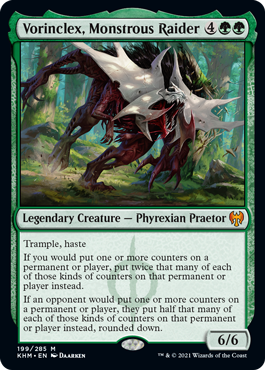
Vorinclex, Monstrous Raider
{4}{G}{G}
Legendary Creature — Phyrexian Praetor
6/6
Trample, haste
If you would put one or more counters on a permanent or player, put twice that many of each of those kinds of counters on that permanent or player instead.
If an opponent would put one or more counters on a permanent or player, they put half that many of each of those kinds of counters on that permanent or player instead, rounded down.
- Unlike many similar effects, Vorinclex cares deeply about who is putting the counters on the permanent or player to determine which of its two last abilities applies.
- If a permanent enters the battlefield with counters on it, the effect causing the permanent to be given counters may specify which player puts those counters on it. If the effect doesn't specify a player, the object's controller puts those counters on it.
- If two or more effects attempt to modify how many counters would be put onto a permanent you control, you choose the order to apply those effects, no matter who controls the sources of those effects.
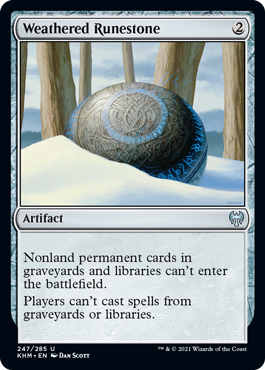
Weathered Runestone
{2}
Artifact
Nonland permanent cards in graveyards and libraries can't enter the battlefield.
Players can't cast spells from graveyards or libraries.
- Players can still play lands from graveyards if an effect allows them to. Similarly, effects can put land cards onto the battlefield from any zone.
- If an effect exiles a card from a graveyard or library and allows a player to cast it, the player may do so. The spell is cast from exile.
- Look at the card as it exists in your graveyard or library to determine whether it can enter the battlefield. If it's a double-faced card, use its front-face characteristics only.
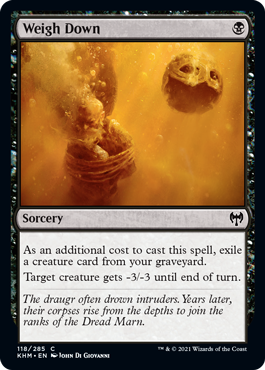
Weigh Down
{B}
Sorcery
As an additional cost to cast this spell, exile a creature card from your graveyard.
Target creature gets -3/-3 until end of turn.
- You must exile exactly one creature card from your graveyard to cast this spell; you can't cast it without exiling a creature card, and you can't exile additional creature cards.
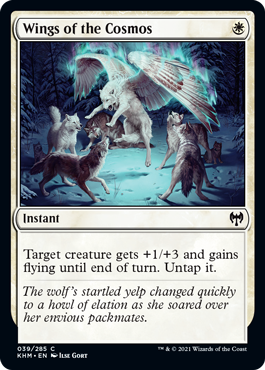
Wings of the Cosmos
{W}
Instant
Target creature gets +1/+3 and gains flying until end of turn. Untap it.
- Wings of the Cosmos can target a creature that's already untapped. It will still get +1/+3 and gain flying until end of turn.
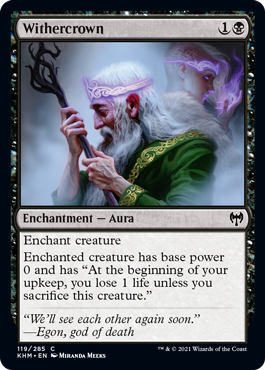
Withercrown
{1}{B}
Enchantment — Aura
Enchant creature
Enchanted creature has base power 0 and has "At the beginning of your upkeep, you lose 1 life unless you sacrifice this creature."
- Withercrown overwrites all previous effects that set the enchanted creature's power to specific a value. Other effects that set its base power to specific values that start to apply after Withercrown becomes attached to the creature will overwrite this effect.
- Any effects that modify the enchanted creature's power without setting it to a specific value will apply after its base power is set, regardless of the order in which those effects were created. The same is true of counters that modify its power.
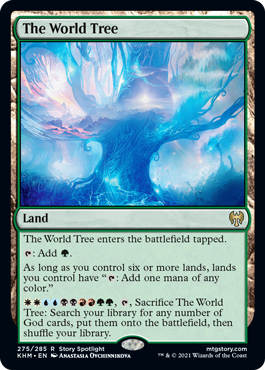
The World Tree
Land
The World Tree enters the battlefield tapped.
{T}: Add {G}.
As long as you control six or more lands, lands you control have "{T}: Add one mana of any color."
{W}{W}{U}{U}{B}{B}{R}{R}{G}{G}, {T}, Sacrifice The World Tree: Search your library for any number of God cards, put them onto the battlefield, then shuffle your library.
- The World Tree's third ability doesn't cause lands you control to lose any of their abilities. It also doesn't cause lands you control to gain or lose any land types.
KALDHEIM SET AND THEME BOOSTER ADDITIONAL CARD-SPECIFIC NOTES
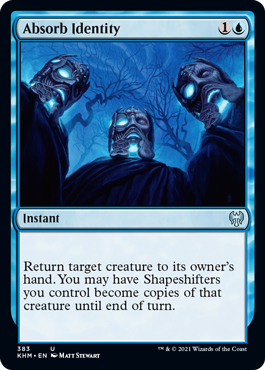
Absorb Identity
{1}{U}
Instant
Return target creature to its owner's hand. You may have Shapeshifters you control become copies of that creature until end of turn.
- If the target creature is an illegal target as Absorb Identity tries to resolve, it won't resolve and none of its effects will happen. Shapeshifters you control won't become copies of the creature.
- Either all Shapeshifters you control will become copies of the creature or none of them will.
- If Shapeshifters you control do become copies of the creature, they'll use the copiable values of the creature as it last existed on the battlefield. They don't copy whether that creature was tapped or untapped, whether it had any counters on it, whether it had any Auras and/or Equipment attached to it, or any non-copy effects that changed its power, toughness, types, color, and so on.
- If the creature that was returned was copying something else, the Shapeshifters that become copies of that creature will use the copiable values of that creature. In most cases, they will be copies of whatever that creature was copying. If it was copying a permanent or card with {X} in its mana cost, X is 0.
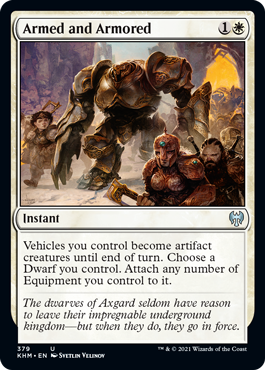
Armed and Armored
{1}{W}
Instant
Vehicles you control become artifact creatures until end of turn. Choose a Dwarf you control. Attach any number of Equipment you control to it.
- You can cast Armed and Armored even if you don't control any Vehicles or Dwarves. Whatever part of the effect that can happen does, and the rest is ignored.
- The set of Vehicles affected by Armed and Armored is determined as the spell resolves. Vehicles you begin to control later in the turn won't automatically become creatures.
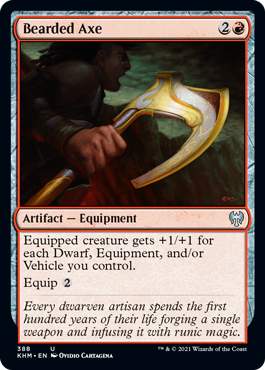
Bearded Axe
{2}{R}
Artifact — Equipment
Equipped creature gets +1/+1 for each Dwarf, Equipment, and/or Vehicle you control.
Equip {2}
- The bonus granted by Bearded Axe is constantly updated as the number of Dwarves, Equipment, and Vehicles you control changes.
- Bearded Axe will count itself, so it will give at least +1/+1 in most cases.
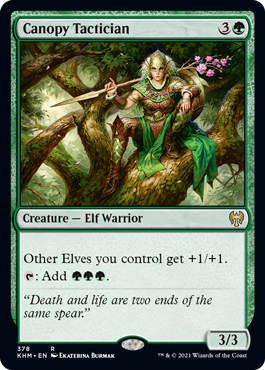
Canopy Tactician
{3}{G}
Creature — Elf Warrior
3/3
Other Elves you control get +1/+1.
{T}: Add {G}{G}{G}.
- Because damage remains marked on creatures until the damage is removed as the turn ends, nonlethal damage dealt to Elves you control may become lethal if Canopy Tactician leaves the battlefield that turn.
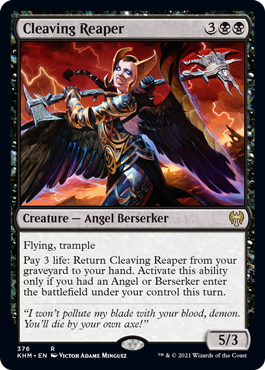
Cleaving Reaper
{3}{B}{B}
Creature — Angel Berserker
5/3
Flying, trample
Pay 3 life: Return Cleaving Reaper from your graveyard to your hand. Activate this ability only if you had an Angel or Berserker enter the battlefield under your control this turn.
- The Angel or Berserker doesn't have to still be under your control in order to activate Cleaving Reaper's ability. Additionally, the Angel or Berserker could have entered the battlefield under your control at any point in the turn, even before Cleaving Reaper was put into the graveyard.
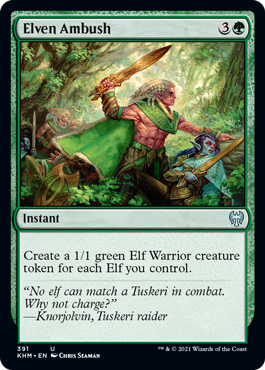
Elven Ambush
{3}{G}
Instant
Create a 1/1 green Elf Warrior creature token for each Elf you control.
- Use the number of Elves you control as Elven Ambush resolves to determine how many Elf Warrior tokens to create.
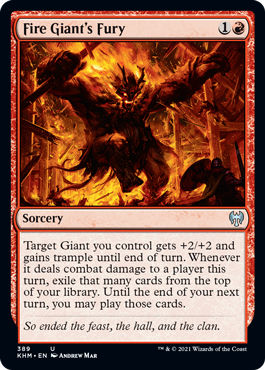
Fire Giant's Fury
{1}{R}
Sorcery
Target Giant you control gets +2/+2 and gains trample until end of turn. Whenever it deals combat damage to a player this turn, exile that many cards from the top of your library. Until the end of your next turn, you may play those cards.
- The cards exiled by the triggered ability created by Fire Giant's Fury are exiled face up.
- You may play those cards that turn even if the Giant leaves the battlefield or another player gains control of it.
- Playing the exiled cards follows the normal rules for playing those cards. You must pay their costs, if any, and you must follow all applicable timing rules. For example, if one of the cards is a sorcery card, you can cast that card by paying its mana cost only during your main phase while the stack is empty.
- Unless an effect allows you to play additional lands that turn, you can play land cards exiled this way only if you haven't played a land yet that turn.
- Any exiled cards that you don't play by the end of your next turn remain exiled.
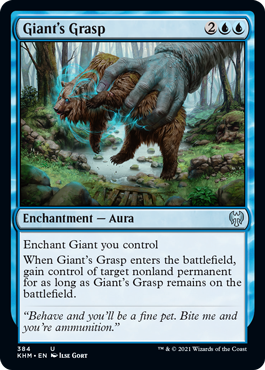
Giant's Grasp
{2}{U}{U}
Enchantment — Aura
Enchant Giant you control
When Giant's Grasp enters the battlefield, gain control of target nonland permanent for as long as Giant's Grasp remains on the battlefield.
- If Giant's Grasp leaves the battlefield before its triggered ability resolves, you won't gain control of the target nonland permanent at all.
- The control-changing effect doesn't expire if another player gains control of Giant's Grasp (although this is likely to cause it to leave the battlefield because it can enchant only a Giant controlled by the controller of Giant's Grasp). The effect expires only once Giant's Grasp is no longer on the battlefield.
- Gaining control of a nonland permanent doesn't cause you to gain control of any Auras or Equipment attached to it.
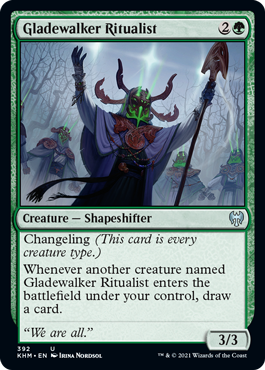
Gladewalker Ritualist
{2}{G}
Creature — Shapeshifter
3/3
Changeling (This card is every creature type.)
Whenever another creature named Gladewalker Ritualist enters the battlefield under your control, draw a card.
- If multiple creatures named Gladewalker Ritualist all enter the battlefield under your control at the same time, each of their abilities will trigger once for each of the others.
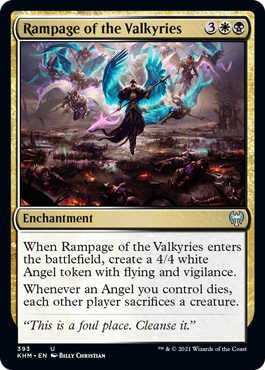
Rampage of the Valkyries
{3}{W}{B}
Enchantment
When Rampage of the Valkyries enters the battlefield, create a 4/4 white Angel creature token with flying and vigilance.
Whenever an Angel you control dies, each other player sacrifices a creature.
- The last ability of Rampage of the Valkyries will trigger whenever any Angel you control dies, not just the one created by the first ability.
- As the last ability resolves, if it's not your turn, the first player to choose a creature they control is the player whose turn it is. If it is your turn, the next player in turn order chooses first. In either case, each other player in turn order then chooses a creature they control, knowing the choices made before their choice. Then all chosen creatures are sacrificed at the same time.
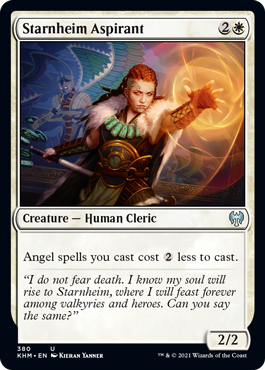
Starnheim Aspirant
{2}{W}
Creature — Human Cleric
2/2
Angel spells you cast cost {2} less to cast.
- To determine the total cost of a spell, start with the mana cost or alternative cost you're paying, add any cost increases, then apply any cost reductions (such as that of Starnheim Aspirant). The converted mana cost of the spell is determined only by its mana cost, no matter what the total cost to cast the spell was.
- The cost reduction applies only to generic mana in the costs of Angel spells you cast. It can't reduce requirements of specific colors of mana.
- An Angel spell is a creature spell with the creature type Angel. Instant, sorcery, and enchantment cards that may create Angel tokens are not Angel spells.
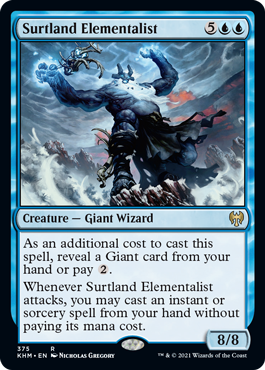
Surtland Elementalist
{5}{U}{U}
Creature — Giant Wizard
8/8
As an additional cost to cast this spell, reveal a Giant card from your hand or pay {2}.
Whenever Surtland Elementalist attacks, you may cast an instant or sorcery spell from your hand without paying its mana cost.
- A Giant card is a creature card with the creature type Giant. Presumably, it will be the same size as all your other cards.
- If you cast a spell using Surtland Elementalist's triggered ability, you do so as part of the resolution of that ability. You can't wait to cast the spell later in the turn. Timing permissions based on the card's type are ignored, and the spell will resolve before blockers are declared.
- If you cast a spell "without paying its mana cost," you can't choose to cast it for any alternative costs. You can, however, pay additional costs, such as kicker costs. If the card has any mandatory additional costs, those must be paid to cast the spell.
- If the spell has {X} in its mana cost, you must choose 0 as the value of X.
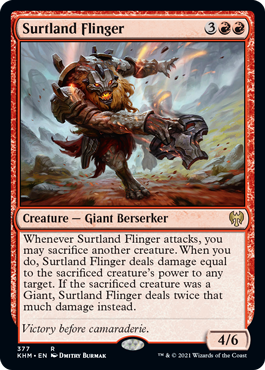
Surtland Flinger
{3}{R}{R}
Creature — Giant Berserker
4/6
Whenever Surtland Flinger attacks, you may sacrifice another creature. When you do, Surtland Flinger deals damage equal to the sacrificed creature's power to any target. If the sacrificed creature was a Giant, Surtland Flinger deals twice that much damage instead.
- Surtland Flinger's triggered ability goes on the stack without a target. While that ability is resolving, you may sacrifice another creature. When you do, the reflexive triggered ability triggers and you pick a target to be dealt damage. This is different from effects that say "If you do" in that players may take actions after you've sacrificed the creature but before damage is dealt.
- Use the power of the creature as it was sacrificed to determine how much damage is dealt. Damage will be dealt before blockers are declared.
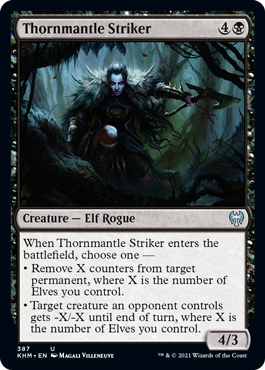
Thornmantle Striker
{4}{B}
Creature — Elf Rogue
4/3
When Thornmantle Striker enters the battlefield, choose one —
• Remove X counters from target permanent, where X is the number of Elves you control.
• Target creature an opponent controls gets -X/-X until end of turn, where X is the number of Elves you control.
- For each mode, use the number of Elves you control as the enters-the-battlefield ability resolves, including Thornmantle Striker itself if it's still under your control.
- For the first mode, you choose which counters are removed as the ability resolves. If the permanent has fewer counters on it than the number of Elves you control, you'll remove all of them.
- A planeswalker with no loyalty counters on it is put into its owner's graveyard.
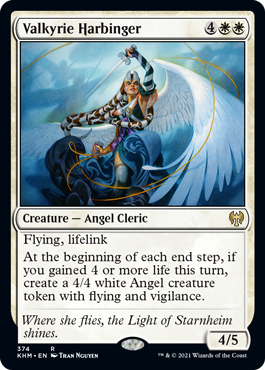
Valkyrie Harbinger
{4}{W}{W}
Creature — Angel Cleric
4/5
Flying, lifelink
At the beginning of each end step, if you gained 4 or more life this turn, create a 4/4 white Angel creature token with flying and vigilance.
- You create just one Angel token, no matter how much life you've gained past 4 life.
- Valkyrie Harbinger's ability looks at how much life you've gained in the turn, even if it wasn't on the battlefield when you gained life. It doesn't care if you also lost life, even if you lost more life than you gained.
- If you haven't gained 4 life by the time an end step begins, Valkyrie Harbinger's ability won't trigger at all.
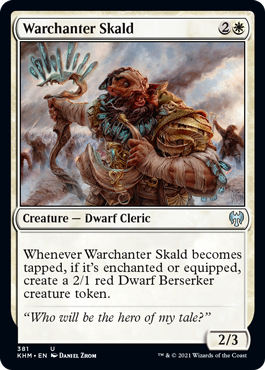
Warchanter Skald
{2}{W}
Creature — Dwarf Cleric
2/3
Whenever Warchanter Skald becomes tapped, if it's enchanted or equipped, create a 2/1 red Dwarf Berserker creature token.
- Warchanter Skald's triggered ability doesn't allow you to tap it. You have to find some other way to tap it. You could attack with it, I suppose?
- For the triggered ability to trigger, Warchanter Skald has to actually change from untapped to tapped. If an effect attempts to tap while it is already tapped, the ability won't trigger.
- If Warchanter Skald isn't enchanted or equipped at the moment it becomes tapped, the ability won't trigger at all. If the ability does trigger, it will check again as it tries to resolve to make sure Warchanter Skald is still enchanted or equipped: if not, the ability won't do anything. (Warchanter Skald could have different Auras and/or Equipment attached to it by that point, though.)
KALDHEIM COMMANDER CARD-SPECIFIC NOTES
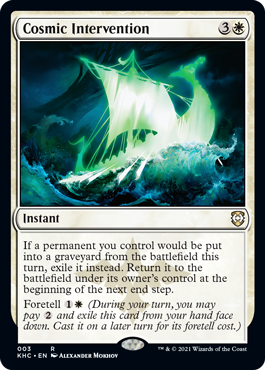
Cosmic Intervention
{3}{W}
Instant
If a permanent you control would be put into a graveyard from the battlefield this turn, exile it instead. Return it to the battlefield under its owner's control at the beginning of the next end step.
Foretell {1}{W} (During your turn, you may pay {2} and exile this card from your hand face down. Cast it on a later turn for its foretell cost.)
- Each permanent that is exiled instead of being put into a graveyard from the battlefield creates its own triggered ability to return itself. Those abilities all trigger at the beginning of the next end step, and you can choose the order in which those abilities will go on the stack. The cards will be returned to the battlefield one at a time as those abilities resolve.
- Once Cosmic Intervention resolves, any "When [this creature] dies" abilities of permanents you control won't trigger for the rest of the turn because those permanents won't be put into the graveyard.
- If a token permanent would be put into a graveyard, it's exiled and then ceases to exist. It won't return to the battlefield.
- If you return an Aura this way, you choose what the Aura will enchant just before it enters the battlefield. An Aura returning to the battlefield this way doesn't target the player or permanent it will enchant, so permanents or players with hexproof may be chosen; however, the chosen recipient must be able to legally be enchanted by the Aura, so a player or permanent with protection from one of the Aura's qualities can't be chosen this way. If there's nothing legal for the Aura to enchant, it stays in exile.
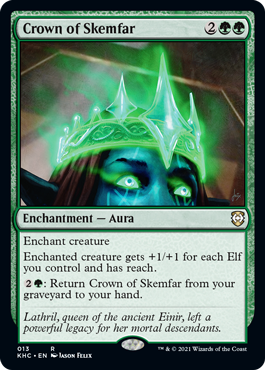
Crown of Skemfar
{2}{G}{G}
Enchantment — Aura
Enchant creature
Enchanted creature gets +1/+1 for each Elf you control and has reach.
{2}{G}: Return Crown of Skemfar from your graveyard to your hand.
- The power/toughness bonus given by Crown of Skemfar will change as the number of Elves you control changes.
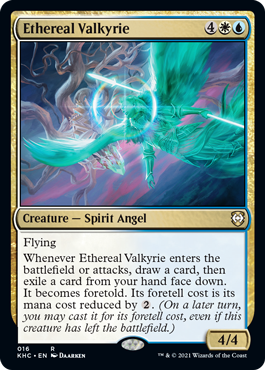
Ethereal Valkyrie
{4}{W}{U}
Creature — Spirit Angel
4/4
Flying
Whenever Ethereal Valkyrie enters the battlefield or attacks, draw a card, then exile a card from your hand face down. It becomes foretold. Its foretell cost is its mana cost reduced by {2}. (On a later turn, you may cast it for its foretell cost, even if this creature has left the battlefield.)
- Because the card in exile becomes foretold, you can look at it in exile. (Most effects that have you exile a card face down don't allow you to look at the card in exile.)
- The reduction of the foretell cost applies only to generic mana in the foretell cost. It can't reduce requirements of specific colors of mana. For example, if you foretell a card in your hand with mana cost {1}{G}{G}, its foretell cost will be {G}{G}.
- If the card you exile has foretell, it will have two foretell costs, the one printed on it and the one given to it by Ethereal Valkyrie. You may cast that card for either of its foretell costs.
- If you foretell a modal double-faced card, the foretell cost will be based on the mana cost of the face you cast from exile. For example, if you foretell Kolvori, God of Kinship/The Ringhart Crest, you could cast Kolvori by paying {G}{G} or The Ringhart Crest by paying {G} on a future turn. If you foretell a modal double-faced card whose front face is a nonland face but whose back face is a land face, you can't play that card as a land.
- Although the card you exile becomes foretold, you did not foretell it. An ability that triggers whenever you foretell a card will not trigger.
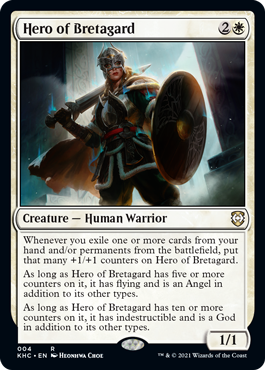
Hero of Bretagard
{2}{W}
Creature — Human Warrior
1/1
Whenever you exile one or more cards from your hand and/or permanents from the battlefield, put that many +1/+1 counters on Hero of Bretagard.
As long as Hero of Bretagard has five or more counters on it, it has flying and is an Angel in addition to its other types.
As long as Hero of Bretagard has ten or more counters on it, it has indestructible and is a God in addition to its other types.
- Exiling a token permanent will cause Hero of Bretagard's first ability to trigger, as will exiling a permanent you don't control.
- Neither the second nor the third ability of Hero of Bretagard refers to a specific kind of counter. Any counter that's on it will do.
- With ten or more counters on it, Hero of Bretagard will have flying and indestructible, and it will be an Angel and a God (and a Human and a Warrior, but those aren't as exciting).
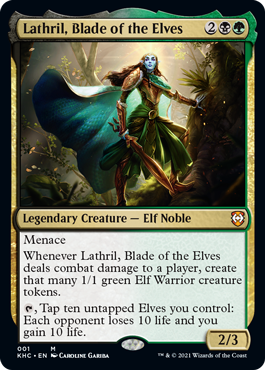
Lathril, Blade of the Elves
{2}{B}{G}
Legendary Creature — Elf Noble
2/3
Menace
Whenever Lathril, Blade of the Elves deals combat damage to a player, create that many 1/1 green Elf Warrior creature tokens.
{T}, Tap ten untapped Elves you control: Each opponent loses 10 life and you gain 10 life.
- You can tap any ten untapped Elves you control, including ones you haven't controlled continuously since the beginning of your most recent turn, to pay that part of the cost of Lathril's activated ability. You must have controlled Lathril continuously since the beginning of your most recent turn, however. Lathril doesn't count as one of the ten.
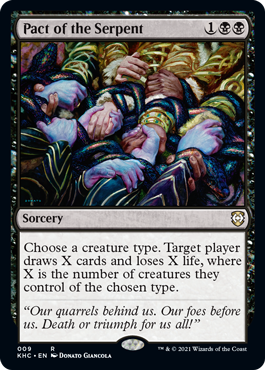
Pact of the Serpent
{1}{B}{B}
Sorcery
Choose a creature type. Target player draws X cards and loses X life, where X is the number of creatures they control of the chosen type.
- You choose the target player as you cast Pact of the Serpent, but you don't choose the creature type until the spell resolves.
- You must choose an existing creature type, such as Squirrel or Knight. You can't choose card types (e.g., artifact) or supertypes (e.g., snow).
- The value of X is based on the number of creatures the player controls of the chosen type as Pact of the Serpent resolves.
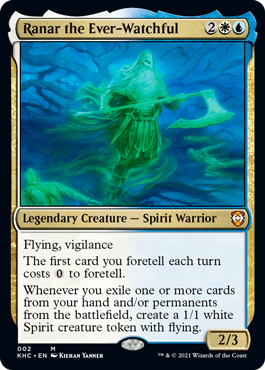
Ranar the Ever-Watchful
{2}{W}{U}
Legendary Creature — Spirit Warrior
2/3
Flying, vigilance
The first card you foretell each turn costs {0} to foretell.
Whenever you exile one or more cards from your hand and/or permanents from the battlefield, create a 1/1 white Spirit creature token with flying.
- "The first card you foretell" refers to the first one you exile from your hand as part of the foretell special action. It doesn't refer to a foretold spell you cast from exile.
- Ranar's triggered ability triggers only once for each time you exile cards from your hand and/or permanents from the battlefield, no matter how many objects were exiled at the same time.
- Exiling a token permanent will cause Ranar's triggered ability to trigger, as will exiling a permanent you don't control.
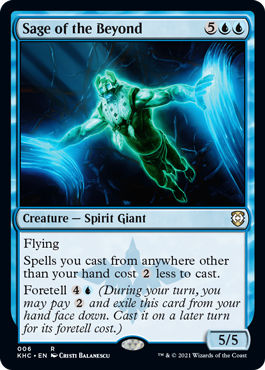
Sage of the Beyond
{5}{U}{U}
Creature — Spirit Giant
5/5
Flying
Spells you cast from anywhere other than your hand cost {2} less to cast.
Foretell {4}{U} (During your turn, you may pay {2} and exile this card from your hand face down. Cast it on a later turn for its foretell cost.)
- To determine the total cost of a spell, start with the mana cost or alternative cost you're paying, add any cost increases, then apply any cost reductions (such as that of Sage of the Beyond). The converted mana cost of the spell is determined only by its mana cost, no matter what the total cost to cast the spell was.
- The cost reduction applies only to generic mana in the costs of spells you cast from anywhere other than your hand. It can't reduce requirements of a specific color of mana.
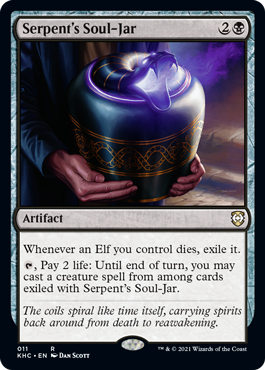
Serpent's Soul-Jar
{2}{B}
Artifact
Whenever an Elf you control dies, exile it.
{T}, Pay 2 life: Until end of turn, you may cast a creature spell from among cards exiled with Serpent's Soul-Jar.
- Players can respond to the triggered ability that exiles the card from your graveyard by removing it in some other way. If the card leaves the graveyard before the ability of Serpent's Soul-Jar exiles it, Serpent's Soul-Jar won't let you cast it.
- The activated ability doesn't change when you can cast the creature spell. In most cases, this means during your main phase while the stack is empty, although flash may change this.
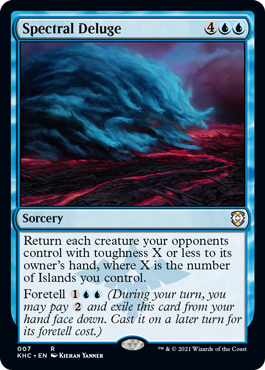
Spectral Deluge
{4}{U}{U}
Sorcery
Return each creature your opponents control with toughness X or less to its owner's hand, where X is the number of Islands you control.
Foretell {1}{U}{U} (During your turn, you may pay {2} and exile this card from your hand face down. Cast it on a later turn for its foretell cost.)
- Use the number of Islands you control as Spectral Deluge resolves to determine the value of X.
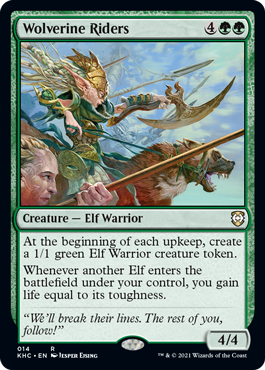
Wolverine Riders
{4}{G}{G}
Creature — Elf Warrior
4/4
At the beginning of each upkeep, create a 1/1 green Elf Warrior creature token.
Whenever another Elf enters the battlefield under your control, you gain life equal to its toughness.
- Use the toughness of the creature as the last ability resolves to determine how much life you gain. If the Elf is no longer on the battlefield at that time, use its toughness from when it was last on the battlefield.
Magic: The Gathering, Magic, Kaldheim, Zendikar, Throne of Eldraine, Theros, and Ikoria are trademarks of Wizards of the Coast LLC in the USA and other countries. ©2021 Wizards.

